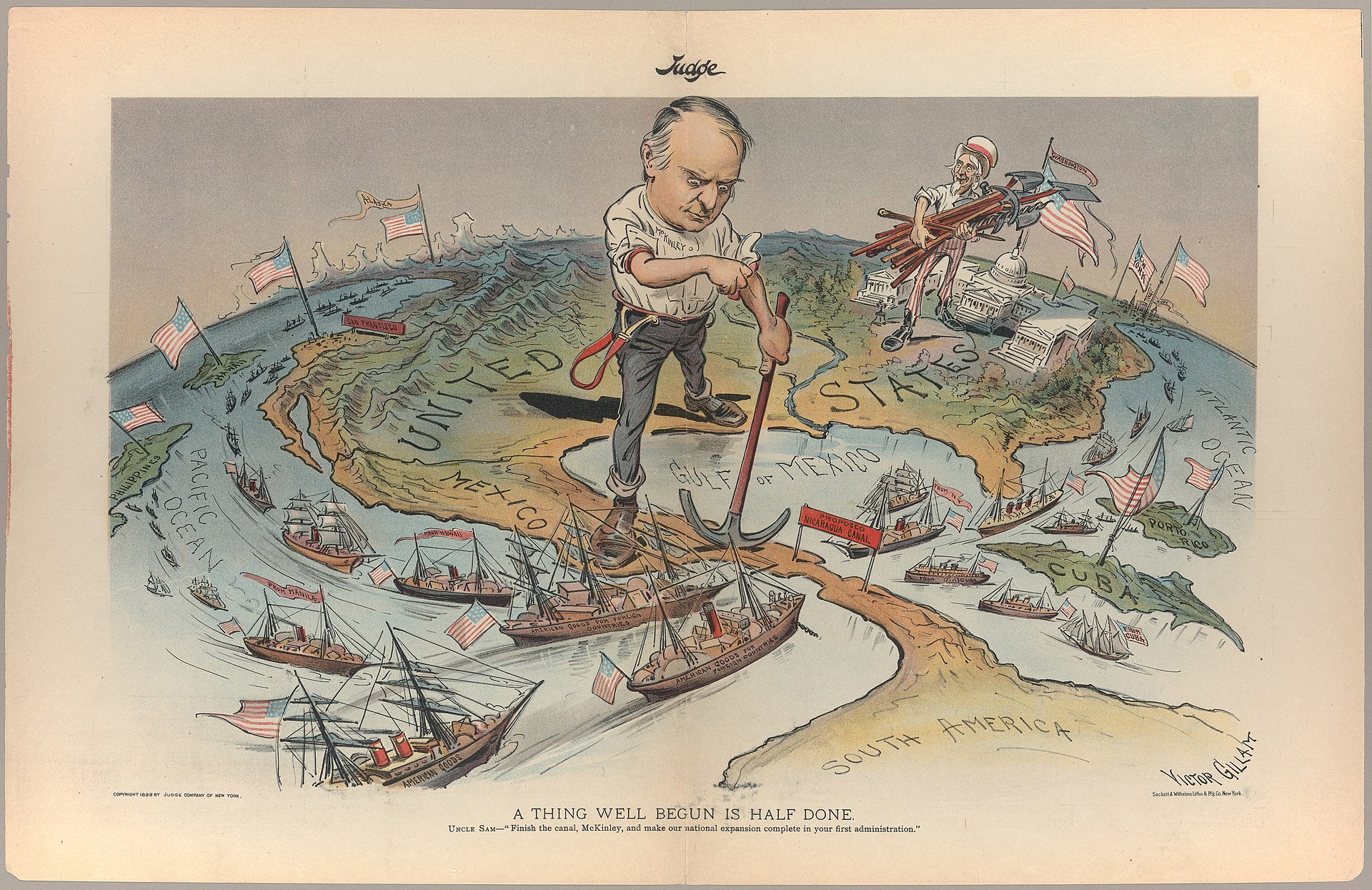
帝国主義
Imperialism

This
cartoon reflects the view of Judge magazine regarding America's
imperial ambitions following McKinley's quick victory in the
Spanish–American War of 1898.
☆帝国主義(Imperialism) とは、特に膨張主義を通じて、軍事力(軍事力および経済力)とソフトパワー(外交力および文化的帝国主義)の両方を用い、外国に対する支配力を維持または 拡大する行為、理論、または態度である。帝国主義は、覇権の確立または維持、およびある程度は形式的な帝国の確立に重点を置いている。 帝国主義は、植民地主義の概念と関連しているが、他の形態の拡張や多くの形態の政府にも適用できる、明確に区別される概念である。
★またエドワード・サイードによると、帝国主義とは「遠く離れた地域を支配する支配的中核都市の支配の実践、理論、態度」である(→「文化と帝国主義」)
☆またシステムとしての帝国主義は、植民地主義よりも統一された組織形態であり、世界の文明化計画を担うという自己規定をしているために、(経験主義的カテゴリーが強い)植民地主義とは一線を画す。そのため、帝国主義は、官僚組織、テクノロジー、および管理体制(→「統治性」)に特徴づけられる。
★帝国 主義とは、特に膨張主義を通じて、軍事力(軍事力および経済力)とソフトパワー(外交力および文化的帝国主義)の両方を用い、外国に対する支配力を維持ま たは拡大する行為、理論、または態度である。帝国主義は、覇権の確立または維持、およびある程度は形式的な帝国の確立に重点を置いている。帝国主義は、植民地主義の概念と関連しているが、他の形態の拡張や多くの形態の政府にも適用できる、明確に区別される概念である。
| Imperialism
is the practice, theory or attitude of maintaining or extending power
over foreign nations, particularly through expansionism, employing both
hard power (military and economic power) and soft power (diplomatic
power and cultural imperialism). Imperialism focuses on establishing or
maintaining hegemony and a more or less formal empire.[2][3][4] While
related to the concepts of colonialism, imperialism is a distinct
concept that can apply to other forms of expansion and many forms of
government.[5] |
帝国
主義とは、特に膨張主義を通じて、軍事力(軍事力および経済力)とソフトパワー(外交力および文化的帝国主義)の両方を用い、外国に対する支配力を維持ま
たは拡大する行為、理論、または態度である。帝国主義は、覇権の確立または維持、およびある程度は形式的な帝国の確立に重点を置いている。[2][3]
[4] 帝国主義は、植民地主義の概念と関連しているが、他の形態の拡張や多くの形態の政府にも適用できる、明確に区別される概念である。[5] |
| Etymology and usage The word imperialism originated from the Latin word imperium,[6] which means "to command", "to be sovereign", or simply "to rule".[7] The word “imperialism” was first produced in the 19th century to decry Napoleon III's despotic militarism and his attempts at obtaining political support through foreign military interventions.[8][9] The term became common in the current sense in Great Britain during the 1870s; by the 1880's it was used with a positive connotation.[10] By the end of the 19th century it was being used to describe the behavior of empires at all times and places.[11] Hannah Arendt and Joseph Schumpeter defined imperialism as expansion for the sake of expansion.[12] The term was and is mainly applied to Western and Japanese political and economic dominance, especially in Asia and Africa, in the 19th and 20th centuries. Its precise meaning continues to be debated by scholars. Some writers, such as Edward Said, use the term more broadly to describe any system of domination and subordination organized around an imperial core and a periphery.[13] This definition encompasses both nominal empires and neocolonialism. |
語源と用法 帝国主義という語はラテン語のimperiumに由来し、[6]「命令する」、「主権を持つ」、または単に「支配する」という意味である。[7] 「帝国主義」という語は、19世紀にナポレオン3世の専制的な軍国主義と、外国への軍事介入による政治的支持の獲得を非難するために初めて使用された。 [8][9] この用語は、 1870年代には英国で一般的な意味となり、1880年代には肯定的な意味合いで使われるようになった。[10] 19世紀末には、あらゆる時代や場所における帝国の行動を表現する言葉として使われるようになった。[11] ハンナ・アレントとヨーゼフ・シュンペーターは、帝国主義を拡大のための拡大と定義した。[12] この用語は、19世紀から20世紀にかけて、主に西洋と日本の政治的・経済的支配、特にアジアとアフリカにおけるものに対して用いられてきた。その正確な 意味については、学者の間で議論が続いている。エドワード・サイードなどの作家は、帝国の中核と周辺を軸に組織された支配と従属のあらゆる体制をより広く 説明する用語として使用している。[13] この定義は名目上の帝国と新植民地主義の両方を包含している。 |
Versus colonialism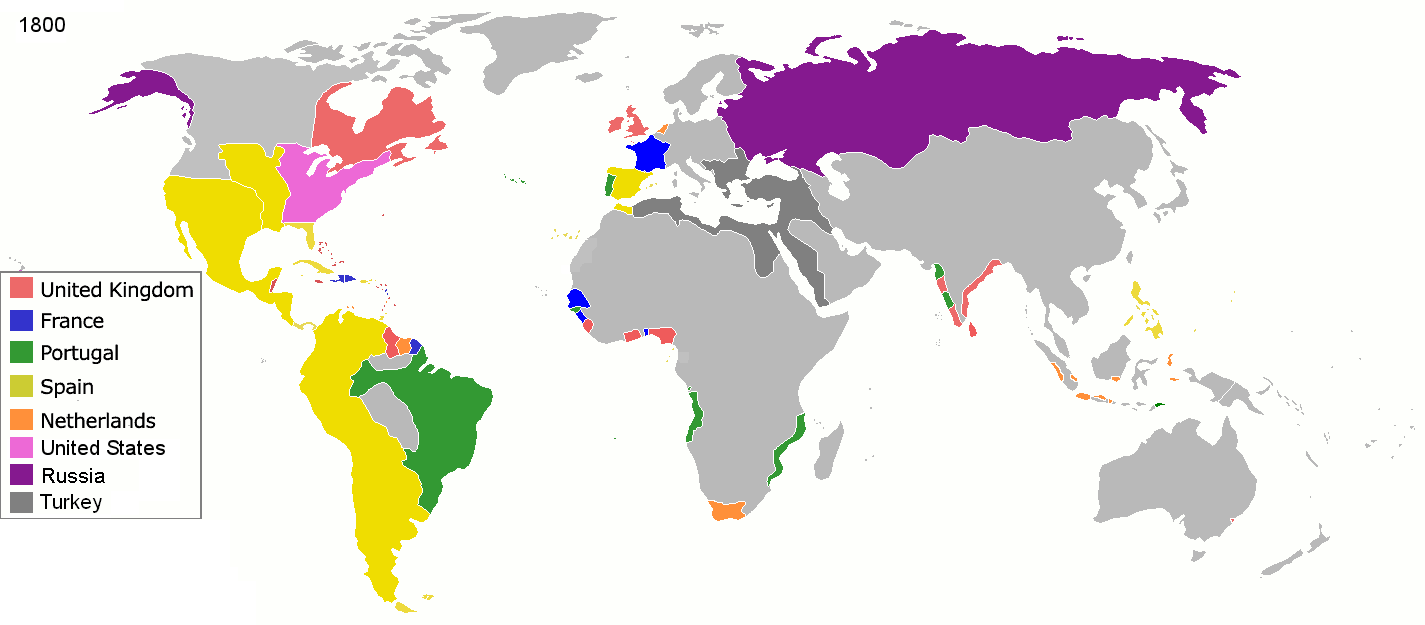 Imperial powers in 1800[14] 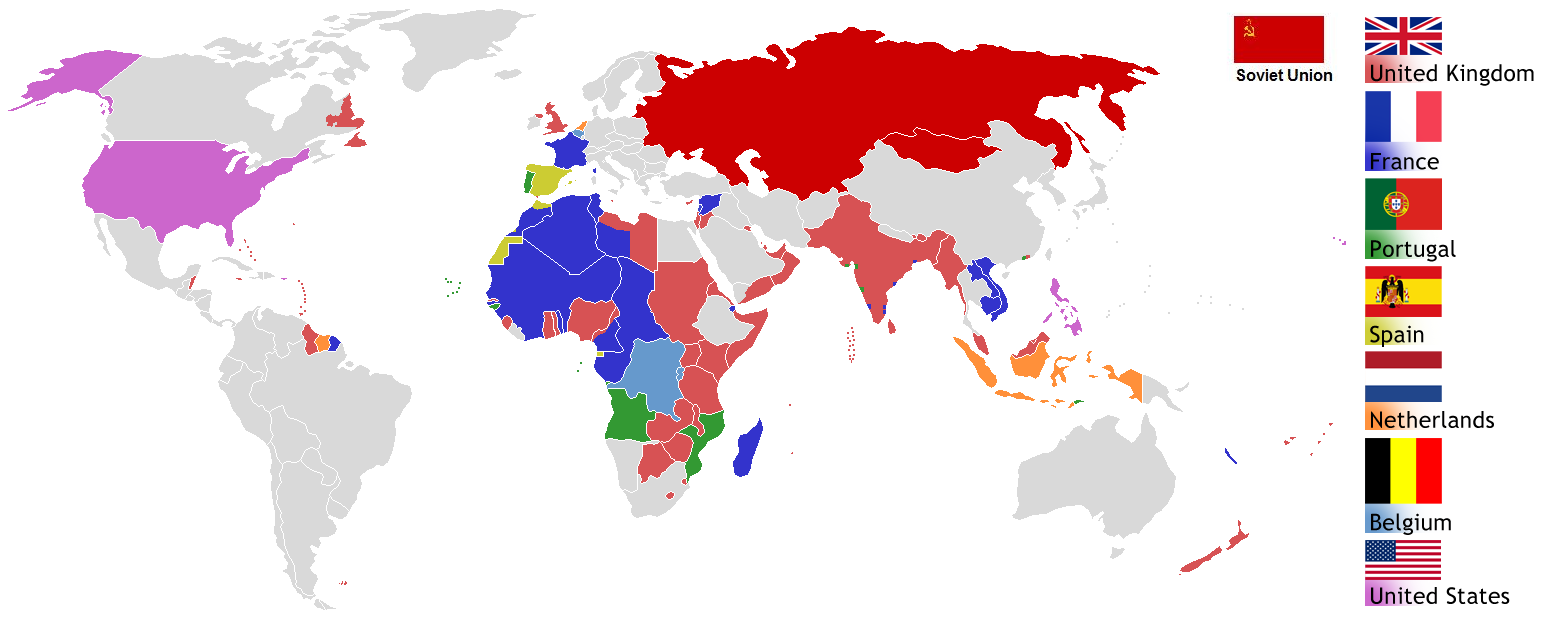 Imperial powers in 1945 The term "imperialism" is often conflated with "colonialism"; however, many scholars have argued that each has its own distinct definition. Imperialism and colonialism have been used in order to describe one's influence upon a person or group of people. Robert Young writes that imperialism operates from the centre as a state policy and is developed for ideological as well as financial reasons, while colonialism is simply the development for settlement or commercial intentions; however, colonialism still includes invasion.[15] Colonialism in modern usage also tends to imply a degree of geographic separation between the colony and the imperial power. Particularly, Edward Said distinguishes between imperialism and colonialism by stating: "imperialism involved 'the practice, the theory and the attitudes of a dominating metropolitan center ruling a distant territory', while colonialism refers to the 'implanting of settlements on a distant territory.'[16] Contiguous land empires such as the Russian, Chinese or Ottoman have traditionally been excluded from discussions of colonialism, though this is beginning to change, since it is accepted that they also sent populations into the territories they ruled.[16]: 116 Imperialism and colonialism both dictate the political and economic advantage over a land and the indigenous populations they control, yet scholars sometimes find it difficult to illustrate the difference between the two.[17]: 107 Although imperialism and colonialism focus on the suppression of another, if colonialism refers to the process of a country taking physical control of another, imperialism refers to the political and monetary dominance, either formally or informally. Colonialism is seen to be the architect deciding how to start dominating areas and then imperialism can be seen as creating the idea behind conquest cooperating with colonialism. Colonialism is when the imperial nation begins a conquest over an area and then eventually is able to rule over the areas the previous nation had controlled. Colonialism's core meaning is the exploitation of the valuable assets and supplies of the nation that was conquered and the conquering nation then gaining the benefits from the spoils of the war.[17]: 170–75 The meaning of imperialism is to create an empire, by conquering the other state's lands and therefore increasing its own dominance. Colonialism is the builder and preserver of the colonial possessions in an area by a population coming from a foreign region.[17]: 173–76 Colonialism can completely change the existing social structure, physical structure, and economics of an area; it is not unusual that the characteristics of the conquering peoples are inherited by the conquered indigenous populations.[17]: 41 Few colonies remain remote from their mother country. Thus, most will eventually establish a separate nationality or remain under complete control of their mother colony.[18] The Soviet leader Vladimir Lenin suggested that "imperialism was the highest form of capitalism", claiming that "imperialism developed after colonialism, and was distinguished from colonialism by monopoly capitalism".[16]: 116 |
植民地主義に対する概念として 1800年の帝国主義諸国[14]  1945年の帝国主義諸国 「帝国主義」という用語は「植民地主義」と混同されることが多いが、多くの学者はそれぞれに独自の定義があることを主張している。帝国主義と植民地主義 は、個人または集団に対する影響力を説明する際に用いられてきた。ロバート・ヤングは、帝国主義は国家政策として中心から展開され、イデオロギー的および 財政的理由から発展するが、植民地主義は単に定住や商業目的のための開発であると記している。しかし、植民地主義には依然として侵略が含まれる。[15] 現代の用法における植民地主義は、植民地と帝国との間に地理的な隔たりがあることを暗示する傾向がある。特に、エドワード・サイードは次のように述べ、帝 国主義と植民地主義を区別している。「帝国主義は『遠く離れた領土を支配する大都市の中心部の支配の実践、理論、態度』を意味するが、植民地主義は『遠く 離れた領土への入植』を意味する」と述べている。[16] ロシア、中国、オスマン帝国などの陸続きの土地帝国は、伝統的に植民地主義の議論から除外されてきたが、支配下に人口を送り込んでいたことが認められるよ うになったため、この状況は変わり始めている。[16]: 116 帝国主義と植民地主義はどちらも、支配する土地と土着の住民に対して政治的・経済的な優位性を求めるものであるが、学者たちは両者の違いを説明することが 難しいと感じている。[17]: 107 帝国主義と植民地主義はどちらも他者の抑圧に重点を置いているが、植民地主義が他国が他国を物理的に支配する過程を指すのに対し、帝国主義は公式・非公式 を問わず、政治的・経済的な支配を指す。植民地主義は、ある地域を支配し始める方法を決定する建築家と見なすことができ、帝国主義は植民地主義と協力して 征服のアイデアを生み出すものと見なすことができる。植民地主義とは、帝国国家が地域に対する征服を開始し、最終的に以前の国家が支配していた地域を支配 下に置くことを指す。植民地主義の核心的な意味は、征服された国家の貴重な資産や物資を搾取することであり、征服国は戦利品から利益を得る。[17]: 170–75 帝国主義の意味は、他国の領土を征服することで帝国を築き、自国の支配力を高めることである。植民地主義とは、外国から来た人々による、ある地域における 植民地の建設と維持である。[17]: 173–76 植民地主義は、その地域の既存の社会構造、物理的構造、経済を完全に変えることができる。征服した先住民が征服者の特徴を受け継ぐことは珍しくない。 [17]: 41 植民地が本国から遠く離れたまま残ることはほとんどない。したがって、ほとんどの植民地は最終的に独自の国籍を確立するか、あるいは母国である植民地から の完全な支配下に置かれることになる。[18] ソビエト連邦の指導者ウラジーミル・レーニンは、「帝国主義は資本主義の最高形態である」と示唆し、「帝国主義は植民地主義の後に発展し、独占資本主義によって植民地主義と区別される」と主張した。[16]:116 |
| Age of Imperialism "Imperial Age" redirects here. For the symphonic metal band, see Imperial Age (band). Main articles: International relations (1648–1814), International relations (1814–1919), and New Imperialism The Age of Imperialism, a time period beginning around 1760, saw European industrializing nations, engaging in the process of colonizing, influencing, and annexing other parts of the world.[19] 19th century episodes included the "Scramble for Africa."[20] 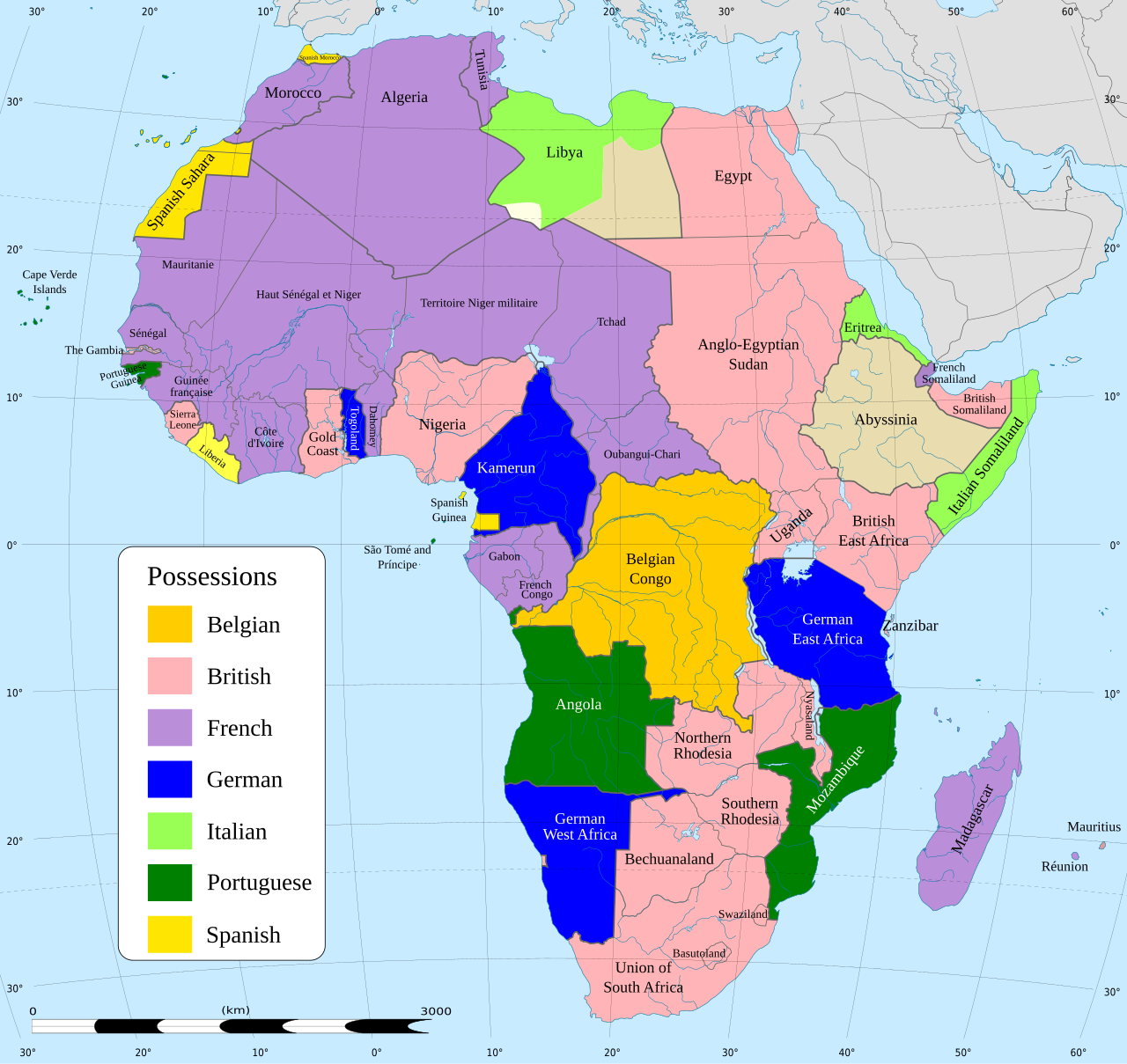 Africa, divided into colonies under multiple European empires, c. 1914 In the 1970s British historians John Gallagher (1919–1980) and Ronald Robinson (1920–1999) argued that European leaders rejected the notion that "imperialism" required formal, legal control by one government over a colonial region. Much more important was informal control of independent areas.[21] According to Wm. Roger Louis, "In their view, historians have been mesmerized by formal empire and maps of the world with regions colored red. The bulk of British emigration, trade, and capital went to areas outside the formal British Empire. Key to their thinking is the idea of empire 'informally if possible and formally if necessary.'"[22] Oron Hale says that Gallagher and Robinson looked at the British involvement in Africa where they "found few capitalists, less capital, and not much pressure from the alleged traditional promoters of colonial expansion. Cabinet decisions to annex or not to annex were made, usually on the basis of political or geopolitical considerations."[23]: 6 Looking at the main empires from 1875 to 1914, there was a mixed record in terms of profitability. At first, planners expected that colonies would provide an excellent captive market for manufactured items. Apart from the Indian subcontinent, this was seldom true. By the 1890s, imperialists saw the economic benefit primarily in the production of inexpensive raw materials to feed the domestic manufacturing sector. Overall, Great Britain did very well in terms of profits from India, especially Mughal Bengal, but not from most of the rest of its empire. According to Indian Economist Utsa Patnaik, the scale of the wealth transfer out of India, between 1765 and 1938, was an estimated $45 Trillion.[24] The Netherlands did very well in the East Indies. Germany and Italy got very little trade or raw materials from their empires. France did slightly better. The Belgian Congo was notoriously profitable when it was a capitalistic rubber plantation owned and operated by King Leopold II as a private enterprise. However, scandal after scandal regarding atrocities in the Congo Free State led the international community to force the government of Belgium to take it over in 1908, and it became much less profitable. The Philippines cost the United States much more than expected because of military action against rebels.[23]: 7–10 Because of the resources made available by imperialism, the world's economy grew significantly and became much more interconnected in the decades before World War I, making the many imperial powers rich and prosperous.[25] Europe's expansion into territorial imperialism was largely focused on economic growth by collecting resources from colonies, in combination with assuming political control by military and political means. The colonization of India in the mid-18th century offers an example of this focus: there, the "British exploited the political weakness of the Mughal state, and, while military activity was important at various times, the economic and administrative incorporation of local elites was also of crucial significance" for the establishment of control over the subcontinent's resources, markets, and manpower.[26] Although a substantial number of colonies had been designed to provide economic profit and to ship resources to home ports in the 17th and 18th centuries, D. K. Fieldhouse suggests that in the 19th and 20th centuries in places such as Africa and Asia, this idea is not necessarily valid:[27] Modern empires were not artificially constructed economic machines. The second expansion of Europe was a complex historical process in which political, social and emotional forces in Europe and on the periphery were more influential than calculated imperialism. Individual colonies might serve an economic purpose; collectively no empire had any definable function, economic or otherwise. Empires represented only a particular phase in the ever-changing relationship of Europe with the rest of the world: analogies with industrial systems or investment in real estate were simply misleading.[17]: 184 During this time, European merchants had the ability to "roam the high seas and appropriate surpluses from around the world (sometimes peaceably, sometimes violently) and to concentrate them in Europe".[28] 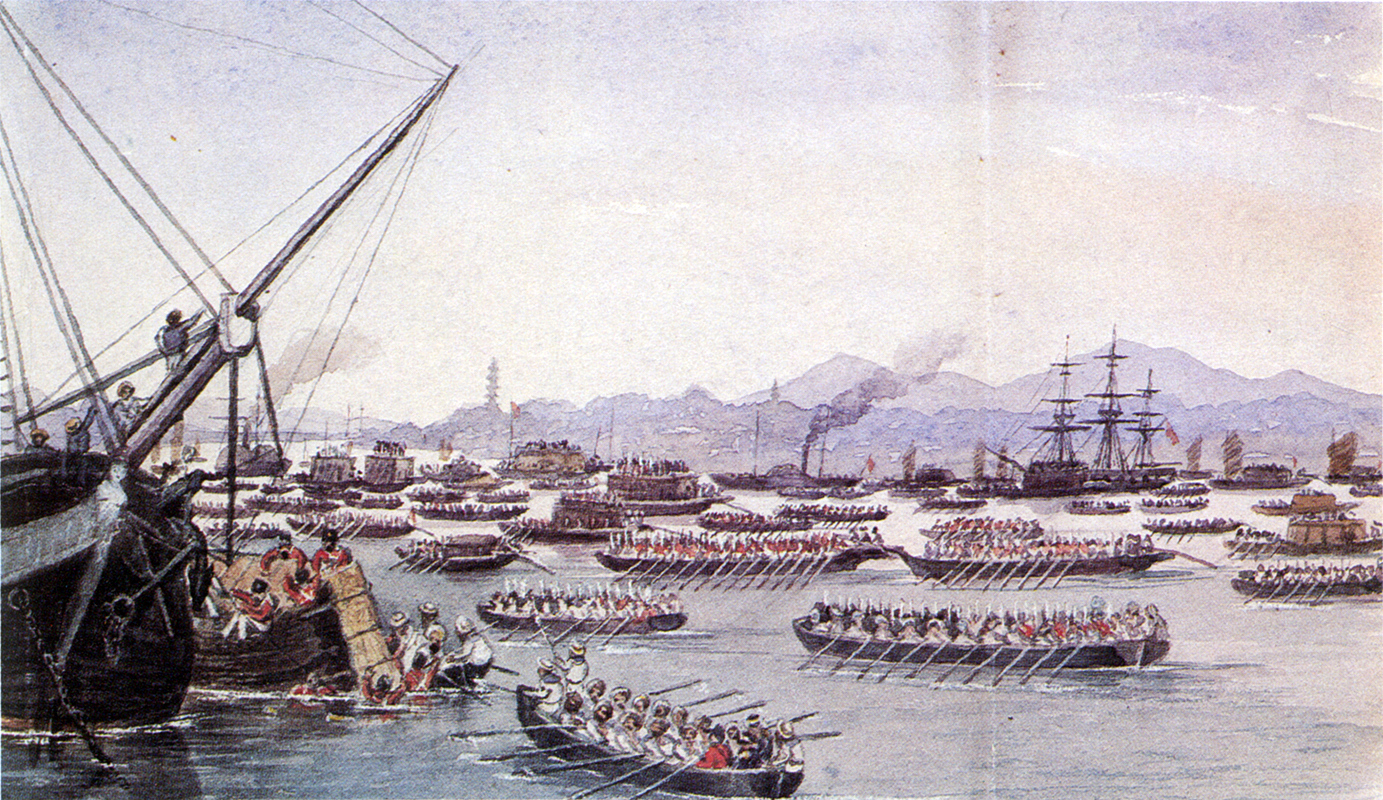 British assault on Canton during the First Opium War, May 1841 European expansion greatly accelerated in the 19th century. To obtain raw materials, Europe expanded imports from other countries and from the colonies. European industrialists sought raw materials such as dyes, cotton, vegetable oils, and metal ores from overseas. Concurrently, industrialization was quickly making Europe the centre of manufacturing and economic growth, driving resource needs.[29] Communication became much more advanced during European expansion. With the invention of railroads and telegraphs, it became easier to communicate with other countries and to extend the administrative control of a home nation over its colonies. Steam railroads and steam-driven ocean shipping made possible the fast, cheap transport of massive amounts of goods to and from colonies.[29] Along with advancements in communication, Europe also continued to advance in military technology. European chemists made new explosives that made artillery much more deadly. By the 1880s, the machine gun had become a reliable battlefield weapon. This technology gave European armies an advantage over their opponents, as armies in less-developed countries were still fighting with arrows, swords, and leather shields (e.g. the Zulus in Southern Africa during the Anglo-Zulu War of 1879).[29] Some exceptions of armies that managed to get nearly on par with the European expeditions and standards include the Ethiopian armies at the Battle of Adwa, and the Japanese Imperial Army of Japan, but these still relied heavily on weapons imported from Europe and often on European military advisors.  This cartoon reflects the view of Judge magazine regarding America's imperial ambitions following McKinley's quick victory in the Spanish–American War of 1898. |
帝国主義時代 「帝国時代」は、こちらを参照。シンフォニック・メタルバンドについては、Imperial Age (バンド)を参照。 主な記事:国際関係(1648年~1814年)、国際関係(1814年~1919年)、新帝国主義 帝国主義時代(The Age of Imperialism)は、1760年頃に始まった時代区分であり、ヨーロッパの工業化国家が、世界の他の地域を植民地化、影響下に置き、併合する過程 にあった時代である。[19] 19世紀の出来事としては、「アフリカの争奪戦」がある。[20]  複数のヨーロッパ帝国の植民地に分割されたアフリカ、1914年頃 1970年代に、イギリスの歴史家ジョン・ギャラガー(1919年 - 1980年)とロナルド・ロビンソン(1920年 - 1999年)は、ヨーロッパの指導者たちは「帝国主義」が植民地地域に対する単一政府による正式な法的支配を必要とするという考えを拒絶したと主張した。 それよりも重要なのは、独立地域の非公式な支配であった。[21] ウィリアム・ロジャー・ルイスによると、「彼らの見解では、歴史家たちは形式的な帝国と、地域が赤で塗り分けられた世界地図に魅了されてきた。英国の移 民、貿易、資本の大部分は、形式的な大英帝国の外の地域へと流れていった。彼らの考え方の鍵となるのは、帝国という概念であり、それは「可能であれば非公 式に、必要であれば公式に」という考え方である。[22] オロン・ヘイルは、ギャラガーとロビンソンがアフリカにおける英国の関与を調査したところ、「資本家はほとんどおらず、資本も少なく、植民地拡大の伝統的 推進者とされる人々からの圧力もあまりなかった」と述べている。 併合するか併合しないかの閣議決定は、通常、政治的または地政学的な考慮に基づいて行われた。[23]:6 1875年から1914年までの主な帝国を概観すると、収益性に関しては、さまざまな結果が見られた。当初、植民地は製造品目のための優れた国内市場を提 供すると計画者は期待していた。インド亜大陸を除いては、これはほとんど当てはまらなかった。1890年代には帝国主義者たちは、国内の製造業部門に供給 する安価な原材料の生産に主に経済的利益を見出していた。全体として、インド、特にムガル帝国時代のベンガル地方から英国が得た利益は非常に大きかった が、その他の帝国の大半からはそうではなかった。インドの経済学者ウタ・パトナイク氏によると、1765年から1938年の間にインドから国外へ移転した 富の規模は、推定45兆ドルに上るという。[24] オランダは東インド諸島で大きな利益を得た。ドイツとイタリアは、自国の帝国からほとんど貿易や原材料を得ることができなかった。フランスは、それよりは 少し良かった。ベルギー領コンゴは、レオポルド2世が私有企業として所有・運営していた資本主義的なゴム農園として、非常に利益を上げていたことで悪名高 かった。しかし、コンゴ自由国における残虐行為に関するスキャンダルが次々と明るみに出たため、国際社会は1908年にベルギー政府に同国を接収させるよ う迫り、その結果、利益は大幅に減少した。フィリピンは、反乱軍に対する軍事行動により、米国が予想していた以上の負担となった。[23]:7-10 帝国主義によって利用可能となった資源により、第一次世界大戦前の数十年間、世界の経済は著しく成長し、相互の結びつきも強まった。その結果、多くの帝国主義国は豊かになり繁栄した。[25] ヨーロッパの領土帝国主義への拡大は、植民地から資源を集めることによる経済成長に主眼が置かれており、軍事的・政治的手段による政治的支配を伴うもので あった。18世紀半ばのインド植民地化は、この傾向の好例である。「英国はムガール帝国の政治的弱みを巧みに利用し、軍事活動が重要な役割を果たした時期 もあったが、経済的・行政的に現地のエリート層を取り込むことも、亜大陸の資源、市場、労働力に対する支配を確立する上で決定的に重要な意味を持ってい た」のである。。17世紀と18世紀には、かなりの数の植民地が経済的利益の確保と本国への資源の輸送を目的として設計されていたが、D. K. Fieldhouseは、19世紀と20世紀のアフリカやアジアなどの地域では、この考え方は必ずしも妥当ではないと指摘している。 近代の帝国は、人為的に構築された経済的な機械ではなかった。ヨーロッパの第二次拡大は、ヨーロッパとその周辺地域における政治的、社会的、感情的な力 が、計算された帝国主義よりも大きな影響力を持っていた複雑な歴史的過程であった。個々の植民地は経済的目的を果たしていたかもしれないが、全体として帝 国には経済的にもその他の面でも明確な機能はなかった。帝国は、ヨーロッパとそれ以外の地域との絶え間なく変化する関係における特定の段階に過ぎなかっ た。産業システムや不動産投資との類似は、単に誤解を招くだけである。 この時代、ヨーロッパの商人たちは「公海を航海し、世界中の余剰物資を(時には平和的に、時には暴力的に)入手し、それをヨーロッパに集中させる」能力を有していた。[28]  1841年5月、第一次アヘン戦争中の英国による広州への攻撃 19世紀にはヨーロッパの拡大が大幅に加速した。原材料を確保するために、ヨーロッパは他国および植民地からの輸入を拡大した。ヨーロッパの産業家たち は、染料、綿、植物油、金属鉱石などの原材料を海外から求めた。同時に、工業化が急速にヨーロッパを製造および経済成長の中心地とし、資源需要を押し上げ た。 ヨーロッパの拡大に伴い、通信手段は格段に進歩した。鉄道や電信の発明により、他国との通信が容易になり、本国が植民地に対して行政上の支配を拡大することが可能になった。蒸気鉄道や蒸気船により、植民地との間で大量の商品を迅速かつ安価に輸送することが可能になった。 通信手段の進歩と並行して、ヨーロッパでは軍事技術も進歩を続けた。ヨーロッパの化学者たちは、大砲の威力を飛躍的に高める新たな爆薬を開発した。 1880年代には、機関銃が信頼性の高い戦場兵器となっていた。この技術により、ヨーロッパの軍隊は他国に対して優位に立つこととなった。なぜなら、発展 途上国の軍隊は、いまだに矢や剣、革の盾で戦っていたからである(例えば、1879年のイギリス・ズールー戦争における南アフリカのズールー族など)。 [2 9] 例外的にヨーロッパの遠征軍とほぼ同等の水準に達していた軍隊としては、アドワの戦いのエチオピア軍や日本の帝国陸軍などが挙げられるが、これらの軍隊も 依然としてヨーロッパから輸入した武器に大きく依存しており、ヨーロッパの軍事顧問の支援を受けていた。  この漫画は、1898年の米西戦争におけるマッキンリーの大勝利を受けて、アメリカの帝国主義的野望について『Judge』誌の見解を反映したものである。 |
| Theories of imperialism Main article: Theories of imperialism Anglophone academic studies often base their theories regarding imperialism on the British experience of Empire. The term imperialism was originally introduced into English in its present sense in the late 1870s by opponents of the allegedly aggressive and ostentatious imperial policies of British Prime Minister Benjamin Disraeli. Supporters of "imperialism" such as Joseph Chamberlain quickly appropriated the concept. For some, imperialism designated a policy of idealism and philanthropy; others alleged that it was characterized by political self-interest, and a growing number associated it with capitalist greed. Historians and political theorists have long debated the correlation between capitalism, class and imperialism. Much of the debate was pioneered by such theorists as John A. Hobson (1858–1940), Joseph Schumpeter (1883–1950), Thorstein Veblen (1857–1929), and Norman Angell (1872–1967). While these non-Marxist writers were at their most prolific before World War I, they remained active in the interwar years. Their combined work informed the study of imperialism and its impact on Europe, as well as contributing to reflections on the rise of the military-political complex in the United States from the 1950s. In Imperialism: A Study (1902), Hobson developed a highly influential interpretation of imperialism that expanded on his belief that free enterprise capitalism had a negative impact on the majority of the population. In Imperialism he argued that the financing of overseas empires drained money that was needed at home. It was invested abroad because of lower wages paid to the workers overseas made for higher profits and higher rates of return, compared to domestic wages. So although domestic wages remained higher, they did not grow nearly as fast as they might have otherwise. Exporting capital, he concluded, put a lid on the growth of domestic wages in the domestic standard of living. Hobson theorized that domestic social reforms could cure the international disease of imperialism by removing its economic foundation, while state intervention through taxation could boost broader consumption, create wealth, and encourage a peaceful, tolerant, multipolar world order.[31][32] By the 1970s, historians such as David K. Fieldhouse[33] and Oron Hale could argue that "the Hobsonian foundation has been almost completely demolished."[23]: 5–6 It was not businessmen and bankers but politicians who went with the stream of the masses. The modern imperialism was primarily a political product caused by the national mass hysteria rather than by the much-abused capitalists.[34] The British experience failed to support it. Similarly, American Historian David Landes claims that businessmen were less enthusiastic about colonialism than statesmen and adventurers.[35] However, European Marxists picked up Hobson's ideas wholeheartedly and made it into their own theory of imperialism, most notably in Vladimir Lenin's Imperialism, the Highest Stage of Capitalism (1916). Lenin portrayed imperialism as the closure of the world market and the end of capitalist free-competition that arose from the need for capitalist economies to constantly expand investment, material resources and manpower in such a way that necessitated colonial expansion. Later Marxist theoreticians echo this conception of imperialism as a structural feature of capitalism, which explained the World War as the battle between imperialists for control of external markets. Lenin's treatise became a standard textbook that flourished until the collapse of communism in 1989–91.[36] 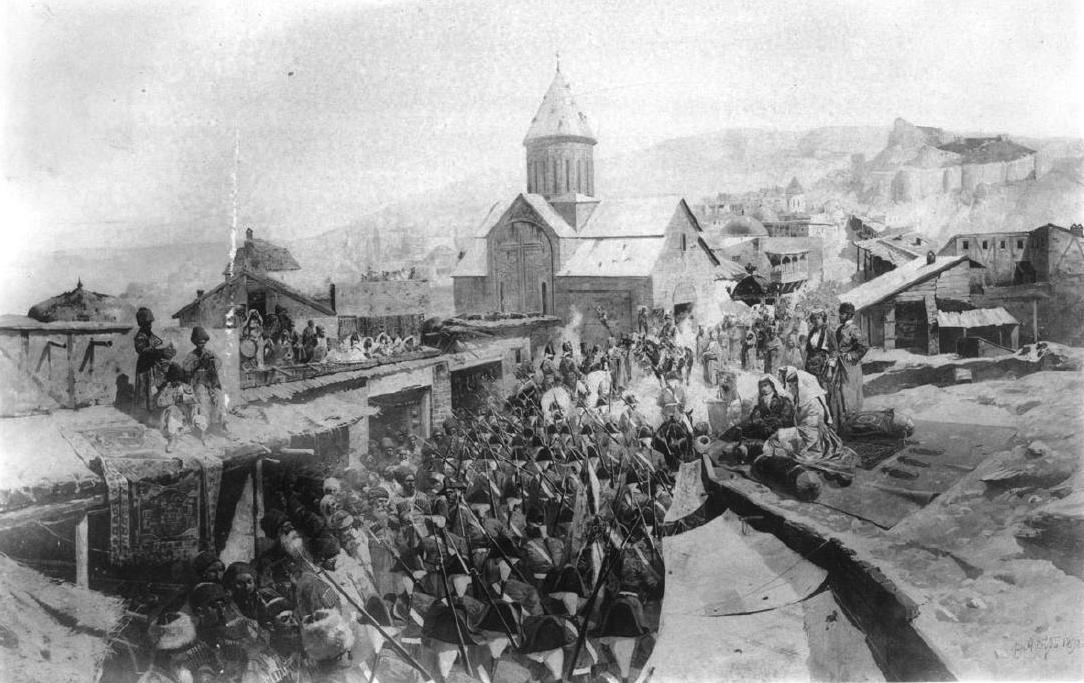 Entrance of the Russian troops in Tiflis, 26 November 1799, by Franz Roubaud, 1886 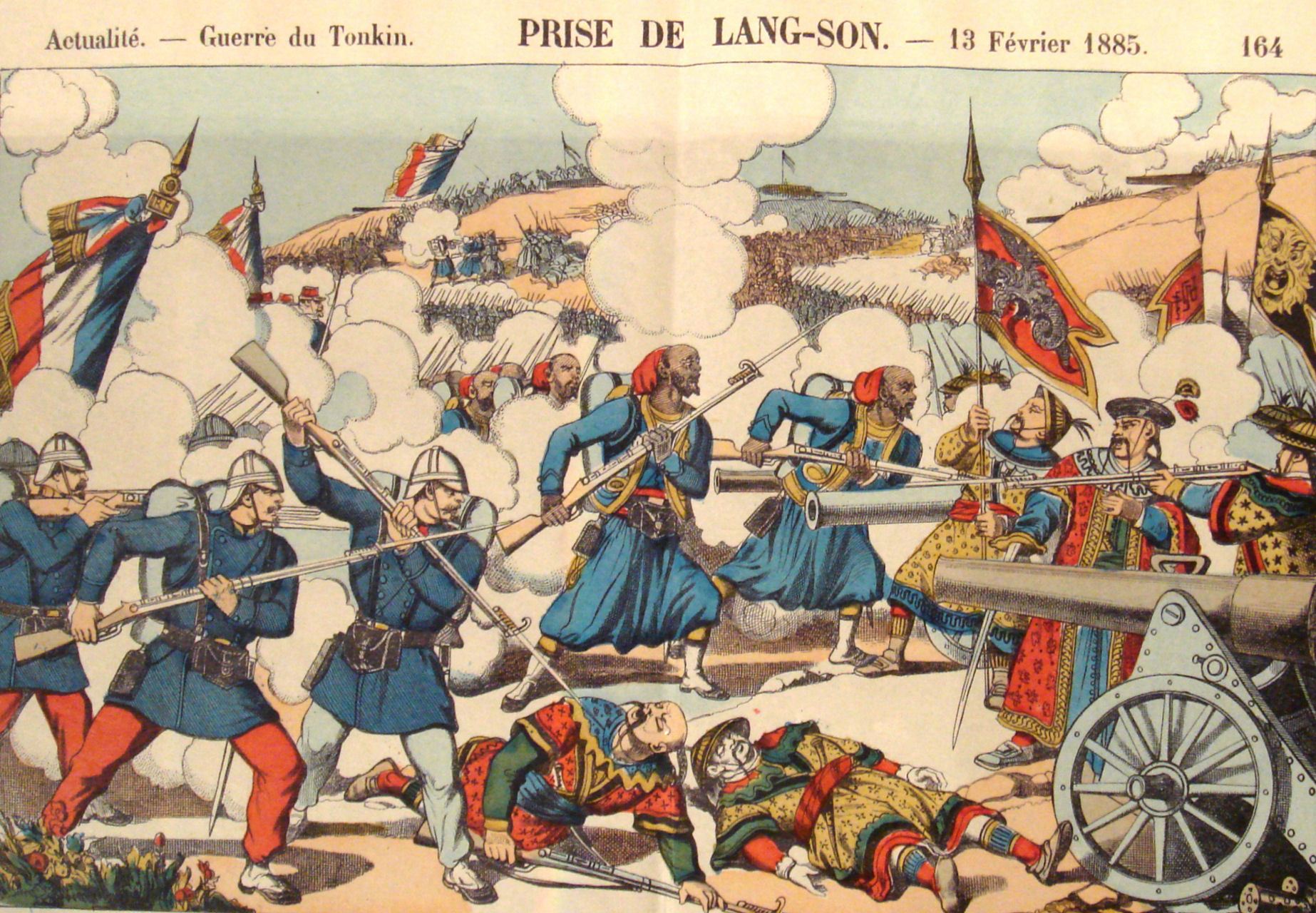 The capture of Lạng Sơn during the French conquest of Vietnam in 1885 Some theoreticians on the non-Communist left have emphasized the structural or systemic character of "imperialism". Such writers have expanded the period associated with the term so that it now designates neither a policy, nor a short space of decades in the late 19th century, but a world system extending over a period of centuries, often going back to Colonization and, in some accounts, to the Crusades. As the application of the term has expanded, its meaning has shifted along five distinct but often parallel axes: the moral, the economic, the systemic, the cultural, and the temporal. Those changes reflect—among other shifts in sensibility—a growing unease, even great distaste, with the pervasiveness of such power, specifically, Western power.[37][33] Walter Rodney, in his 1972 How Europe Underdeveloped Africa, proposes the idea that imperialism is a phase of capitalism "in which Western European capitalist countries, the US, and Japan established political, economic, military and cultural hegemony over other parts of the world which were initially at a lower level and therefore could not resist domination."[38] As a result, Imperialism "for many years embraced the whole world – one part being the exploiters and the other the exploited, one part being dominated and the other acting as overlords, one part making policy and the other being dependent."[38] Imperialism has also been identified in newer phenomena like space development and its governing context.[39] |
帝国主義論 詳細は「帝国主義論」を参照 英語圏の学術研究では、帝国主義に関する理論はしばしば大英帝国の経験に基づいて論じられる。帝国主義という用語は、1870年代後半に、当時の英国首相 ベンジャミン・ディズレーリの攻撃的で派手な帝国政策の反対派によって、現在の意味で英語に導入された。ジョゼフ・チェンバレンのような「帝国主義」の支 持者たちは、この概念をすぐに利用した。ある人々にとっては、帝国主義とは理想主義と博愛主義の政策を意味し、またある人々は、それは政治的な自己利益に よって特徴づけられると主張し、さらに、資本主義の強欲と関連付ける人々も増えていった。 歴史家や政治理論家たちは、資本主義、階級、帝国主義の相関関係について長い間議論を交わしてきた。その議論の多くは、ジョン・A・ホブソン (1858~1940)、ジョセフ・シュンペーター(1883~1950)、トールステイン・ヴェブレン(1857~1929)、ノーマン・アンジェル (1872~1967)といった理論家たちによって先導された。これらの非マルクス主義の著述家たちは、第一次世界大戦前に最も多くの著作を残したが、戦 間期にも活動を続けた。彼らの著作は、帝国主義の研究やヨーロッパへの影響についての情報源となったほか、1950年代以降の米国における軍事政治複合体 の台頭に関する考察にも貢献した。 ホブソンは著書『帝国主義論』(1902年)において、自由企業資本主義が国民の大多数に悪影響を及ぼすという自身の信念をさらに発展させた、非常に影響 力のある帝国主義の解釈を展開した。『帝国主義論』の中で、ホブソンは海外帝国の資金調達が国内で必要とされる資金を流出させていると論じた。海外で労働 者に支払われる賃金が国内よりも低いため、海外に投資されるのだ。そのため、国内の賃金は依然として高かったものの、それ以外の状況であれば考えられるほ どには急速に上昇することはなかった。ホブソンは、資本の輸出は国内の賃金と国内の生活水準の成長を抑制すると結論付けた。ホブソンは、国内の社会改革は 帝国主義の経済的基盤を除去することで、国際的な病である帝国主義を治癒できると理論化した。また、課税による国家の介入は、より幅広い消費を促進し、富 を生み出し、平和的で寛容な多極的世界秩序を奨励できると主張した。 1970年代までに、デイヴィッド・K・フィールドハウス(David K. Fieldhouse)[33]やオロン・ヘイル(Oron Hale)などの歴史家は、「ホブソン的な基盤はほぼ完全に崩壊した」と主張できるようになった。[23]:5–6 民衆の流れに従ったのは実業家や銀行家ではなく、政治家であった。近代帝国主義は、悪用され続けた資本家たちよりも、むしろ国家の集団ヒステリーによって 引き起こされた政治的な産物であった。[34] イギリスの経験はそれを裏付けるものではなかった。同様に、アメリカの歴史家デビッド・ランディスは、実業家たちは政治家や冒険家たちほど植民地主義に熱 狂的ではなかったと主張している。[35] しかし、ヨーロッパのマルクス主義者たちはホブソンの考えを全面的に取り入れ、それを自分たちの帝国主義理論に取り入れた。その最も顕著な例は、ウラジー ミル・レーニンの『帝国主義、資本主義の最高段階』(1916年)である。レーニンは帝国主義を、世界市場の閉鎖と資本主義の自由競争の終焉として描い た。資本主義経済が絶えず投資、物的資源、労働力を拡大する必要性から、植民地拡大が必要となったのである。後世のマルクス主義理論家たちは、帝国主義を 資本主義の構造的特徴と捉えるこの考え方を繰り返し、帝国主義間の対外市場の支配権をめぐる戦いとして世界大戦を説明した。レーニンの論文は、1989年 から1991年の共産主義崩壊まで隆盛を誇った標準的な教科書となった。[36]  1799年11月26日、フランツ・ルーボーによるトビリシへのロシア軍の進軍  1885年のフランスによるベトナム征服におけるラングソンの陥落 非共産主義左派の理論家の中には、「帝国主義」の構造的あるいは体系的な性格を強調する者もいる。このような作家は、この用語に関連する時代を拡大し、現 在では、政策でもなければ、19世紀後半の数十年間の短い期間でもなく、数世紀にわたる世界システムを指すようになっている。しばしば植民地化にまで遡 り、一部の説明では十字軍にまで遡る。この用語の適用範囲が広がるにつれ、その意味も5つの異なる軸に沿って変化してきた。すなわち、道徳、経済、システ ム、文化、時間である。こうした変化は、感性の変化のほかの側面として、特に西洋の力が浸透することへの不安や嫌悪感の高まりを反映している。 ウォルター・ロドニーは、1972年の著書『ヨーロッパによるアフリカの未開発の仕方』で、帝国主義とは資本主義の一局面であり、「西欧資本主義諸国、米 国、日本が、当初は低水準にあり、 したがって支配に抵抗することができなかった」[38]。その結果、帝国主義は「長年にわたり全世界を巻き込んだ。一部は搾取者となり、一部は被搾取者と なり、一部は支配者となり、一部は被支配者となった」[38]。 帝国主義は、宇宙開発とその管理状況のような新しい現象にも見られる。[39] |
| Issues Orientalism and imaginative geography 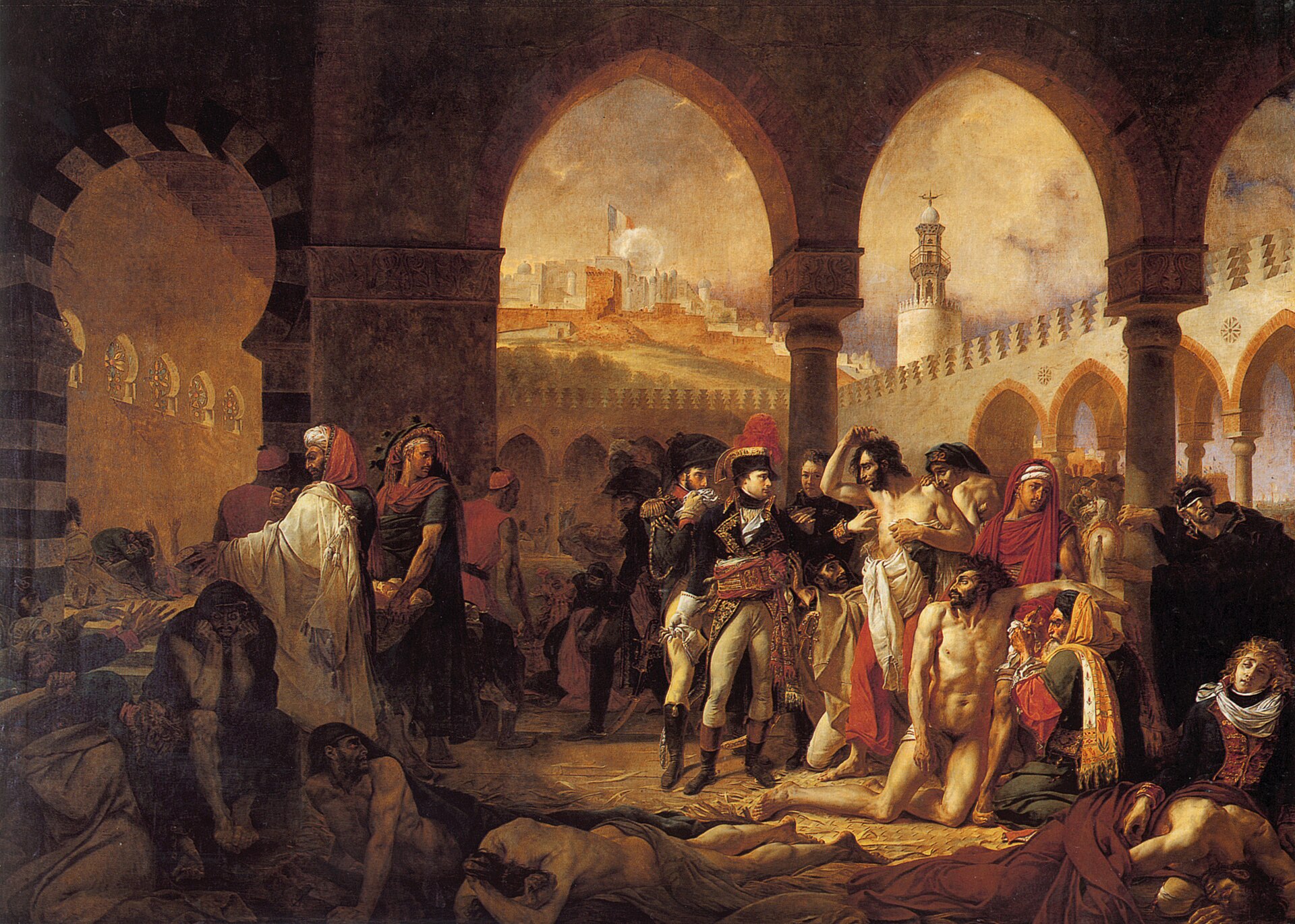 Napoleon visiting the plague victims of Jaffa, by Antoine-Jean Gros Imperial control, territorial and cultural, is justified through discourses about the imperialists' understanding of different spaces.[40] Conceptually, imagined geographies explain the limitations of the imperialist understanding of the societies of the different spaces inhabited by the non–European Other.[40] In Orientalism (1978), Edward Said said that the West developed the concept of The Orient—an imagined geography of the Eastern world—which functions as an essentializing discourse that represents neither the ethnic diversity nor the social reality of the Eastern world.[41] That by reducing the East into cultural essences, the imperial discourse uses place-based identities to create cultural difference and psychologic distance between "We, the West" and "They, the East" and between "Here, in the West" and "There, in the East".[42] That cultural differentiation was especially noticeable in the books and paintings of early Oriental studies, the European examinations of the Orient, which misrepresented the East as irrational and backward, the opposite of the rational and progressive West.[40][43] Defining the East as a negative vision of the Western world, as its inferior, not only increased the sense-of-self of the West, but also was a way of ordering the East, and making it known to the West, so that it could be dominated and controlled.[44][45] Therefore, Orientalism was the ideological justification of early Western imperialism—a body of knowledge and ideas that rationalized social, cultural, political, and economic control of other, non-white peoples.[42][16]: 116 Cartography See also: Cartographic propaganda 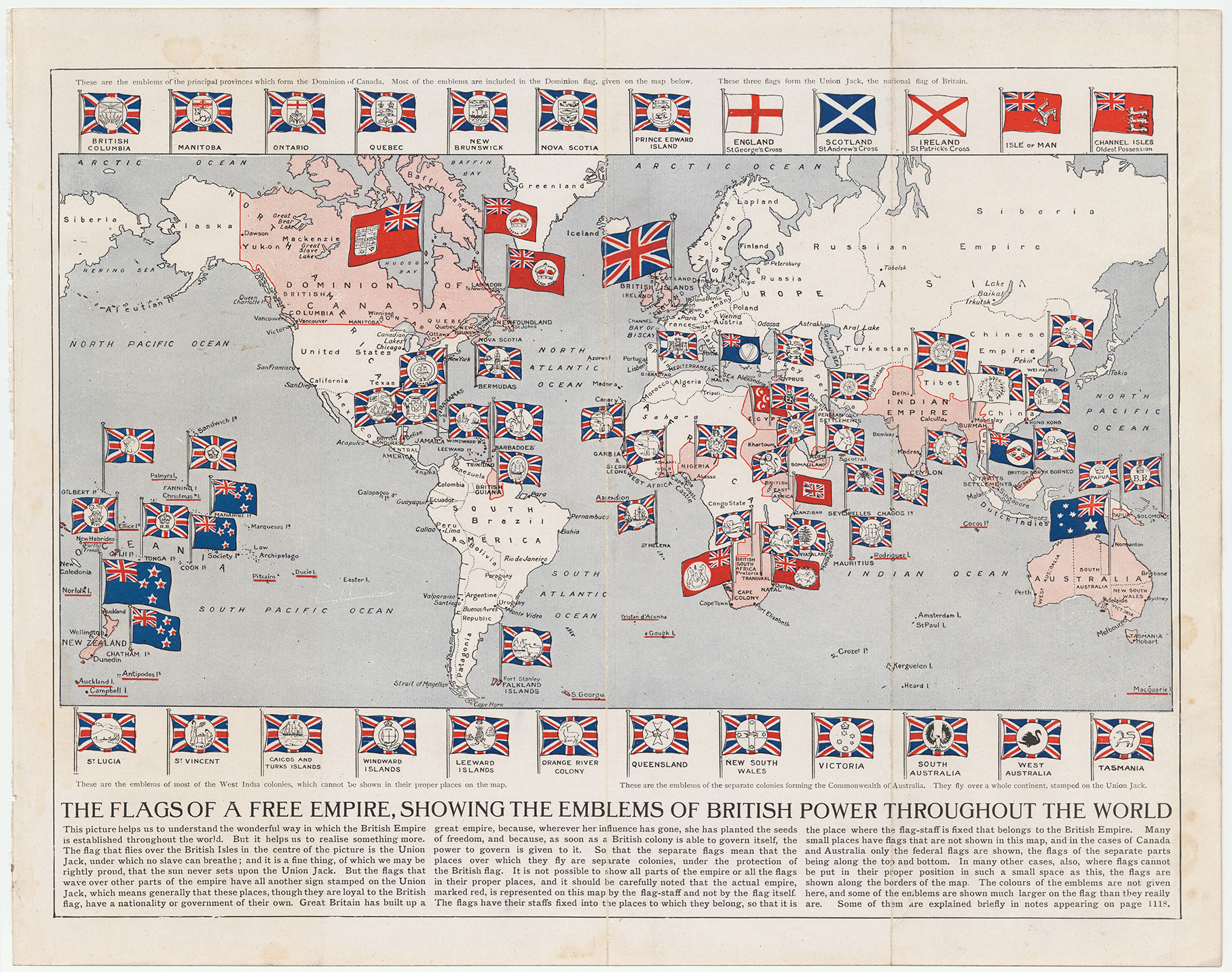 By displaying oversized flags of British possessions, this map artificially increases the apparent influence and presence of the British Empire. One of the main tools used by imperialists was cartography. Cartography is "the art, science and technology of making maps"[46] but this definition is problematic. It implies that maps are objective representations of the world when in reality they serve very political means.[46] For Harley, maps serve as an example of Foucault's power and knowledge concept. To better illustrate this idea, Bassett focuses his analysis of the role of 19th-century maps during the "Scramble for Africa".[47] He states that maps "contributed to empire by promoting, assisting, and legitimizing the extension of French and British power into West Africa".[47] During his analysis of 19th-century cartographic techniques, he highlights the use of blank space to denote unknown or unexplored territory.[47] This provided incentives for imperial and colonial powers to obtain "information to fill in blank spaces on contemporary maps".[47] Although cartographic processes advanced through imperialism, further analysis of their progress reveals many biases linked to eurocentrism. According to Bassett, "[n]ineteenth-century explorers commonly requested Africans to sketch maps of unknown areas on the ground. Many of those maps were highly regarded for their accuracy"[47] but were not printed in Europe unless Europeans verified them. Expansionism 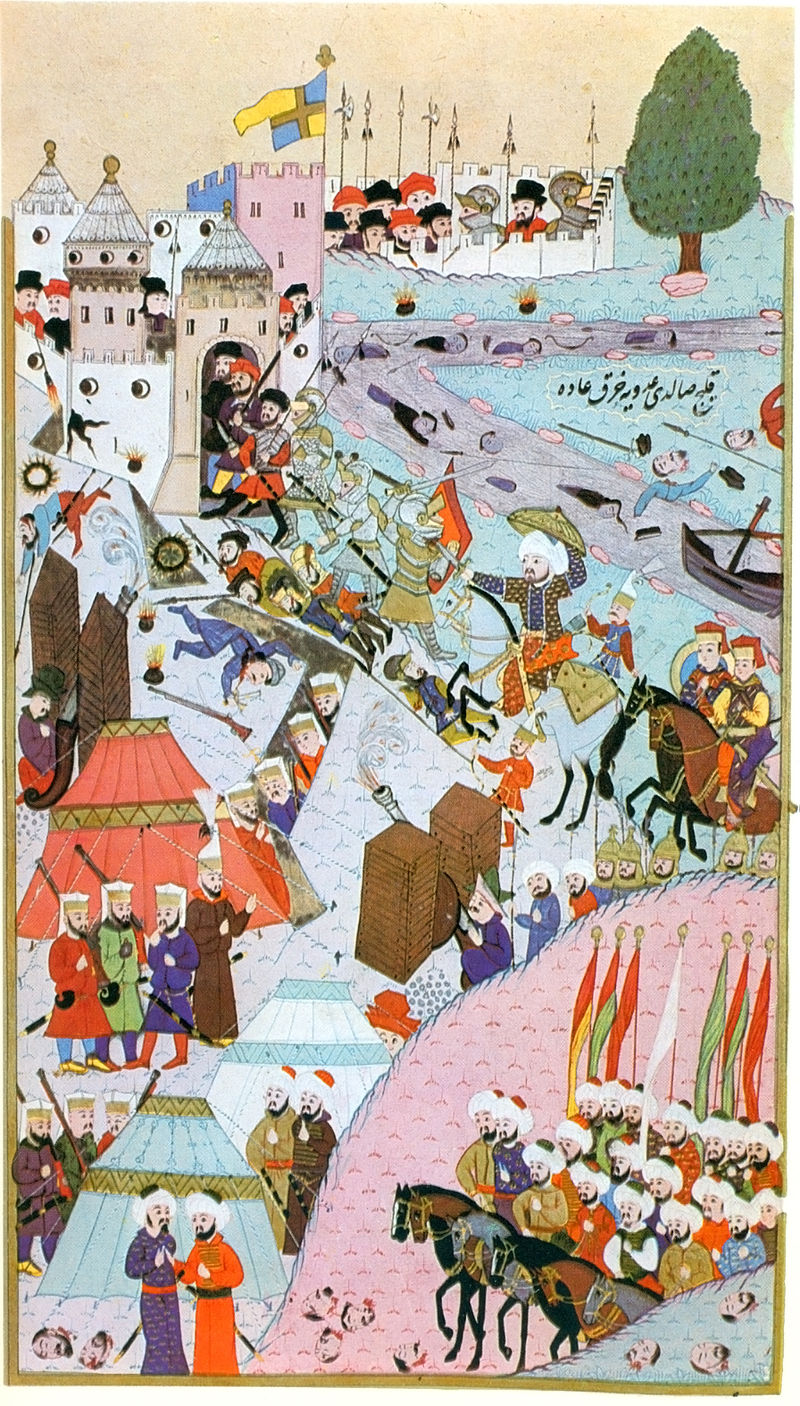 Ottoman wars in Europe Imperialism in pre-modern times was common in the form of expansionism through vassalage and conquest.[citation needed] Cultural imperialism The concept of cultural imperialism refers to the cultural influence of one dominant culture over others, i.e. a form of soft power, which changes the moral, cultural, and societal worldview of the subordinate culture. This means more than just "foreign" music, television or film becoming popular with young people; rather that a populace changes its own expectations of life, desiring for their own country to become more like the foreign country depicted. For example, depictions of opulent American lifestyles in the soap opera Dallas during the Cold War changed the expectations of Romanians; a more recent example is the influence of smuggled South Korean drama-series in North Korea. The importance of soft power is not lost on authoritarian regimes, which may oppose such influence with bans on foreign popular culture, control of the internet and of unauthorized satellite dishes, etc. Nor is such a usage of culture recent – as part of Roman imperialism, local elites would be exposed to the benefits and luxuries of Roman culture and lifestyle, with the aim that they would then become willing participants. Imperialism has been subject to moral or immoral censure by its critics[which?], and thus the term "imperialism" is frequently used in international propaganda as a pejorative for expansionist and aggressive foreign policy.[48] Psychological imperialism An empire mentality may build on and bolster views contrasting "primitive" and "advanced" peoples and cultures, thus justifying and encouraging imperialist practices among participants.[49] Associated psychological tropes include the White Man's Burden and the idea of civilizing mission (French: mission civilatrice). Social imperialism The political concept social imperialism is a Marxist expression first used in the early 20th century by Lenin as "socialist in words, imperialist in deeds" describing the Fabian Society and other socialist organizations.[50] Later, in a split with the Soviet Union, Mao Zedong criticized its leaders as social imperialists.[51] |
問題 オリエンタリズムと想像上の地理  ナポレオンがヤッファのペスト患者を訪問する様子、アントワーヌ=ジャン・グロ画 帝国による支配、領土的、文化的支配は、帝国主義者による異なる空間についての理解に関する言説によって正当化される。[40] 概念的には、想像上の地理は、非ヨーロッパの他者が居住する異なる空間における社会に対する帝国主義者の理解の限界を説明する。[40] エドワード・サイードは著書『オリエンタリズム』(1978年)の中で、西洋が東洋という概念を構築したと述べている。東洋という概念は、東洋世界の想像 上の地理であり、東洋世界の民族的多様性も社会現実も反映しない本質主義的な言説として機能している。東洋を文化の本質に還元することで、帝国主義的な言 説は、場所に基づくアイデンティティを利用して、「我々、西洋」と「彼ら、東洋」の間、そして「ここ、西洋」と「あそこ、東洋」の間に文化的相違と心理的 距離を生み出している。 この文化的な差異化は、初期の東洋学の書籍や絵画、すなわちヨーロッパによる東洋の検証において特に顕著であり、東洋を非合理的で後進的、すなわち合理的 で進歩的な西洋の対極にあるものと誤って表現していた。[40][43] 西洋世界にとって東洋を否定的なイメージとして、劣ったものとして定義することは、西洋の自己認識を高めるだけでなく、 東洋を秩序立て、西洋に知らしめることで、支配と管理を可能にする方法でもあった。[44][45] したがって、オリエンタリズムは初期の西洋帝国主義のイデオロギー的な正当化であり、非白人である他民族に対する社会的、文化的、政治的、経済的支配を正 当化する知識と思想の体系であった。[42][16]:116 地図製作 関連項目:地図製作におけるプロパガンダ  この地図では、イギリスの植民地の特大の旗を表示することで、大英帝国の存在感と影響力を人為的に増大させている。 帝国主義者が用いた主な手段のひとつが地図作成であった。地図作成とは「地図を作成する技術、科学、および芸術」[46] であるが、この定義には問題がある。地図は客観的に世界を表現していると示唆しているが、実際には地図はきわめて政治的な手段として用いられているからで ある。[46] ハーレイにとって地図は、フーコーの権力と知識の概念の例証である。 この考えをより明確に説明するために、バセットは「アフリカの争奪戦」における19世紀の地図の役割に焦点を当てて分析している。[47] 彼は、地図は「フランスとイギリスの西アフリカへの勢力拡大を促進し、支援し、正当化することで帝国に貢献した」と述べている。 [47] 19世紀の地図作成技術の分析において、彼は空白のスペースを未知の領域や未開拓の領域を示すために使用したことを強調している。[47] これにより、帝国主義国や植民地国は「現代の地図の空白スペースを埋める情報」を得るためのインセンティブが与えられた。[47] 帝国主義によって地図作成のプロセスは進歩したが、その進歩をさらに分析すると、ヨーロッパ中心主義に結びついた多くの偏見が明らかになる。バセットによ ると、「19世紀の探検家たちは、未知の地域の地図を現地でスケッチするようアフリカ人に依頼するのが一般的だった。それらの地図の多くは、その正確性か ら高く評価されていた」[47]が、ヨーロッパ人が確認しない限り、ヨーロッパでは印刷されることはなかった。 拡張主義  ヨーロッパにおけるオスマン帝国戦争 前近代の帝国主義は、従属や征服による拡張主義の形態で一般的であった。 文化帝国主義 文化帝国主義の概念は、ある支配的な文化が他の文化に及ぼす文化的影響を指し、すなわち、従属文化の道徳観、文化観、社会観を変えるソフトパワーの一形態 である。これは単に「外国の」音楽、テレビ番組、映画が若者の間で人気となるという以上のことを意味する。むしろ、人々は自らの生活に対する期待を変え、 自国が描写されている外国のようになることを望むのである。例えば、冷戦時代にソープオペラ『ダラス』で描かれたアメリカの上流階級の生活様式は、ルーマ ニア人の期待を変えた。より最近の例としては、北朝鮮における韓国のドラマシリーズの密輸の影響がある。ソフトパワーの重要性は、独裁政権も認識してお り、外国のポピュラーカルチャーの禁止、インターネットや無許可の衛星放送受信アンテナの規制などによって、そうした影響に対抗することがある。また、こ のような文化の利用は最近始まったことでもない。ローマ帝国主義の一部として、ローマのエリート層はローマ文化やライフスタイルの恩恵や贅沢に触れ、彼ら が自発的な参加者となることを目的としていた。 帝国主義は、その批判者たちによって道徳的または非道徳的な批判の対象となっており[誰によって?]、そのため「帝国主義」という用語は、拡張主義的で攻撃的な外交政策に対する軽蔑的な表現として、国際的なプロパガンダで頻繁に使用されている。 心理的帝国主義 帝国のメンタリティは、「原始的」な民族や文化と「進歩的」な民族や文化を対比する見解を強化し、帝国主義的な行為を正当化し、参加者にそれを推奨する可 能性がある。[49] 関連する心理的表現には、「ホワイト・マンズ・バーデン(White Man's Burden)」や「文明化の使命(civilizing mission)」という考え方がある。 社会的帝国主義 政治的概念である社会的帝国主義は、20世紀初頭にレーニンが「口では社会主義を唱えながら、実際には帝国主義的行動をとる」という表現で、フェビアン協 会やその他の社会主義組織を評した際に初めて使用されたマルクス主義の表現である。[50] その後、ソビエト連邦と袂を分かつ形で、毛沢東は同国の指導者たちを社会的帝国主義者と批判した。[51] |
Justification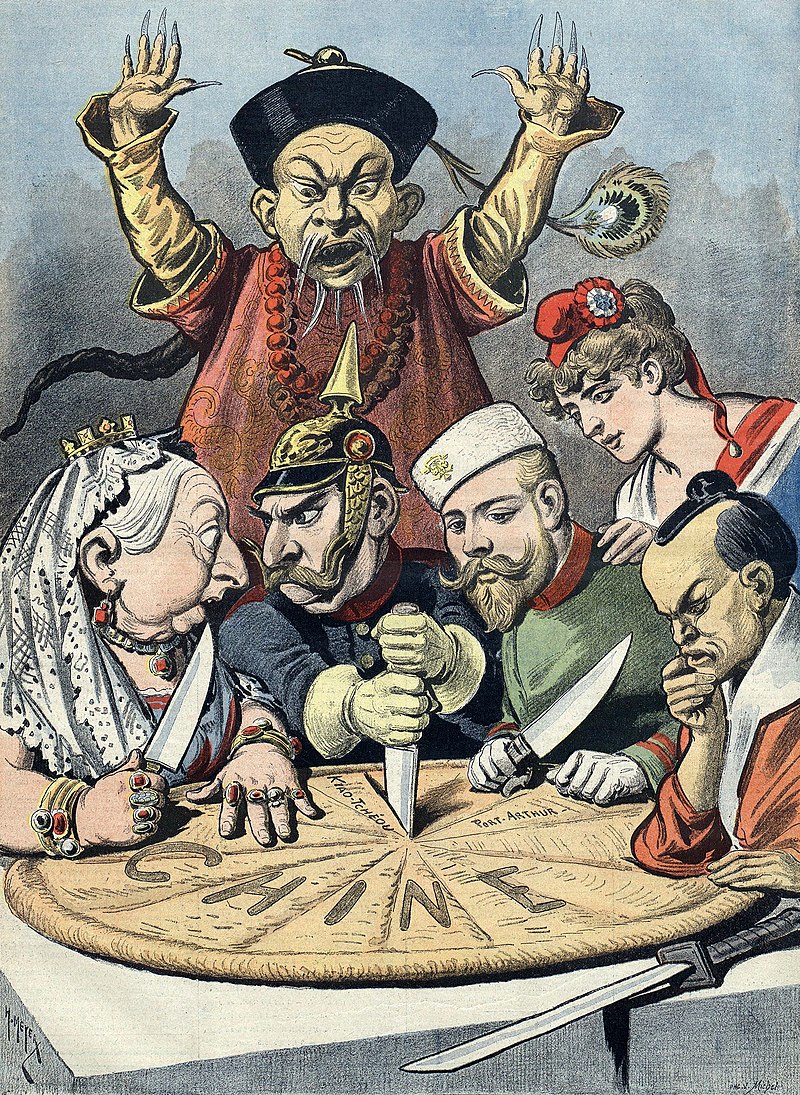 A French political cartoon depicting a shocked mandarin in Manchu robe in the back, with Queen Victoria (British Empire), Wilhelm II (German Empire), Nicholas II (Russian Empire), Marianne (French Third Republic), and a samurai (Empire of Japan) stabbing into a king cake with Chine ("China" in French) written on it. A portrayal of New Imperialism and its effects on China. Stephen Howe has summarized his view on the beneficial effects of the colonial empires: At least some of the great modern empires – the British, French, Austro-Hungarian, Russian, and even the Ottoman – have virtues that have been too readily forgotten. They provided stability, security, and legal order for their subjects. They constrained, and at their best, tried to transcend, the potentially savage ethnic or religious antagonisms among the peoples. And the aristocracies which ruled most of them were often far more liberal, humane, and cosmopolitan than their supposedly ever more democratic successors.[52][53] A controversial aspect of imperialism is the defense and justification of empire-building based on seemingly rational grounds. In ancient China, Tianxia denoted the lands, space, and area divinely appointed to the Emperor by universal and well-defined principles of order. The center of this land was directly apportioned to the Imperial court, forming the center of a world view that centered on the Imperial court and went concentrically outward to major and minor officials and then the common citizens, tributary states, and finally ending with the fringe "barbarians". Tianxia's idea of hierarchy gave Chinese a privileged position and was justified through the promise of order and peace. The purportedly scientific nature of "Social Darwinism" and a theory of races formed a supposedly rational justification for imperialism. Under this doctrine, the French politician Jules Ferry could declare in 1883 that "Superior races have a right, because they have a duty. They have the duty to civilize the inferior races."[54] J. A. Hobson identifies this justification on general grounds as: "It is desirable that the earth should be peopled, governed, and developed, as far as possible, by the races which can do this work best, i.e. by the races of highest 'social efficiency'".[55] The Royal Geographical Society of London and other geographical societies in Europe had great influence and were able to fund travelers who would come back with tales of their discoveries. These societies also served as a space for travellers to share these stories.[16]: 117 Political geographers such as Friedrich Ratzel of Germany and Halford Mackinder of Britain also supported imperialism.[16]: 117 Ratzel believed expansion was necessary for a state's survival and this argument dominated the discipline of geopolitics for decades.[16]: 117 British imperialism in some sparsely-inhabited regions applied a principle now termed Terra nullius (Latin expression which stems from Roman law meaning 'no man's land'). The British settlement in Australia in the 18th century was arguably premised on terra nullius, as its settlers considered it unused by its original inhabitants. The rhetoric of colonizers being racially superior appears still to have its impact. For example, throughout Latin America "whiteness" is still prized today and various forms of blanqueamiento (whitening) are common. Imperial peripheries benefited from economic efficiency improved through the building of roads, other infrastructure and introduction of new technologies. Herbert Lüthy notes that ex-colonial peoples themselves show no desire to undo the basic effects of this process. Hence moral self-criticism in respect of the colonial past is out of place.[56] Environmental determinism The concept of environmental determinism served as a moral justification for the domination of certain territories and peoples. The environmental determinist school of thought held that the environment in which certain people lived determined those persons' behaviours; and thus validated their domination. Some geographic scholars under colonizing empires divided the world into climatic zones. These scholars believed that Northern Europe and the Mid-Atlantic temperate climate produced a hard-working, moral, and upstanding human being. In contrast, tropical climates allegedly yielded lazy attitudes, sexual promiscuity, exotic culture, and moral degeneracy. The tropical peoples were believed to be "less civilized" and in need of European guidance,[16]: 117 therefore justifying colonial control as a civilizing mission. For instance, American geographer Ellen Churchill Semple argued that even though human beings originated in the tropics they were only able to become fully human in the temperate zone.[57]: 11 Across the three major waves of European colonialism (the first in the Americas, the second in Asia and the last in Africa), environmental determinism served to place categorically indigenous people in a racial hierarchy. Tropicality can be paralleled with Edward Said's Orientalism as the west's construction of the east as the "other".[57]: 7 According to Said, orientalism allowed Europe to establish itself as the superior and the norm, which justified its dominance over the essentialized Orient.[58]: 329 Orientalism is a view of a people based on their geographical location.[59] |
正当化 後ろに描かれた、満州族の衣装を身にまとったショックを受けた役人を描いたフランスの政治風刺漫画。ヴィクトリア女王(大英帝国)、ヴィルヘルム2世(ド イツ帝国)、ニコライ2世(ロシア帝国)、マリアンヌ(フランス第三共和制)、そして侍(大日本帝国)が、「Chine(フランス語で「中国」の意)」と 書かれたキングケーキにナイフを刺している。新帝国主義と中国への影響を描いたもの。 スティーブン・ハウは、植民地帝国の有益な効果に関する自身の考えを次のようにまとめている。 少なくとも、偉大な近代帝国であるイギリス、フランス、オーストリア=ハンガリー、ロシア、さらにはオスマン帝国には、あまりにも簡単に忘れ去られてきた 美徳があった。それらの帝国は、自国民に対して安定性、安全性、法秩序を提供した。また、人々の間に潜在的に存在する野蛮な民族間・宗教間の対立を抑制 し、最善を尽くしてそれを乗り越えようとした。そして、それらの帝国のほとんどを支配していた貴族階級は、その後に続くはずの民主主義的な後継者よりもは るかにリベラルで、人道主義的で、国際的であったことが多かった。 帝国主義の論争の的となる側面は、一見合理的な根拠に基づく帝国建設の正当化と擁護である。古代中国では、天下一(てんか)は、普遍的で明確な秩序の原則 によって皇帝に神聖に与えられた土地、空間、領域を意味した。この土地の中心は皇帝の宮廷に直接割り当てられ、宮廷を中心とする世界観の中心を形成し、同 心円状に主要な役人や下級役人、そして一般市民、朝貢国へと広がり、最後に辺境の「野蛮人」で終わる。天下一の階層観は中国人に特権的な地位を与え、秩序 と平和の約束によって正当化された。 社会ダーウィニズム」の科学的性質と人種理論は、帝国主義を合理的に正当化する根拠となった。この理論に基づき、フランスの政治家ジュール・フェリーは 1883年に「優れた人種には権利がある。なぜなら、彼らには義務があるからだ。彼らは劣った人種を文明化する義務があるのだ」と宣言した。[54] J. A. ホブソンは、この一般的な根拠を次のように要約している。「地球は、できる限り、この仕事を最もよくこなせる人種、すなわち最高の『社会的効率』を持つ人 種によって、開拓され、統治され、開発されることが望ましい」[55] ロンドン王立地理学会やヨーロッパの他の地理学会は大きな影響力を持ち、発見の物語を携えて戻ってくる探検家たちに資金を提供することができた。これらの 学会は、旅行者たちが発見の物語を共有する場としても機能していた。[16]: 117 ドイツのフリードリヒ・ラッツェルやイギリスのハルフォード・マキンダーといった政治地理学者も帝国主義を支持していた。[16]: 117 ラッツェルは、国家の存続には拡大が必要だと信じており、 国家の生存には拡大が必要であると主張し、この論は数十年にわたって地政学の分野を支配した。[16]: 117 イギリスの帝国主義は、一部の人口密度の低い地域において、現在では「Terra nullius(ラテン語で「無主地」を意味するローマ法に由来する表現)」と呼ばれる原則を適用した。18世紀にオーストラリアにイギリス人が入植した 際には、入植者たちはその土地が元来の住民によって利用されていないと考えていたため、おそらくテラ・ヌリアスを前提としていた。植民地化者が人種的に優 れているという主張は、今も影響を残している。例えば、ラテンアメリカでは現在でも「白人であること」が尊ばれており、さまざまな形のブランケミエント (白人化)が一般的である。 帝国の周辺地域は、道路やその他のインフラの建設、新技術の導入による経済効率の向上の恩恵を受けた。ハーバート・リュティは、元植民地の人々自身も、こ のプロセスの基本的な影響を元に戻そうとする気はないと指摘している。したがって、植民地支配の過去に関する道徳的な自己批判は的外れである。 環境決定論 環境決定論の概念は、特定の地域や人々を支配する道徳的な正当化の根拠として用いられた。環境決定論派は、特定の人々が暮らす環境がその人々の行動を決定 すると考え、それゆえに彼らの支配を正当化した。植民地帝国の傘下にある地理学者の中には、世界を気候帯に分ける者もいた。これらの学者は、北ヨーロッパ と北大西洋の温帯気候は勤勉で道徳心があり、高潔な人間を生み出すと考えた。一方、熱帯気候は怠惰な態度、性的な奔放さ、エキゾチックな文化、そして道徳 的な退廃を生み出すとされた。熱帯地域の住民は「文明化が遅れている」と考えられ、ヨーロッパの指導が必要であるとされたため、[16] 文明化を目的とした植民地支配が正当化された。例えば、アメリカの地理学者エレン・チャーチル・センプルは、人間は熱帯で誕生したにもかかわらず、温帯で こそ完全に人間になることができると主張した。[57]: 11 ヨーロッパによる3つの主要な植民地主義の波(最初の波はアメリカ大陸、2番目の波はアジア、最後の波はアフリカ)を通じて、環境決定論は先住民を人種的 ヒエラルキーに明確に位置づけるのに役立った。熱帯性は、西洋が東洋を「他者」として構築したものとして、エドワード・サイードのオリエンタリズムと並列 的に考えることができる。[57]: 7 サイードによれば、オリエンタリズムはヨーロッパが自らを優位で規範的な存在として位置づけることを可能にし、それが本質化された東洋に対する支配を正当 化した。[58]: 329 オリエンタリズムは、人々をその地理的位置に基づいて捉える見方である。[59] |
| Anti-imperialism Main article: Anti-imperialism [icon] This section needs expansion. You can help by adding to it. (June 2020) Anti-imperialism gained a wide currency after the Second World War and at the onset of the Cold War as political movements in colonies of European powers promoted national sovereignty. Some anti-imperialist groups who opposed the United States supported the power of the Soviet Union, such as in Guevarism, while in Maoism this was criticized as social imperialism. Pan-African Movement Pan-Africanism is a movement across Africa and the world that came as a result of imperial ideas splitting apart African nations and pitting them against each other. The Pan-African movement instead tried to reverse those ideas by uniting Africans and creating a sense of brotherhood among all African people.[60] The Pan-African movement helped with the eventual end of Colonialism in Africa. Representatives at the 1900 Pan African Conference demanded moderate reforms for colonial African nations.[61] The conference also discussed African populations in the Caribbean and the United States and their rights. There was a total of 6 Pan-African conferences that were held and these allowed the African people to have a voice in ending colonial rule. Imperialism by country Rome Main article: Roman Empire [icon] This section needs expansion. You can help by adding to it. (April 2021) 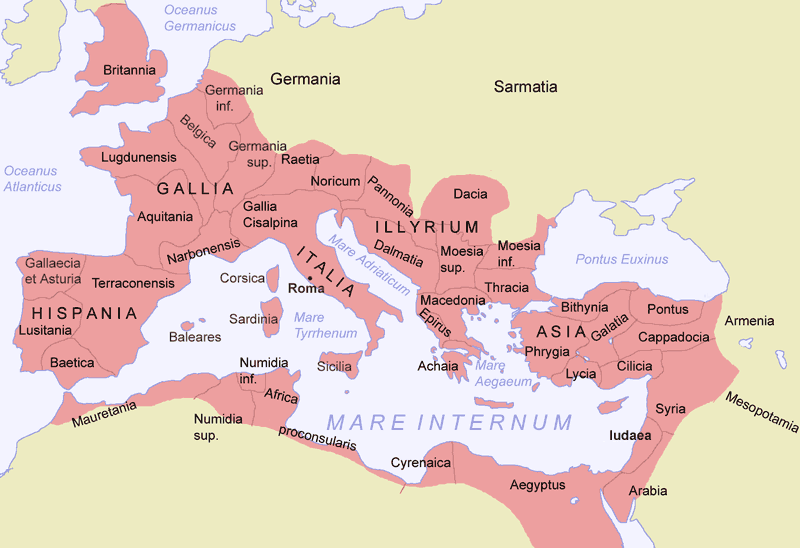 Provinces of the Roman Empire around 117 AD The Roman Empire was the post-Republican period of ancient Rome. As a polity, it included large territorial holdings around the Mediterranean Sea in Europe, North Africa, and Western Asia, ruled by emperors. Arabia Main articles: Early Muslim conquests and Muslim conquests in the Indian subcontinent [icon] This section needs expansion. You can help by adding to it. (April 2020) Belgium Main article: Belgian Empire [icon] This section needs expansion. You can help by adding to it. (April 2020) United Kingdom Main articles: Historiography of the British Empire and British Empire 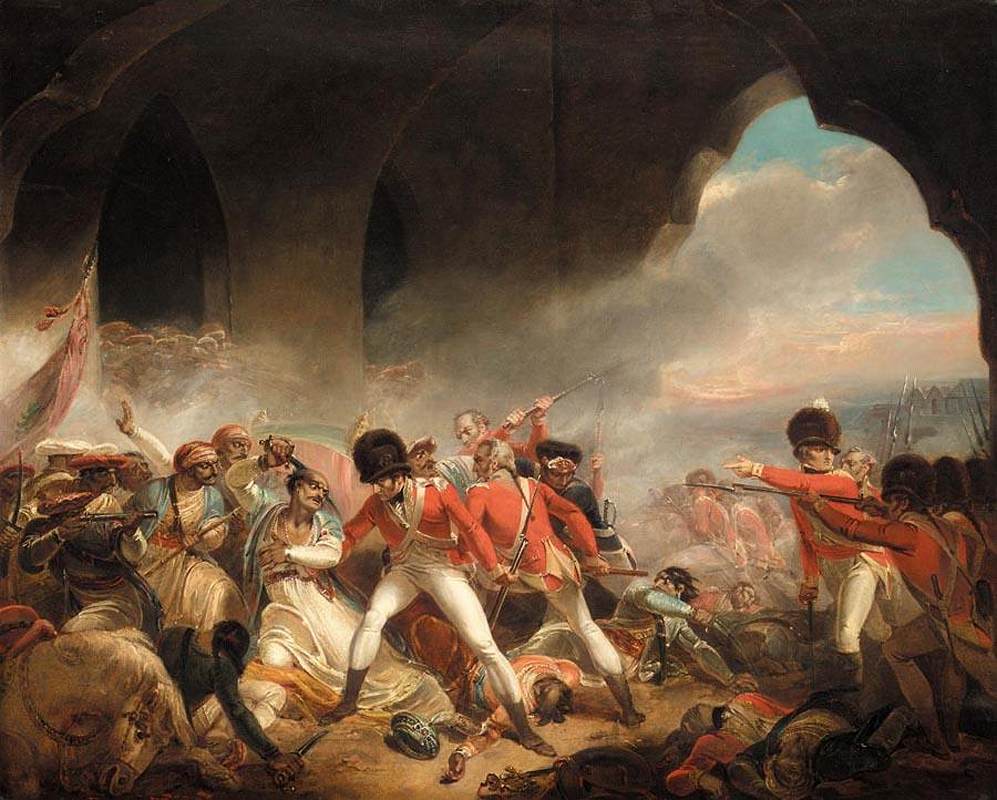 Tipu, Sultan of Mysore, an ally of Napoleone Bonaparte, confronted British East India Company forces at the Siege of Srirangapatna, where he was killed. 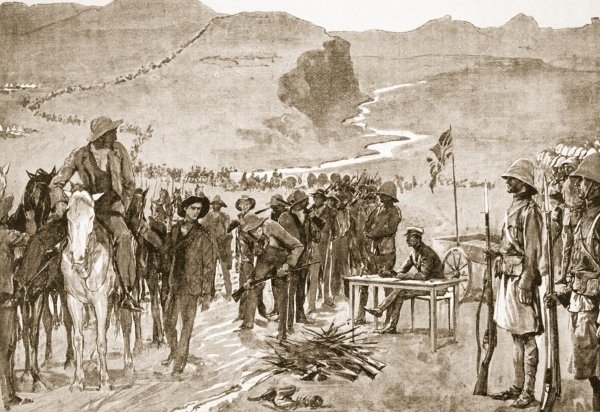 The result of the Boer Wars was the annexation of the Boer Republics to the British Empire in 1902. England England's imperialist ambitions can be seen as early as the 16th century as the Tudor conquest of Ireland began in the 1530s. In 1599 the British East India Company was established and was chartered by Queen Elizabeth in the following year.[17]: 174 With the establishment of trading posts in India, the British were able to maintain strength relative to other empires such as the Portuguese who already had set up trading posts in India.[17]: 174 Scotland Between 1621 and 1699, the Kingdom of Scotland authorised several colonies in the Americas. Most of these colonies were either closed down or collapsed quickly for various reasons. United Kingdom Under the Acts of Union 1707, the English and Scottish kingdoms were merged, and their colonies collectively became subject to Great Britain (also known as the United Kingdom). The empire Great Britain would go on to found was the largest empire that the world has ever seen both in terms of landmass and population. Its power, both military and economic, remained unmatched for a few decades. In 1767, the Anglo-Mysore Wars and other political activity caused exploitation of the East India Company causing the plundering of the local economy, almost bringing the company into bankruptcy.[62] By the year 1670 Britain's imperialist ambitions were well off as she had colonies in Virginia, Massachusetts, Bermuda, Honduras, Antigua, Barbados, Jamaica and Nova Scotia.[62] Due to the vast imperialist ambitions of European countries, Britain had several clashes with France. This competition was evident in the colonization of what is now known as Canada. John Cabot claimed Newfoundland for the British while the French established colonies along the St. Lawrence River and claiming it as "New France".[63] Britain continued to expand by colonizing countries such as New Zealand and Australia, both of which were not empty land as they had their own locals and cultures.[17]: 175 Britain's nationalistic movements were evident with the creation of the commonwealth countries where there was a shared nature of national identity.[17]: 147 Following the proto-industrialization, the "First" British Empire was based on mercantilism, and involved colonies and holdings primarily in North America, the Caribbean, and India. Its growth was reversed by the loss of the American colonies in 1776. Britain made compensating gains in India, Australia, and in constructing an informal economic empire through control of trade and finance in Latin America after the independence of Spanish and Portuguese colonies in about 1820.[64] By the 1840s, the United Kingdom had adopted a highly successful policy of free trade that gave it dominance in the trade of much of the world.[65] After losing its first Empire to the Americans, Britain then turned its attention towards Asia, Africa, and the Pacific. Following the defeat of Napoleonic France in 1815, the United Kingdom enjoyed a century of almost unchallenged dominance and expanded its imperial holdings around the globe. Unchallenged at sea, British dominance was later described as Pax Britannica ("British Peace"), a period of relative peace in Europe and the world (1815–1914) during which the British Empire became the global hegemon and adopted the role of global policeman. However, this peace was mostly a perceived one from Europe, and the period was still an almost uninterrupted series of colonial wars and disputes. The British Conquest of India, its intervention against Mehemet Ali, the Anglo-Burmese Wars, the Crimean War, the Opium Wars and the Scramble for Africa to name the most notable conflicts mobilised ample military means to press Britain's lead in the global conquest Europe led across the century.[66][67][68][69] 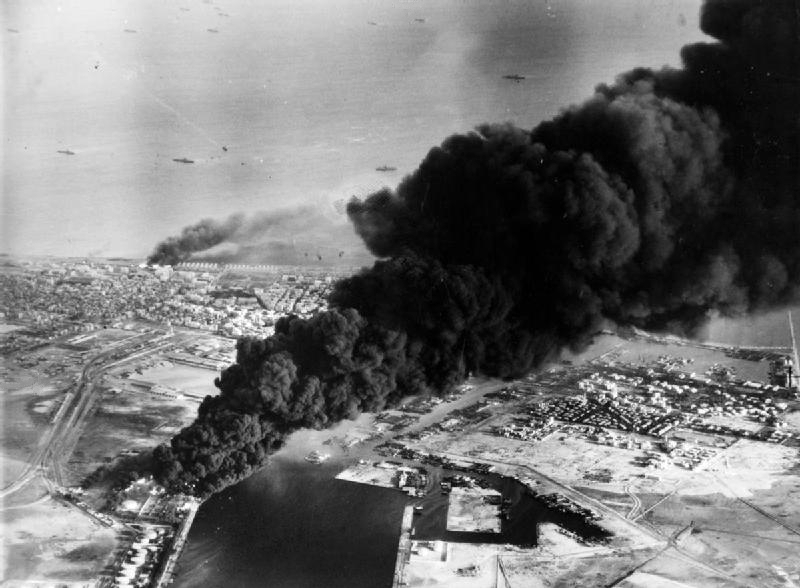 Smoke rises from oil tanks beside the Suez Canal hit during the initial Anglo-French assault on Egypt, 5 November 1956. In the early 19th century, the Industrial Revolution began to transform Britain; by the time of the Great Exhibition in 1851 the country was described as the "workshop of the world".[70] The British Empire expanded to include India, large parts of Africa and many other territories throughout the world. Alongside the formal control it exerted over its own colonies, British dominance of much of world trade meant that it effectively controlled the economies of many regions, such as Asia and Latin America.[71][72] Domestically, political attitudes favoured free trade and laissez-faire policies and a gradual widening of the voting franchise. During this century, the population increased at a dramatic rate, accompanied by rapid urbanisation, causing significant social and economic stresses.[73] To seek new markets and sources of raw materials, the Conservative Party under Disraeli launched a period of imperialist expansion in Egypt, South Africa, and elsewhere. Canada, Australia, and New Zealand became self-governing dominions.[74][75] 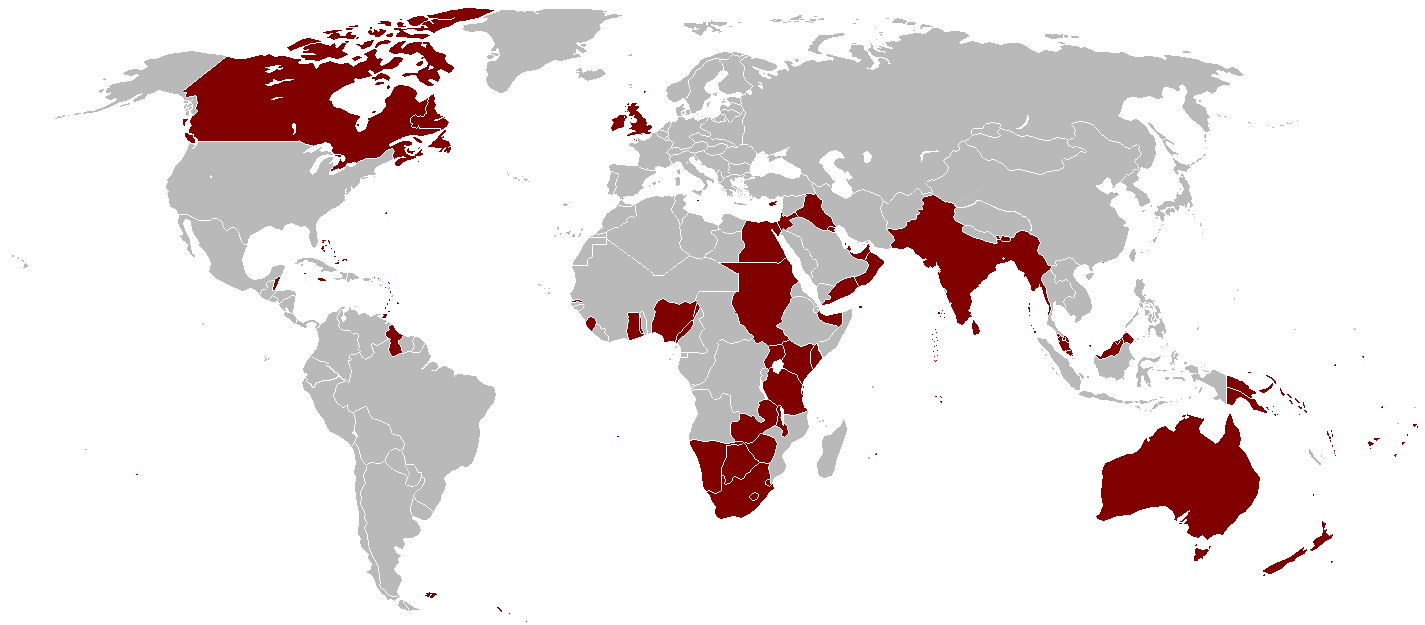 Map of the British Empire at its territorial peak in 1921 A resurgence came in the late 19th century with the Scramble for Africa and major additions in Asia and the Middle East. The British spirit of imperialism was expressed by Joseph Chamberlain and Lord Rosebury, and implemented in Africa by Cecil Rhodes. The pseudo-sciences of Social Darwinism and theories of race formed an ideological underpinning and legitimation during this time. Other influential spokesmen included Lord Cromer, Lord Curzon, General Kitchener, Lord Milner, and the writer Rudyard Kipling.[76] After the First Boer War, the South African Republic and Orange Free State were recognised by the United Kingdom but eventually re-annexed after the Second Boer War. But British power was fading, as the reunited German state founded by the Kingdom of Prussia posed a growing threat to Britain's dominance. As of 1913, the United Kingdom was the world's fourth economy, behind the U.S., Russia and Germany. Irish War of Independence in 1919–1921 led to the сreation of the Irish Free State. But the United Kingdom gained control of former German and Ottoman colonies with the League of Nations mandate. The United Kingdom now had a practically continuous line of controlled territories from Egypt to Burma and another one from Cairo to Cape Town. However, this period was also one of emergence of independence movements based on nationalism and new experiences the colonists had gained in the war. World War II decisively weakened Britain's position in the world, especially financially. Decolonization movements arose nearly everywhere in the Empire, resulting in Indian independence and partition in 1947, the self-governing dominions break away from the empire in 1949, and the establishment of independent states in the 1950s. British imperialism showed its frailty in Egypt during the Suez Crisis in 1956. However, with the United States and Soviet Union emerging from World War II as the sole superpowers, Britain's role as a worldwide power declined significantly and rapidly.[77] Canada 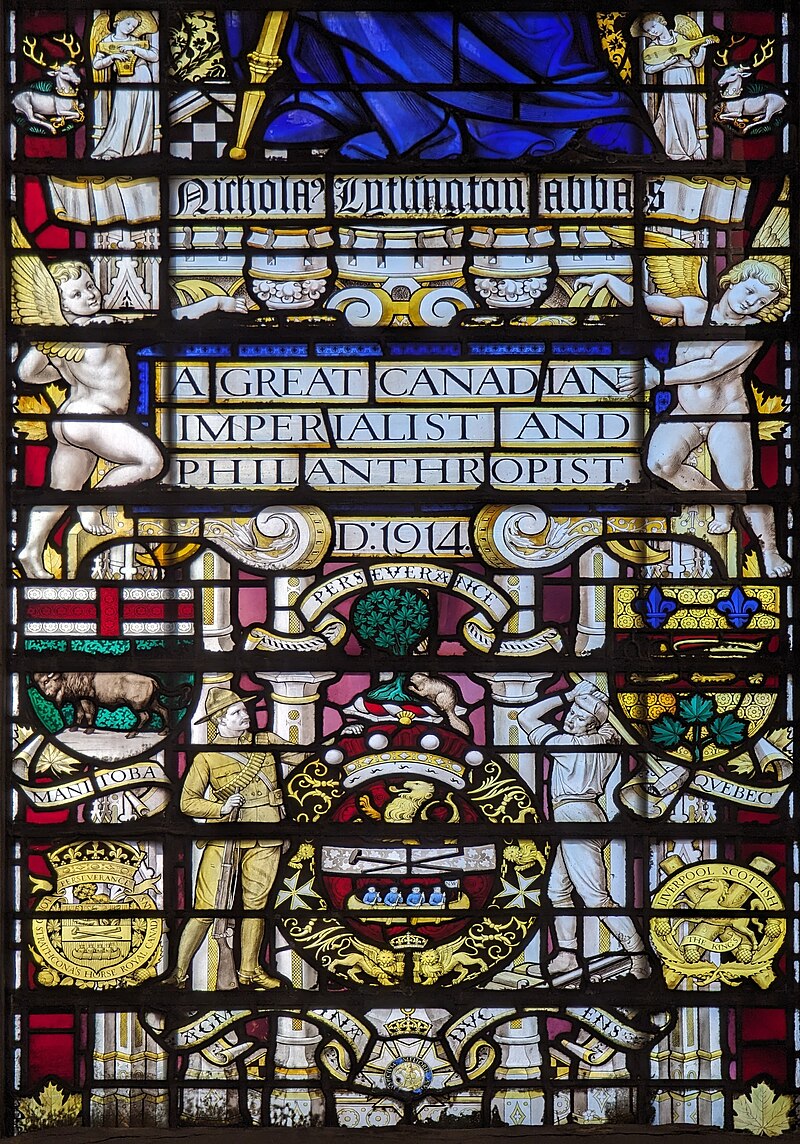 Westminster Abbey window to Donald Smith, 1st Baron Strathcona and Mount Royal, a great Canadian imperialist and philanthropist Donald Smith, 1st Baron Strathcona and Mount Royal, "A great Canadian Imperialist and Philanthropist" In Canada, the "imperialism" (and the related term "colonialism") has had a variety of contradictory meanings since the 19th century. In the late 19th and early 20th, to be an "imperialist" meant thinking of Canada as a part of the British nation not a separate nation.[78] The older words for the same concepts were "loyalism" or "unionism", which continued to be used as well. In mid-twentieth century Canada, the words "imperialism" and "colonialism" were used in English Canadian discourse to instead portray Canada as a victim of economic and cultural penetration by the United States.[79] In twentieth century French-Canadian discourse the "imperialists" were all the Anglo-Saxon countries including Canada who were oppressing French-speakers and the province of Quebec. By the early 21st century, "colonialism" was used to highlight supposed anti-indigenous attitudes and actions of Canada inherited from the British period. China 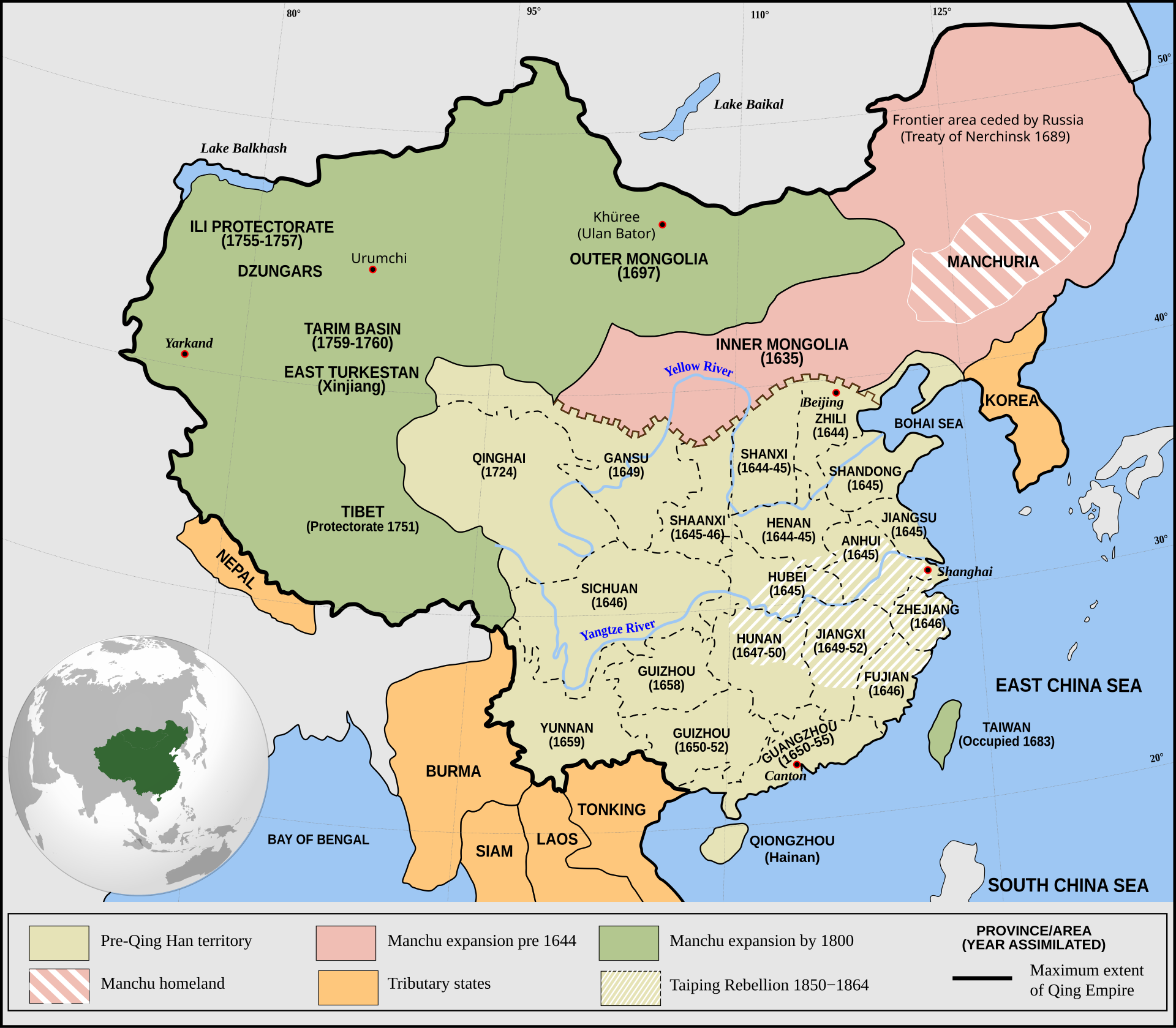 The Qing Empire c. 1820 marked the time when the Qing began to rule these areas. Main article: Chinese imperialism See also: Tang dynasty in Inner Asia, Yuan dynasty in Inner Asia, and Qing dynasty in Inner Asia 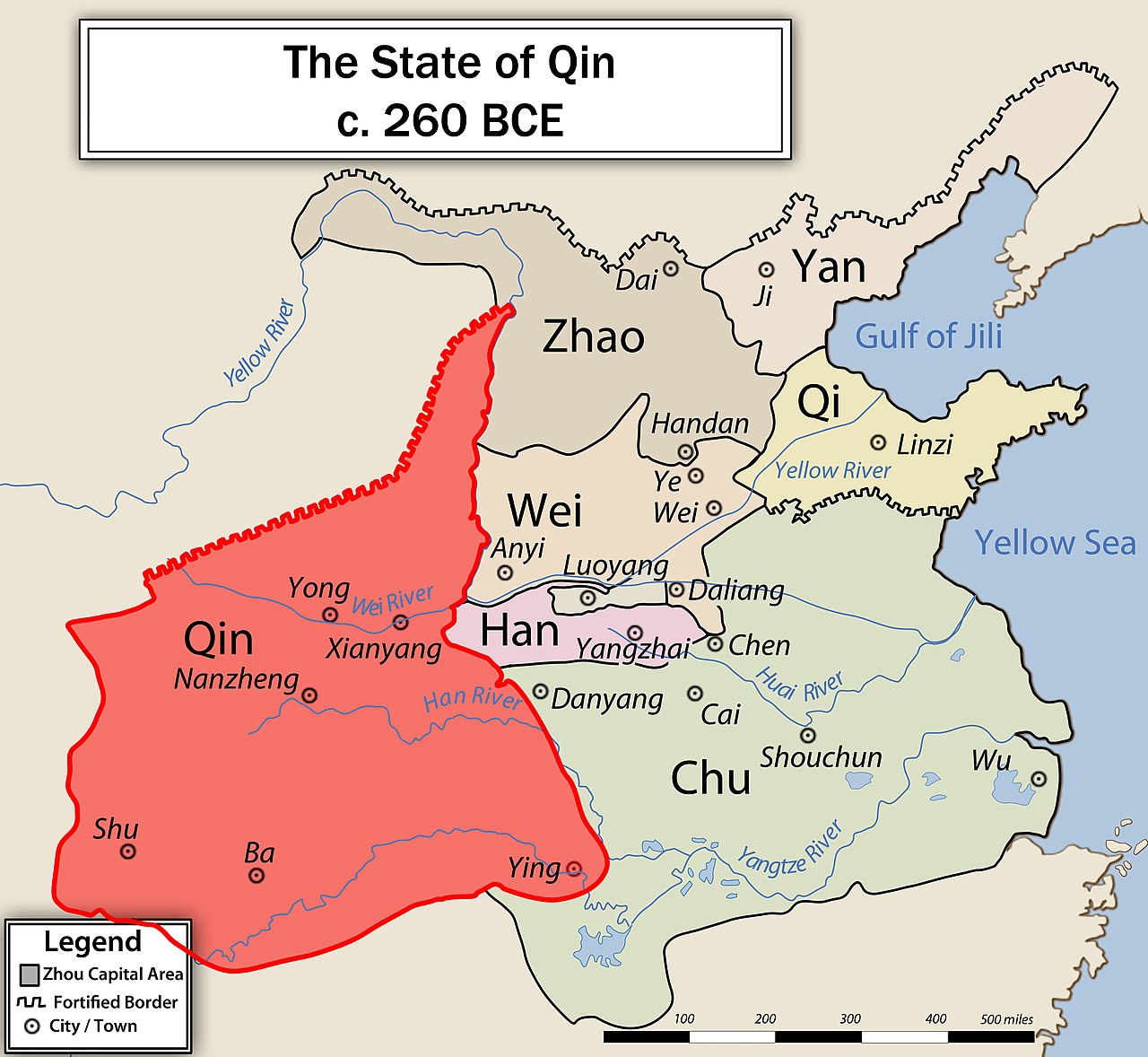 Map of the Growth of China under Qin Dynasty China was one of the world's oldest empires. Due to its long history of imperialist expansion, China has been seen by its neighboring countries as a threat due to its large population, giant economy, large military force as well as its territorial evolution throughout history. Starting with the unification of China under the Qin dynasty, later Chinese dynasties continued to follow its form of expansions.[80] The most successful Chinese imperial dynasties in terms of territorial expansion were the Han, Tang, Yuan, and Qing dynasties. Denmark Main article: Danish overseas colonies Denmark–Norway (Denmark after 1814) possessed overseas colonies from 1536 until 1953. At its apex there were colonies on four continents: Europe, North America, Africa and Asia. In the 17th century, following territorial losses on the Scandinavian Peninsula, Denmark-Norway began to develop colonies, forts, and trading posts in West Africa, the Caribbean, and the Indian subcontinent. Christian IV first initiated the policy of expanding Denmark-Norway's overseas trade, as part of the mercantilist wave that was sweeping Europe. Denmark-Norway's first colony was established at Tranquebar on India's southern coast in 1620. Admiral Ove Gjedde led the expedition that established the colony. After 1814, when Norway was ceded to Sweden, Denmark retained what remained of Norway's great medieval colonial holdings. One by one the smaller colonies were lost or sold. Tranquebar was sold to the British in 1845. The United States purchased the Danish West Indies in 1917. Iceland became independent in 1944. Today, the only remaining vestiges are two originally Norwegian colonies that are currently within the Danish Realm, the Faroe Islands and Greenland; the Faroes were a Danish county until 1948, while Greenland's colonial status ceased in 1953. They are now autonomous territories.[81] France Main article: French colonial empire 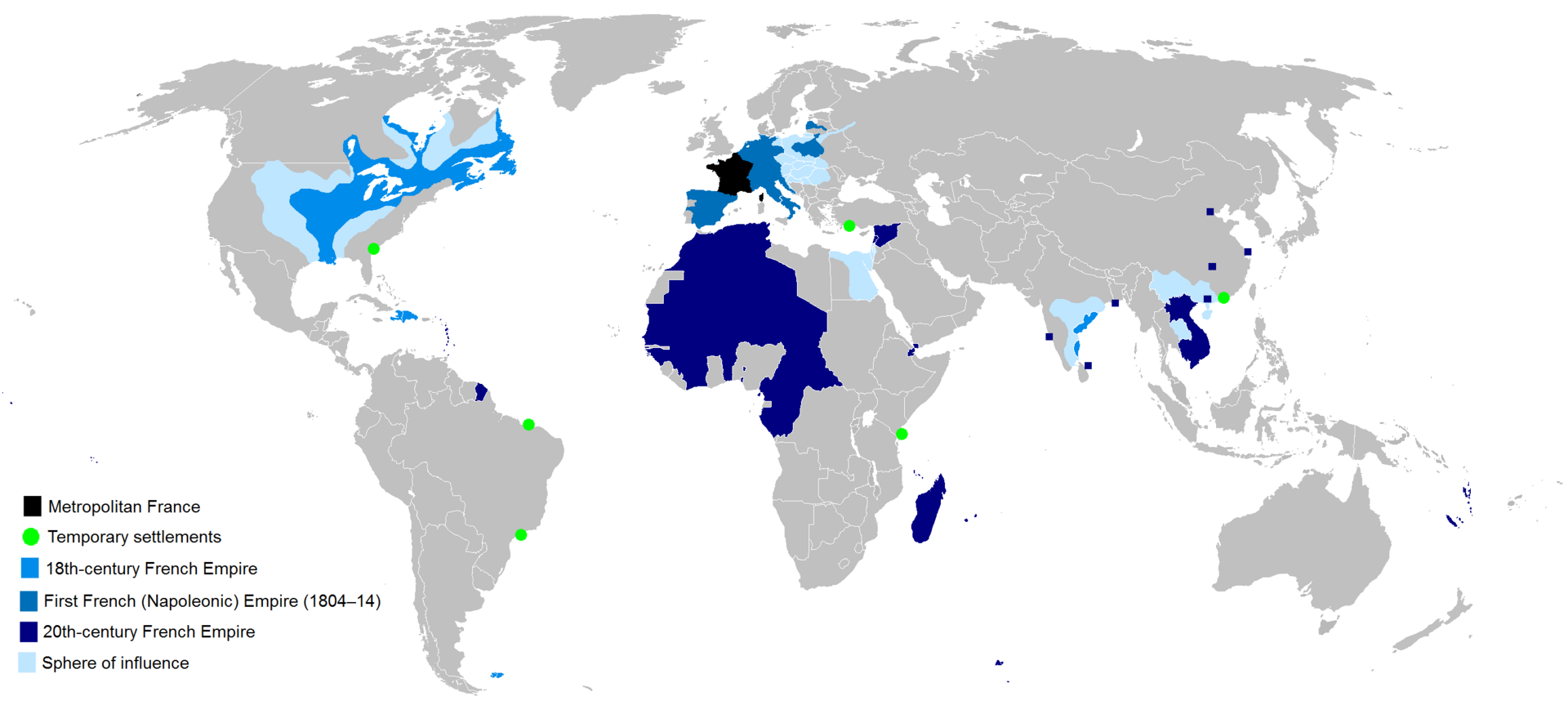 Map of the first (light blue) and second (dark blue) French colonial empires During the 16th century, the French colonization of the Americas began with the creation of New France. It was followed by French East India Company's trading posts in Africa and Asia in the 17th century. France had its "First colonial empire" from 1534 until 1814, including New France (Canada, Acadia, Newfoundland and Louisiana), French West Indies (Saint-Domingue, Guadeloupe, Martinique), French Guiana, Senegal (Gorée), Mascarene Islands (Mauritius Island, Réunion) and French India. Its "Second colonial empire" began with the seizure of Algiers in 1830 and came for the most part to an end with the granting of independence to Algeria in 1962.[82] The French imperial history was marked by numerous wars, large and small, and also by significant help to France itself from the colonials in the world wars.[83] France took control of Algeria in 1830 but began in earnest to rebuild its worldwide empire after 1850, concentrating chiefly in North and West Africa (French North Africa, French West Africa, French Equatorial Africa), as well as South-East Asia (French Indochina), with other conquests in the South Pacific (New Caledonia, French Polynesia). France also twice attempted to make Mexico a colony in 1838–39 and in 1861–67 (see Pastry War and Second French intervention in Mexico). 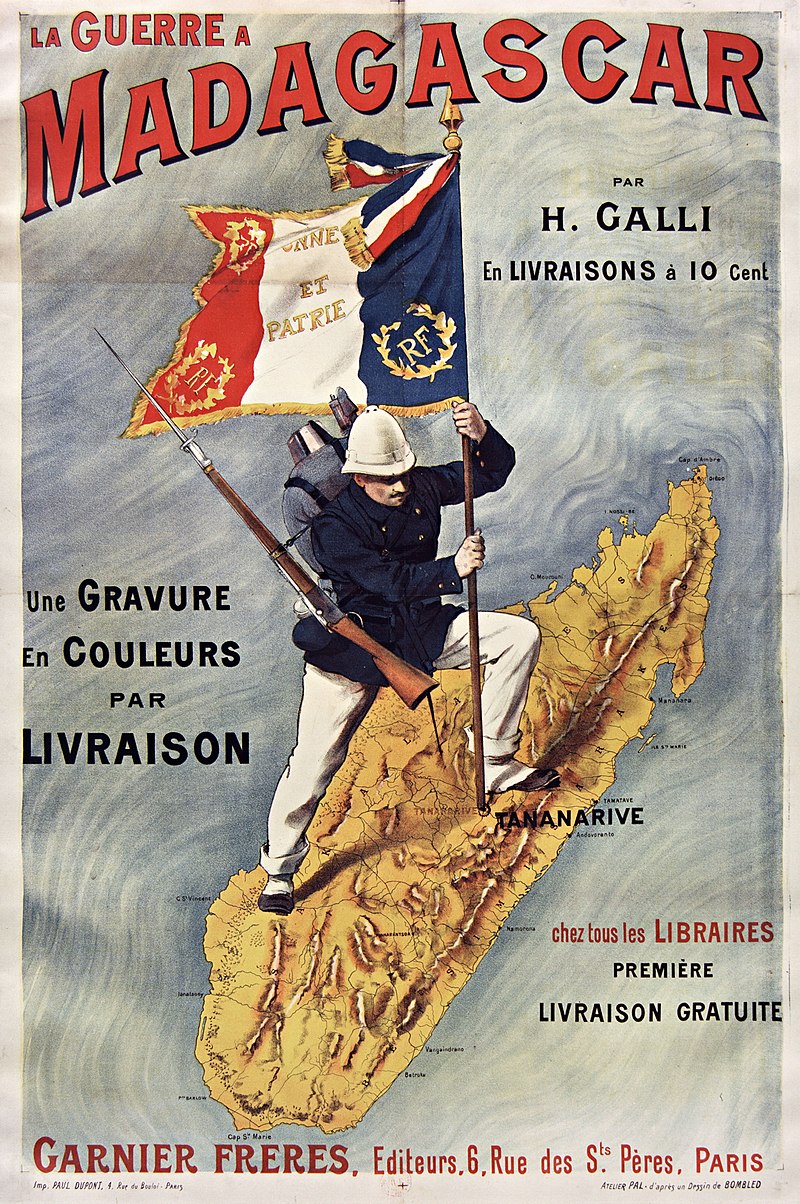 French poster about the "Madagascar War" French Republicans, at first hostile to empire, only became supportive when Germany started to build her own colonial empire. As it developed, the new empire took on roles of trade with France, supplying raw materials and purchasing manufactured items, as well as lending prestige to the motherland and spreading French civilization and language as well as Catholicism. It also provided crucial manpower in both World Wars.[84] It became a moral justification to lift the world up to French standards by bringing Christianity and French culture. In 1884 the leading exponent of colonialism, Jules Ferry declared France had a civilising mission: "The higher races have a right over the lower races, they have a duty to civilize the inferior".[85] Full citizenship rights – assimilation – were offered, although in reality assimilation was always on the distant horizon.[86] Contrasting from Britain, France sent small numbers of settlers to its colonies, with the only notable exception of Algeria, where French settlers nevertheless always remained a small minority. The French colonial empire of extended over 11,500,000 km2 (4,400,000 sq mi) at its height in the 1920s and had a population of 110 million people on the eve of World War II.[87][88] In World War II, Charles de Gaulle and the Free French used the overseas colonies as bases from which they fought to liberate France. However, after 1945 anti-colonial movements began to challenge the Empire. France fought and lost a bitter war in Vietnam in the 1950s. Whereas they won the war in Algeria, de Gaulle decided to grant Algeria independence anyway in 1962. French settlers and many local supporters relocated to France. Nearly all of France's colonies gained independence by 1960, but France retained great financial and diplomatic influence. It has repeatedly sent troops to assist its former colonies in Africa in suppressing insurrections and coups d'état.[89] Education policy French colonial officials, influenced by the revolutionary ideal of equality, standardized schools, curricula, and teaching methods as much as possible. They did not establish colonial school systems with the idea of furthering the ambitions of the local people, but rather simply exported the systems and methods in vogue in the mother nation.[90] Having a moderately trained lower bureaucracy was of great use to colonial officials.[91] The emerging French-educated indigenous elite saw little value in educating rural peoples.[92] After 1946 the policy was to bring the best students to Paris for advanced training. The result was to immerse the next generation of leaders in the growing anti-colonial diaspora centered in Paris. Impressionistic colonials could mingle with studious scholars or radical revolutionaries or so everything in between. Ho Chi Minh and other young radicals in Paris formed the French Communist party in 1920.[93] Tunisia was exceptional. The colony was administered by Paul Cambon, who built an educational system for colonists and indigenous people alike that was closely modeled on mainland France. He emphasized female and vocational education. By independence, the quality of Tunisian education nearly equalled that in France.[94] African nationalists rejected such a public education system, which they perceived as an attempt to retard African development and maintain colonial superiority. One of the first demands of the emerging nationalist movement after World War II was the introduction of full metropolitan-style education in French West Africa with its promise of equality with Europeans.[95][96] In Algeria, the debate was polarized. The French set up schools based on the scientific method and French culture. The Pied-Noir (Catholic migrants from Europe) welcomed this. Those goals were rejected by the Moslem Arabs, who prized mental agility and their distinctive religious tradition. The Arabs refused to become patriotic and cultured Frenchmen and a unified educational system was impossible until the Pied-Noir and their Arab allies went into exile after 1962.[97] In South Vietnam from 1955 to 1975 there were two competing powers in education, as the French continued their work and the Americans moved in. They sharply disagreed on goals. The French educators sought to preserving French culture among the Vietnamese elites and relied on the Mission Culturelle – the heir of the colonial Direction of Education – and its prestigious high schools. The Americans looked at the great mass of people and sought to make South Vietnam a nation strong enough to stop communism. The Americans had far more money, as USAID coordinated and funded the activities of expert teams, and particularly of academic missions. The French deeply resented the American invasion of their historical zone of cultural imperialism.[98] Germany Main article: German colonial empire 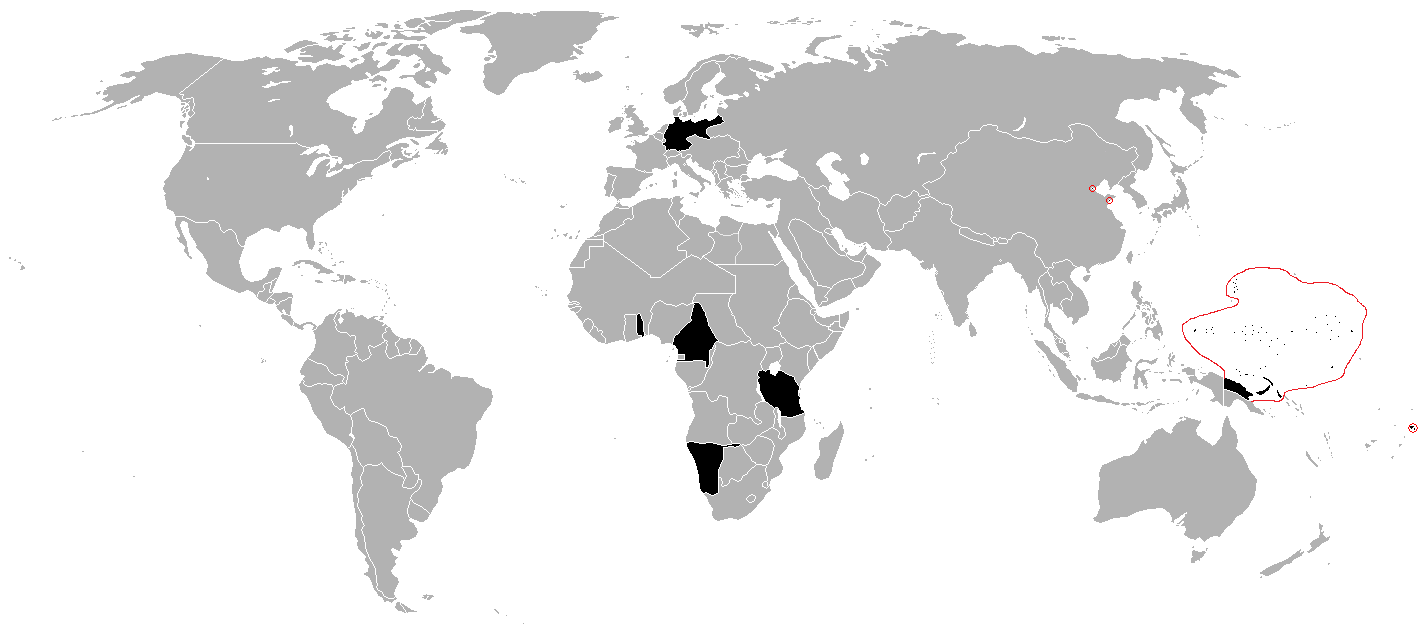 German colonial empire, the third largest colonial empire during the 19th century after the British and the French ones[99] German expansion into Slavic lands begins in the 12th–13th-century (see Drang Nach Osten). The concept of Drang Nach Osten was a core element of German nationalism and a major element of Nazi ideology. However, the German involvement in the seizure of overseas territories was negligible until the end of the 19th century. Prussia unified the other states into the second German Empire in 1871. Its Chancellor, Otto von Bismarck (1862–90), long opposed colonial acquisitions, arguing that the burden of obtaining, maintaining, and defending such possessions would outweigh any potential benefits. He felt that colonies did not pay for themselves, that the German bureaucratic system would not work well in the tropics and the diplomatic disputes over colonies would distract Germany from its central interest, Europe itself.[100] However, public opinion and elite opinion in Germany demanded colonies for reasons of international prestige, so Bismarck was forced to oblige. In 1883–84 Germany began to build a colonial empire in Africa and the South Pacific.[101][102] The establishment of the German colonial empire started with German New Guinea in 1884.[103] Within 25 years, German South West Africa had committed the Herero and Namaqua genocide in modern-day Namibia, the first genocide of the 20th century. German colonies included the present territories of in Africa: Tanzania, Rwanda, Burundi, Namibia, Cameroon, Ghana and Togo; in Oceania: New Guinea, Solomon Islands, Nauru, Marshall Islands, Mariana Islands, Caroline Islands and Samoa; and in Asia: Qingdao, Yantai and the Jiaozhou Bay. The Treaty of Versailles made them mandates temporarily operated by the Allied victors.[104] Germany also lost part of the Eastern territories that became part of independent Poland as a result of the Treaty of Versailles in 1919. Finally, the Eastern territories captured in the Middle Ages were torn from Germany and became part of Poland and the USSR as a result of the territorial reorganization established by the Potsdam Conference of the great powers in 1945. Italy Main article: Italian Empire 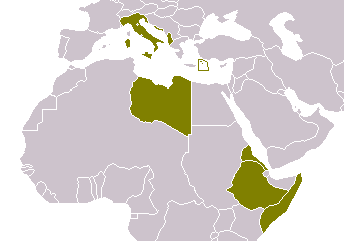 The Italian Empire in 1940 The Italian Empire (Impero italiano) comprised the overseas possessions of the Kingdom of Italy primarily in northeast Africa. It began with the purchase in 1869 of Assab Bay on the Red Sea by an Italian navigation company which intended to establish a coaling station at the time the Suez Canal was being opened to navigation.[105] This was taken over by the Italian government in 1882, becoming modern Italy's first overseas territory.[106] By the start of the First World War in 1914, Italy had acquired in Africa the colony of Eritrea on the Red Sea coast, a large protectorate and later colony in Somalia, and authority in formerly Ottoman Tripolitania and Cyrenaica (gained after the Italo-Turkish War) which were later unified in the colony of Libya. Outside Africa, Italy possessed the Dodecanese Islands off the coast of Turkey (following the Italo-Turkish War) and a small concession in Tianjin in China following the Boxer War of 1900. During the First World War, Italy occupied southern Albania to prevent it from falling to Austria-Hungary. In 1917, it established a protectorate over Albania, which remained in place until 1920.[107] The Fascist government that came to power with Benito Mussolini in 1922 sought to increase the size of the Italian empire and to satisfy the claims of Italian irredentists. In its second invasion of Ethiopia in 1935–36, Italy was successful and it merged its new conquest with its older east African colonies to create Italian East Africa. In 1939, Italy invaded Albania and incorporated it into the Fascist state. During the Second World War (1939–1945), Italy occupied British Somaliland, parts of south-eastern France, western Egypt and most of Greece, but then lost those conquests and its African colonies, including Ethiopia, to the invading allied forces by 1943. It was forced in the peace treaty of 1947 to relinquish sovereignty over all its colonies. It was granted a trust to administer former Italian Somaliland under United Nations supervision in 1950. When Somalia became independent in 1960, Italy's eight-decade experiment with colonialism ended.[108][109][page needed] Japan Main articles: Japanese colonial empire and List of territories occupied by Imperial Japan The Greater East Asia Co-Prosperity Sphere in 1942 Japanese Marines preparing to land in Anqing China in June 1938 For over 200 years, Japan maintained a feudal society during a period of relative isolation from the rest of the world. However, in the 1850s, military pressure from the United States and other world powers coerced Japan to open itself to the global market, resulting in an end to the country's isolation. A period of conflicts and political revolutions followed due to socioeconomic uncertainty, ending in 1868 with the reunification of political power under the Japanese Emperor during the Meiji Restoration. This sparked a period of rapid industrialization driven in part by a Japanese desire for self-sufficiency. By the early 1900s, Japan was a naval power that could hold its own against an established European power as it defeated Russia.[110] Despite its rising population and increasingly industrialized economy, Japan lacked significant natural resources. As a result, the country turned to imperialism and expansionism in part as a means of compensating for these shortcomings, adopting the national motto "Fukoku kyōhei" (富国強兵, "Enrich the state, strengthen the military").[111] And Japan was eager to take every opportunity. In 1869 they took advantage of the defeat of the rebels of the Republic of Ezo to incorporate definitely the island of Hokkaido to Japan. For centuries, Japan viewed the Ryukyu Islands as one of its provinces. In 1871 the Mudan incident happened: Taiwanese aborigines murdered 54 Ryūkyūan sailors that became shipwrecked. At that time the Ryukyu Islands were claimed by both Qing China and Japan, and the Japanese interpreted the incident as an attack on their citizens. They took steps to bring the islands in their jurisdiction: in 1872 the Japanese Ryukyu Domain was declared, and in 1874 a retaliatory incursion to Taiwan was sent, which was a success. The success of this expedition emboldened the Japanese: not even the Americans could defeat the Taiwanese in the Formosa Expedition of 1867. Very few gave it much thought at the time, but this was the first move in the Japanese expansionism series. Japan occupied Taiwan for the rest of 1874 and then left owing to Chinese pressures, but in 1879 it finally annexed the Ryukyu Islands. In 1875 Qing China sent a 300-men force to subdue the Taiwanese, but unlike the Japanese the Chinese were routed, ambushed and 250 of their men were killed; the failure of this expedition exposed once more the failure of Qing China to exert effective control in Taiwan, and acted as another incentive for the Japanese to annex Taiwan. Eventually, the spoils for winning the First Sino-Japanese War in 1894 included Taiwan.[112] 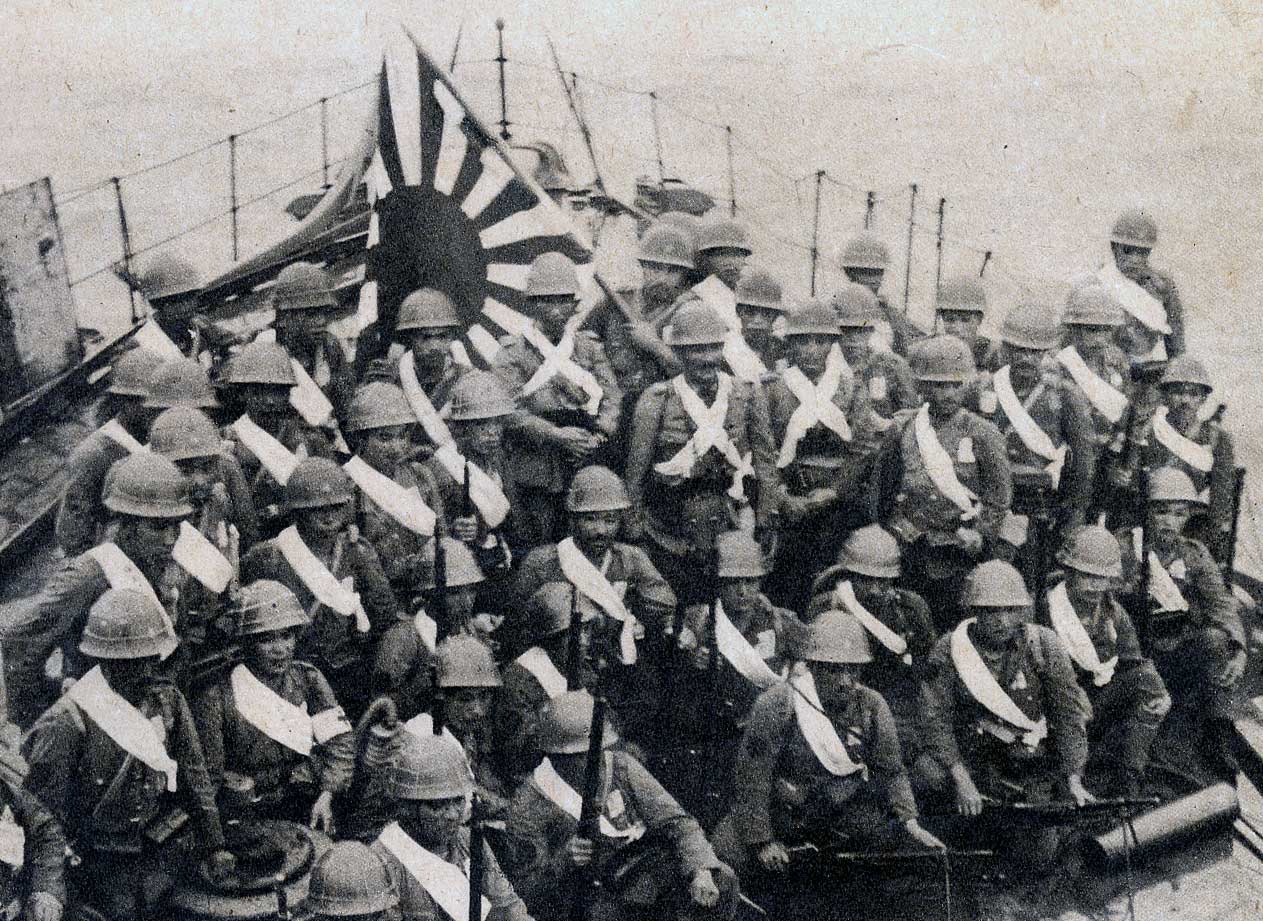 In 1875 Japan took its first operation against Joseon Korea, another territory that for centuries it coveted; the Ganghwa Island incident made Korea open to international trade. Korea was annexed in 1910. As a result of winning the Russo-Japanese War in 1905, Japan took part of Sakhalin Island from Russia. Precisely, the victory against the Russian Empire shook the world: never before had an Asian nation defeated a European power[dubious – discuss], and in Japan it was seen as a feat. Japan's victory against Russia would act as an antecedent for Asian countries in the fight against the Western powers for Decolonization. During World War I, Japan took German-leased territories in China's Shandong Province, as well as the Mariana, Caroline, and Marshall Islands, and kept the islands as League of nations mandates. At first, Japan was in good standing with the victorious Allied powers of World War I, but different discrepancies and dissatisfaction with the rewards of the treaties cooled the relations with them, for example American pressure forced it to return the Shandong area. By the '30s, economic depression, urgency of resources and a growing distrust in the Allied powers made Japan lean to a hardened militaristic stance. Through the decade, it would grow closer to Germany and Italy, forming together the Axis alliance. In 1931 Japan took Manchuria from China. International reactions condemned this move, but Japan's already strong skepticism against Allied nations meant that it nevertheless carried on.[113] 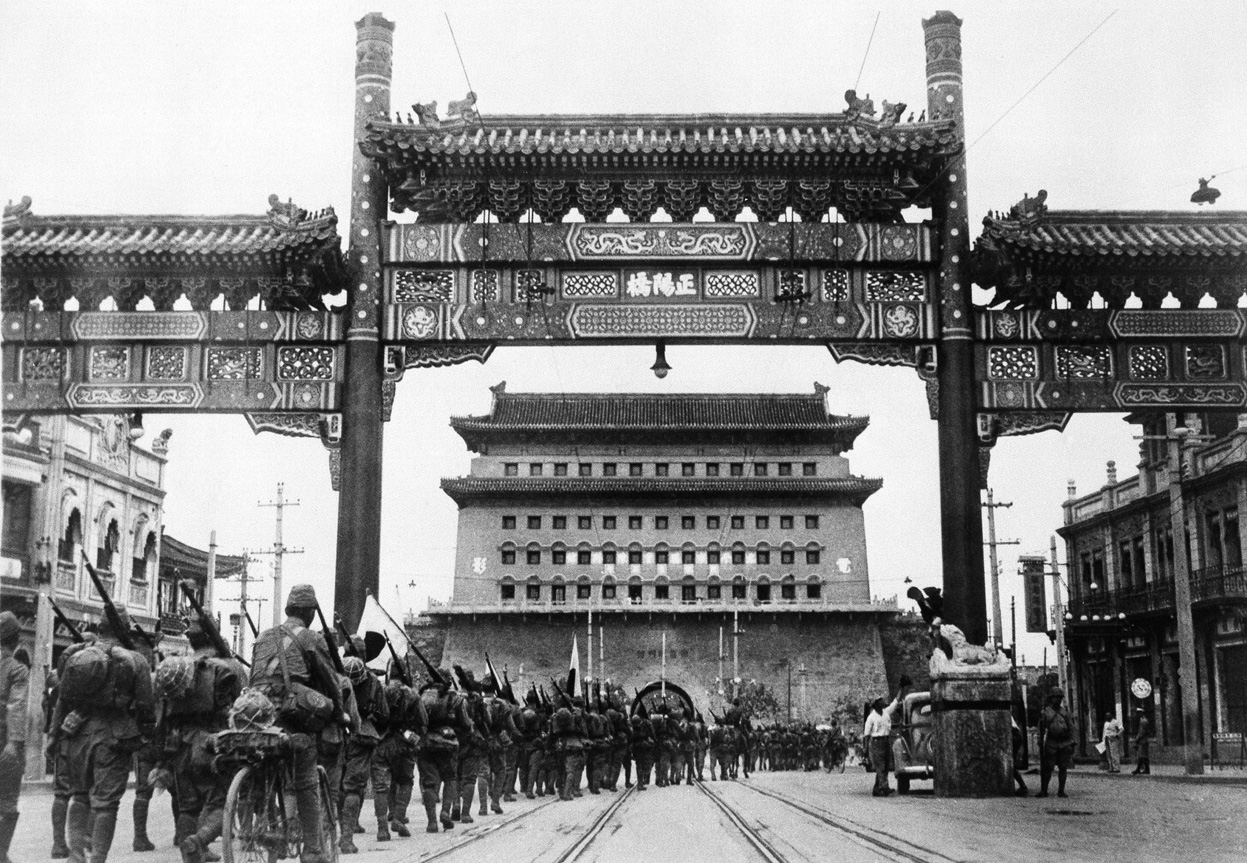 Japanese march into Zhengyangmen of Beijing after capturing the city in July 1937. During the Second Sino-Japanese War in 1937, Japan's military invaded central China. Also, in 1938–1939 Japan made an attempt to seize the territory of Soviet Russia and Mongolia, but suffered a serious defeats (see Battle of Lake Khasan, Battles of Khalkhin Gol). By now, relations with the Allied powers were at the bottom, and an international boycott against Japan to deprive it of natural resources was enforced. A military move to gain access to them was deemed necessary, and so Japan attacked Pearl Harbor, bringing the United States to World War II. Using its superior technological advances in naval aviation and its modern doctrines of amphibious and naval warfare, Japan achieved one of the fastest maritime expansions in history. By 1942 Japan had conquered much of East Asia and the Pacific, including the east of China, Hong Kong, Thailand, Vietnam, Cambodia, Burma (Myanmar), Malaysia, the Philippines, Indonesia, part of New Guinea and many islands of the Pacific Ocean. Just as Japan's late industrialization success and victory against the Russian Empire was seen as an example among underdeveloped Asia-Pacific nations, the Japanese took advantage of this and promoted among its conquered the goal to jointly create an anti-European "Greater East Asia Co-Prosperity Sphere". This plan helped the Japanese gain support from native populations during its conquests[citation needed] especially in Indonesia.[citation needed] However, the United States had a vastly stronger military and industrial base and defeated Japan, stripping it of conquests and returning its settlers back to Japan.[114] Netherlands Main article: Dutch Empire The most notable example of Dutch imperialism is regarding Indonesia. Ottoman Empire  Ottoman troops marching in Aleppo Main articles: Ottoman Empire and Territorial evolution of the Ottoman Empire The Ottoman Empire was an imperial state that lasted from 1299 to 1922. In 1453, Mehmed the Conqueror captured Constantinople and made it his capital. During the 16th and 17th centuries, in particular at the height of its power under the reign of Suleiman the Magnificent, the Ottoman Empire was a powerful multinational, multilingual empire, which invaded and colonized much of Southeast Europe, Western Asia, the Caucasus, North Africa, and the Horn of Africa. Its repeated invasions, and brutal treatment of Slavs led to the Great Migrations of the Serbs to escape persecution. At the beginning of the 17th century the empire contained 32 provinces and numerous vassal states. Some of these were later absorbed into the empire, while others were granted various types of autonomy during the course of centuries.[115] Following a long period of military setbacks against European powers, the Ottoman Empire gradually declined, losing control of much of its territory in Europe and Africa. 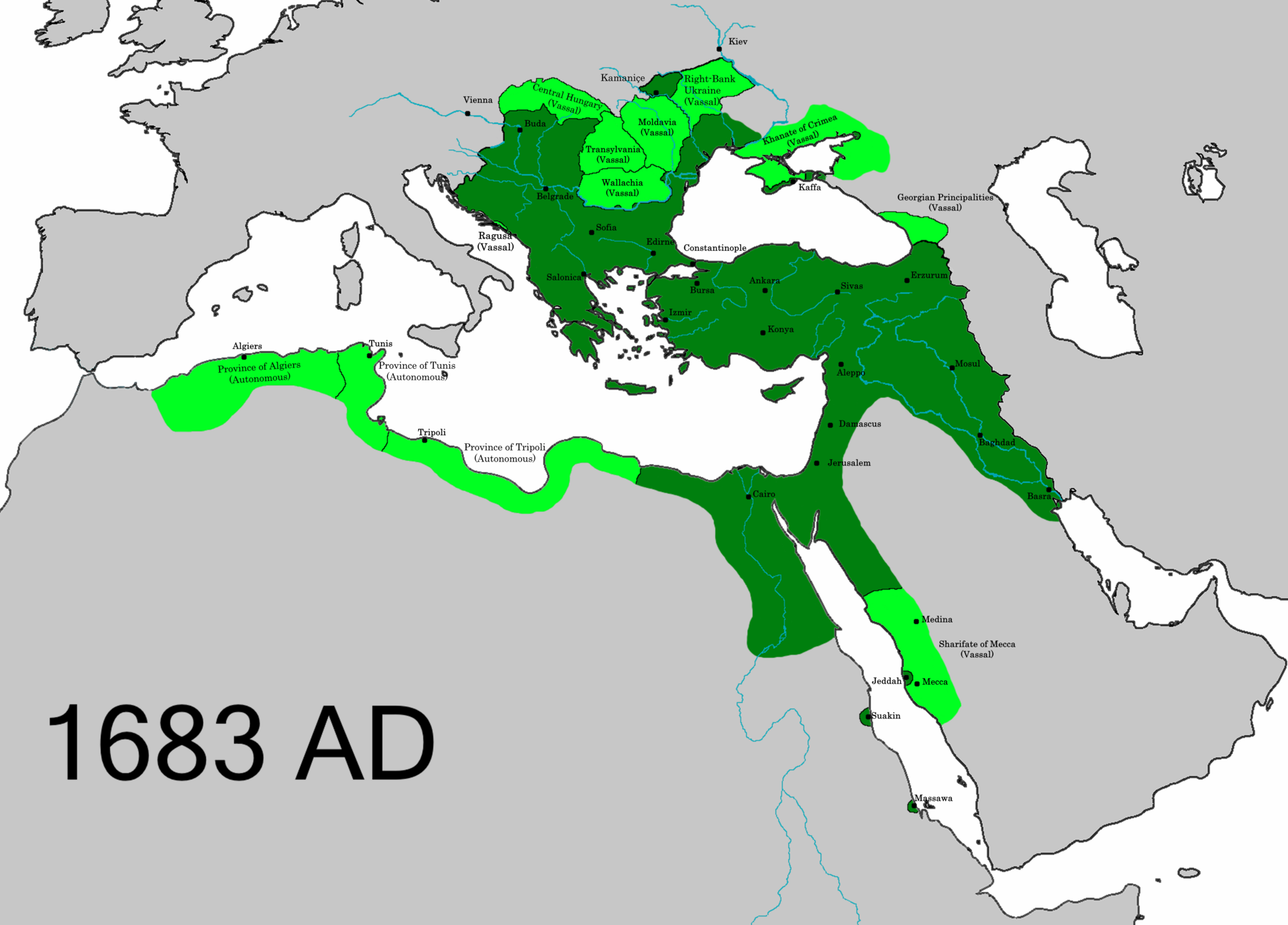 The Ottoman Empire in 1683; core possessions in dark green; vassal or autonomous areas in light green. By 1810 Egypt was effectively independent. In 1821–1829 the Greeks in the Greek War of Independence were assisted by Russia, Britain and France. In 1815 to 1914 the Ottoman Empire could exist only in the conditions of acute rivalry of the great powers, with Britain its main supporter, especially in the Crimean war 1853–1856, against Russia. After Ottoman defeat in the Russo-Turkish War (1877–1878), Bulgaria, Serbia and Montenegro gained independence and Britain took colonial control of Cyprus, while Bosnia and Herzegovina were occupied and annexed by Austro-Hungarian Empire in 1908. The empire allied with Germany in World War I with the imperial ambition of recovering its lost territories, but it dissolved in the aftermath of its decisive defeat. The Kemalist national movement, supported by Soviet Russia, achieved victory in the course of the Turkish War of Independence, and the parties signed and ratified the Treaty of Lausanne in 1923 and 1924. The Republic of Turkey was established.[116] Portugal Main article: Second Portuguese Empire 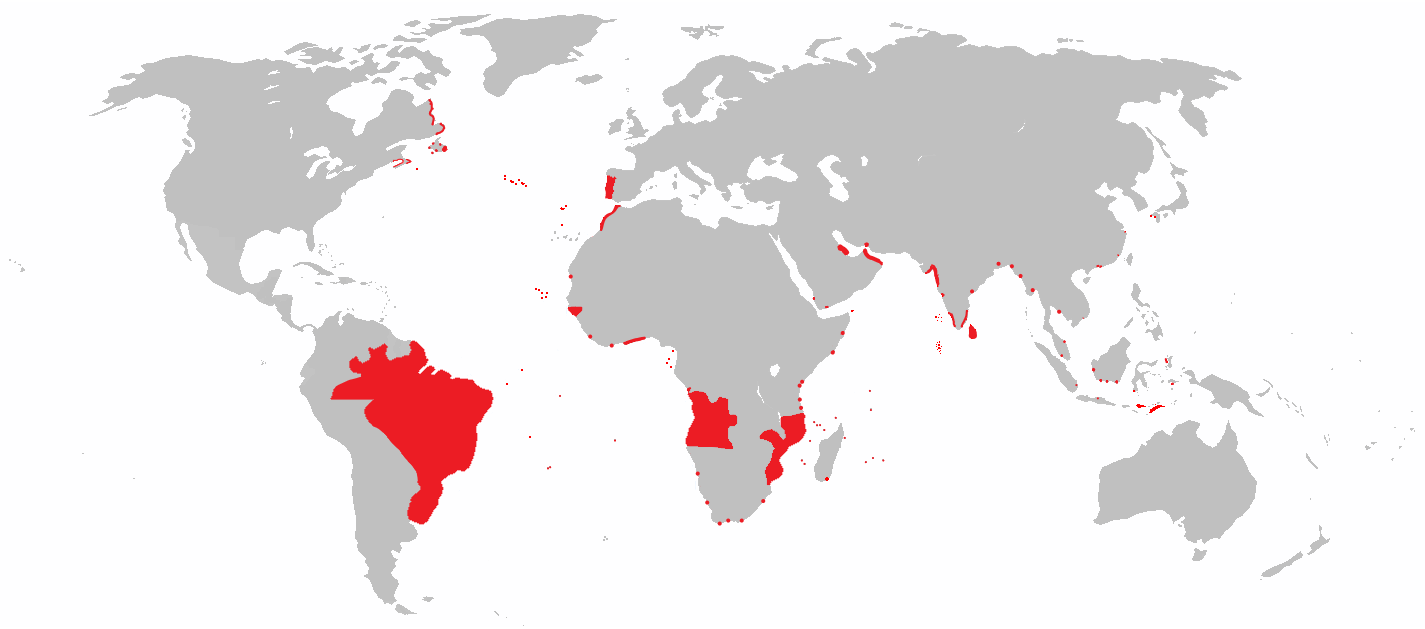 Areas across the world that were, at one point in their history, part of the Portuguese Empire Russia Main article: Russian imperialism Further information: Territorial evolution of Russia, Soviet empire, and Ruscism By the 18th century, the Russian Empire extended its control to the Pacific, peacefully forming a common border with the Qing Empire and Empire of Japan. This took place in a large number of military invasions of the lands east, west, and south of it. The Polish–Russian War of 1792 took place after Polish nobility from the Polish–Lithuanian Commonwealth wrote the Constitution of 3 May 1791. The war resulted in eastern Poland being conquered by Imperial Russia as a colony until 1918. The southern campaigns involved a series of Russo-Persian Wars, which began with the Persian Expedition of 1796, resulting in the acquisition of Georgia as a protectorate. Between 1800 and 1864, Imperial armies invaded south in the Russian conquest of the Caucasus, the Murid War, and the Russo-Circassian War. This last conflict led to the ethnic cleansing of Circassians from their lands. The Russian conquest of Siberia over the Khanate of Sibir took place in the 16th and 17th centuries, and resulted in the slaughter of various indigenous tribes by Russians, including the Daur, the Koryaks, the Itelmens, Mansi people and the Chukchi. The Russian colonization of Central and Eastern Europe and Siberia and treatment of the resident indigenous peoples has been compared to European colonization of the Americas, with similar negative impacts on the indigenous Siberians as upon the indigenous peoples of the Americas. The extermination of indigenous Siberian tribes was so complete that a relatively small population of only 180,000 are said to exist today. The Russian Empire exploited and suppressed Cossacks hosts during this period, before turning them into the special military estate Sosloviye in the late 18th century. Cossacks were then used in Imperial Russian campaigns against other tribes.[117] 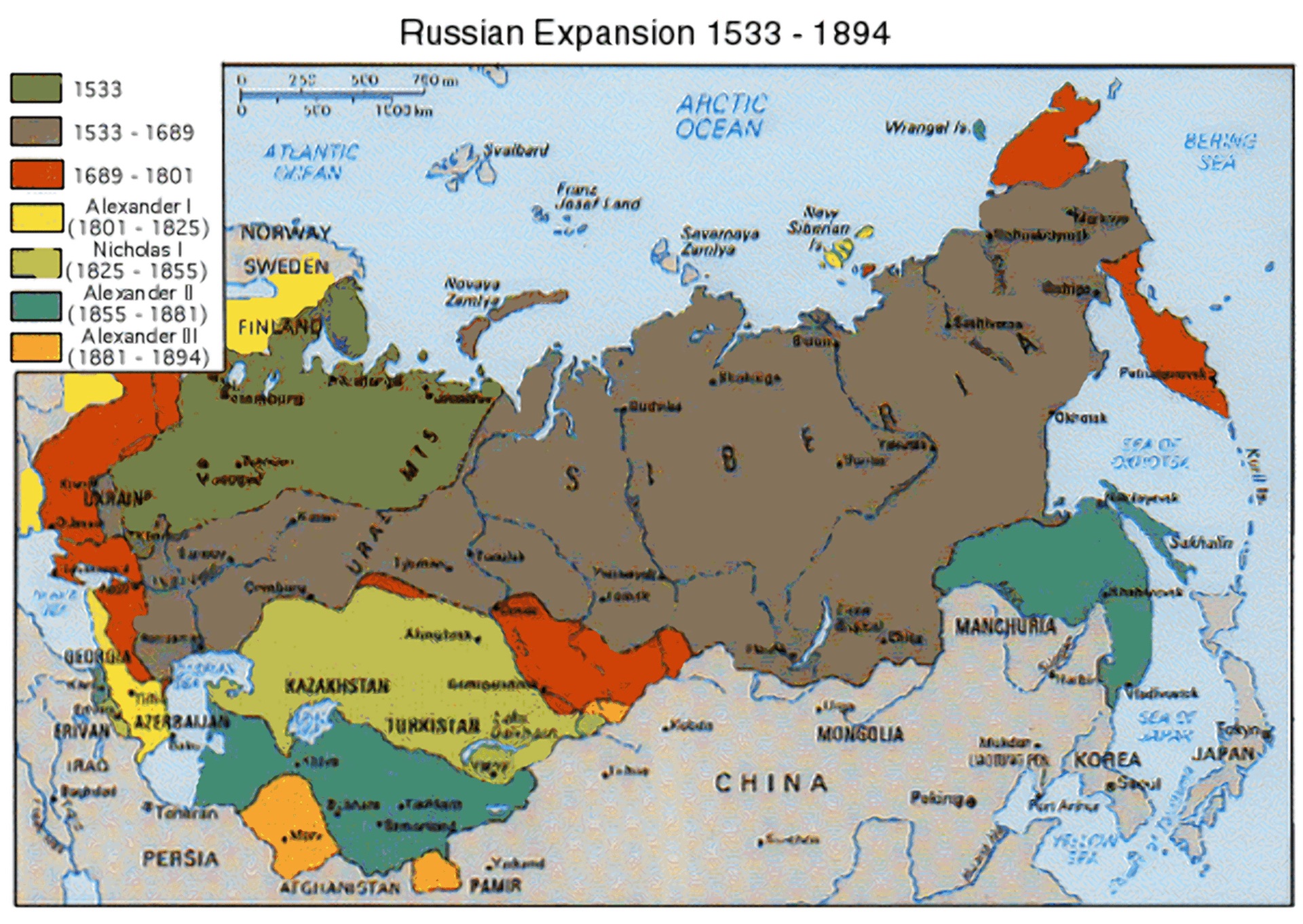 Russian expansion in Eurasia between 1533 and 1894 The acquisition of Ukraine by Russia commenced in 1654 with the Pereiaslav Agreement. Georgia's accession to Russia in 1783 was marked by the Treaty of Georgievsk. 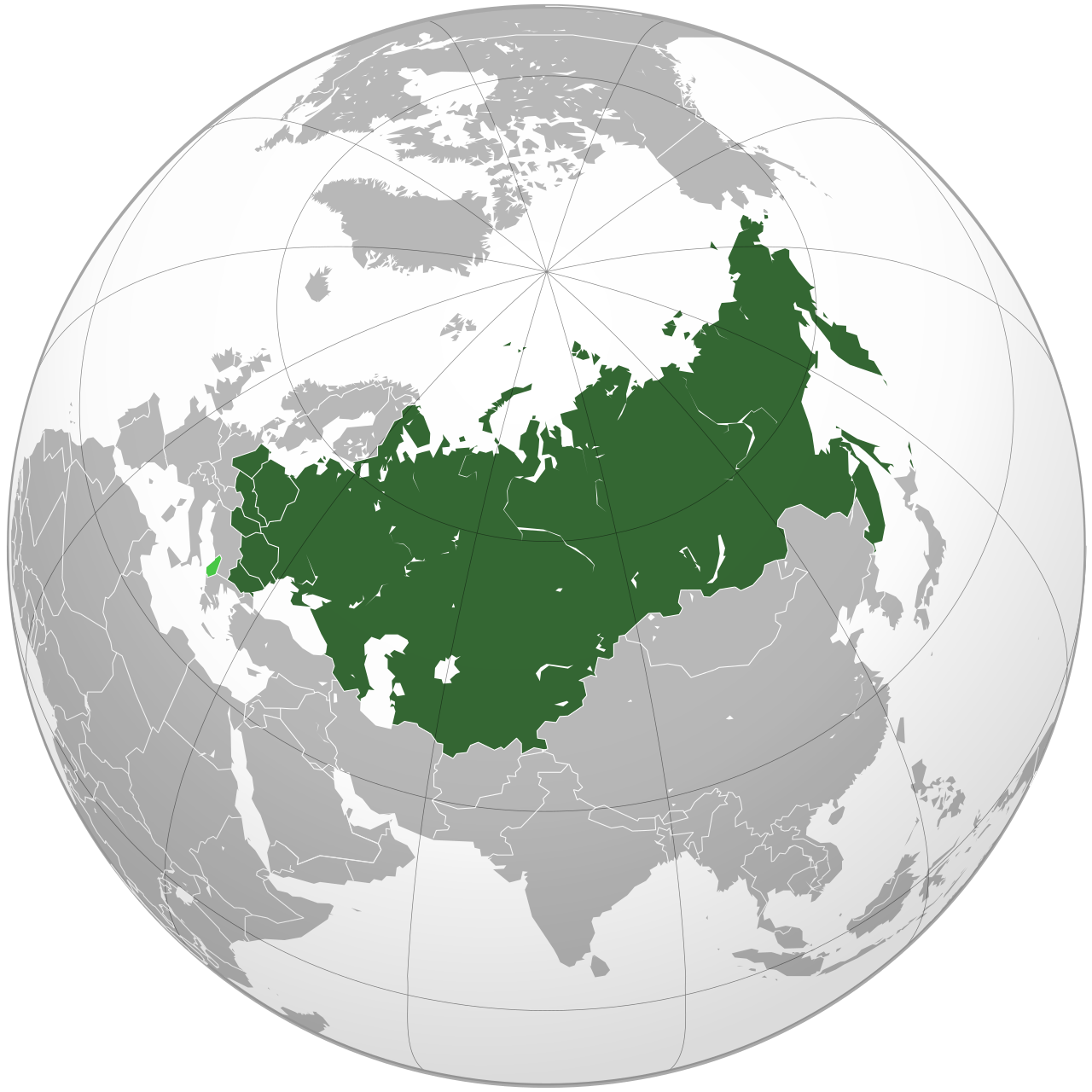 The countries of the Warsaw Pact, the main bloc of Soviet imperialism Bolshevik leaders had effectively reestablished a polity with roughly the same extent as that empire by 1921, however with an internationalist ideology: Lenin in particular asserted the right to limited self-determination for national minorities within the new territory.[118] Beginning in 1923, the policy of "Indigenization" [korenizatsiya] was intended to support non-Russians develop their national cultures within a socialist framework. Never formally revoked, it stopped being implemented after 1932[citation needed]. After World War II, the Soviet Union installed socialist regimes modeled on those it had installed in 1919–20 in the old Russian Empire, in areas its forces occupied in Eastern Europe.[119] The Soviet Union and later the People's Republic of China supported revolutionary and communist movements in foreign nations and colonies to advance their own interests, but were not always successful.[120] The USSR provided great assistance to Kuomintang in 1926–1928 in the formation of a unified Chinese government (see Northern Expedition). Although then relations with the USSR deteriorated, but the USSR was the only world power that provided military assistance to China against Japanese aggression in 1937–1941 (see Sino-Soviet Non-Aggression Pact). The victory of the Chinese Communists in the civil war of 1946–1949 relied on the great help of the USSR (see Chinese Civil War). 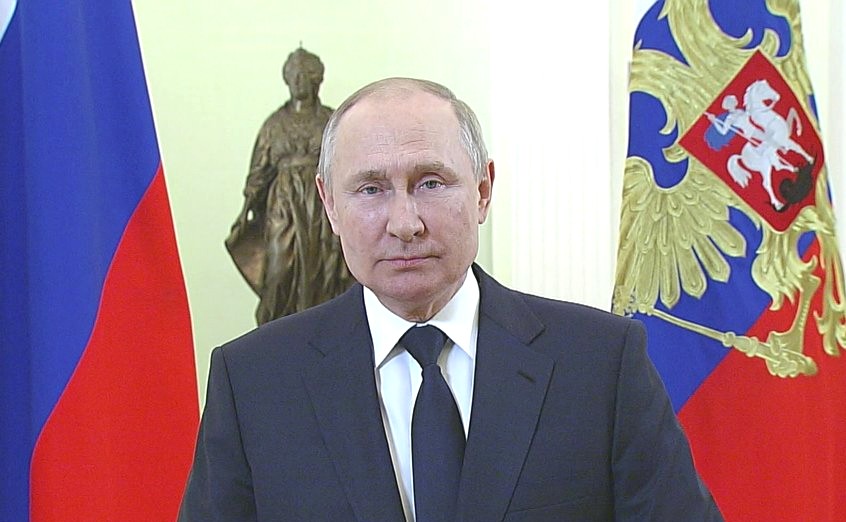 Russia's president Vladimir Putin compared himself to Peter the Great in an effort to regain the former Russian lands.[121] Trotsky, and others, believed that the revolution could only succeed in Russia as part of a world revolution. Lenin wrote extensively on the matter and famously declared that Imperialism was the highest stage of capitalism. However, after Lenin's death, Joseph Stalin established 'socialism in one country' for the Soviet Union, creating the model for subsequent inward looking Stalinist states and purging the early Internationalist elements. The internationalist tendencies of the early revolution would be abandoned until they returned in the framework of a client state in competition with the Americans during the Cold War. In the post-Stalin period in the late 1950s, the new political leader Nikita Khrushchev put pressure on the Soviet-American relations by starting a new wave of anti-imperialist propaganda. In his speech on the UN conference in 1960, he announced the continuation of the war on imperialism, stating that soon the people of different countries will come together and overthrow their imperialist leaders. Although the Soviet Union declared itself anti-imperialist, critics argue that it exhibited traits common to historic empires.[122][123][124] Some scholars hold that the Soviet Union was a hybrid entity containing elements common to both multinational empires and nation-states. Some also argued that the USSR practiced colonialism as did other imperial powers and was carrying on the old Russian tradition of expansion and control.[124] Mao Zedong once argued that the Soviet Union had itself become an imperialist power while maintaining a socialist façade. Moreover, the ideas of imperialism were widely spread in action on the higher levels of government. Josip Broz Tito and Milovan Djilas have referred to the Stalinist USSR's foreign policies, such as the occupation and economic exploitations of Eastern Europe and its aggressive and hostile policy towards Yugoslavia as Soviet imperialism.[125][126] Some Marxists within the Russian Empire and later the USSR, like Sultan Galiev and Vasyl Shakhrai, considered the Soviet regime a renewed version of the Russian imperialism and colonialism.[127] The crushing of the Hungarian Revolution of 1956 and Soviet–Afghan War have been cited as examples.[128][129][130] Contemporary Russian imperialism is seen by some in Russian-occupied territories.[131] United States Main article: American imperialism 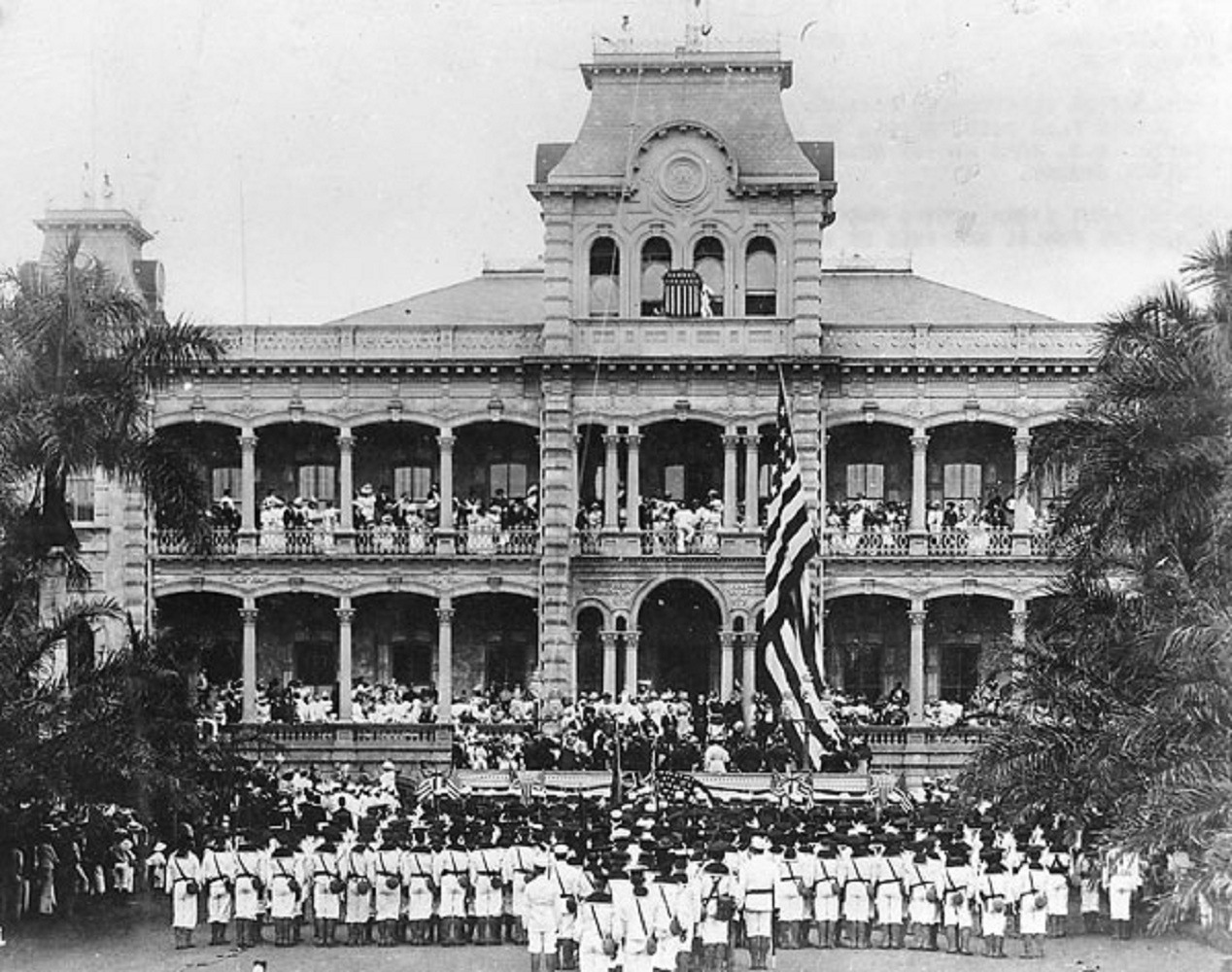 Ceremonies during the annexation of the Republic of Hawaii, 1898 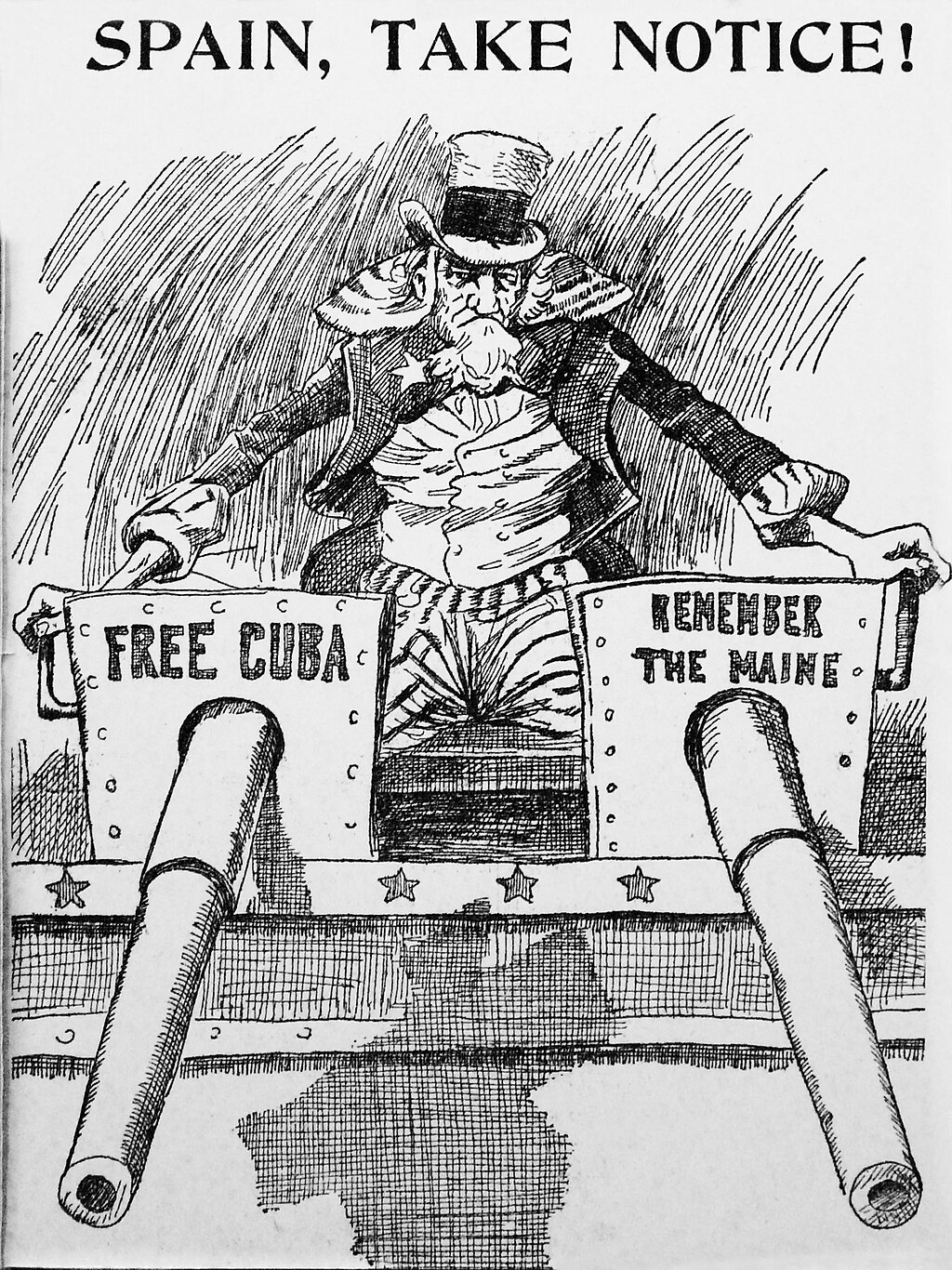 Cartoon of belligerent Uncle Sam placing Spain on notice, c. 1898 Made up of former colonies itself, the early United States expressed its opposition to Imperialism, at least in a form distinct from its own Manifest Destiny, through policies such as the Monroe Doctrine. However the US may have unsuccessfully attempted to capture Canada in the War of 1812. The United States achieved very significant territorial concessions from Mexico during the Mexican–American War. Beginning in the late 19th and early 20th century, policies such as Theodore Roosevelt's interventionism in Central America and Woodrow Wilson's mission to "make the world safe for democracy"[132] changed all this. They were often backed by military force, but were more often affected from behind the scenes. This is consistent with the general notion of hegemony and imperium of historical empires.[133][134] In 1898, Americans who opposed imperialism created the Anti-Imperialist League to oppose the US annexation of the Philippines and Cuba. One year later, a war erupted in the Philippines causing business, labor and government leaders in the US to condemn America's occupation in the Philippines as they also denounced them for causing the deaths of many Filipinos.[135] American foreign policy was denounced as a "racket" by Smedley Butler, a former American general who had become a spokesman for the far left.[136] At the start of World War II, President Franklin D. Roosevelt was opposed to European colonialism, especially in India. He pulled back when Britain's Winston Churchill demanded that victory in the war be the first priority. Roosevelt expected that the United Nations would take up the problem of decolonization.[137] Some have described the internal strife between various people groups as a form of imperialism or colonialism. This internal form is distinct from informal U.S. imperialism in the form of political and financial hegemony.[138] It also showed difference in the United States' formation of "colonies" abroad.[138] Through the treatment of its indigenous peoples during westward expansion, the United States took on the form of an imperial power prior to any attempts at external imperialism. This internal form of empire has been referred to as "internal colonialism".[139] Participation in the African slave trade and the subsequent treatment of its 12 to 15 million Africans is viewed by some to be a more modern extension of America's "internal colonialism".[140] However, this internal colonialism faced resistance, as external colonialism did, but the anti-colonial presence was far less prominent due to the nearly complete dominance that the United States was able to assert over both indigenous peoples and African-Americans.[141] In a lecture on April 16, 2003, Edward Said described modern imperialism in the United States as an aggressive means of attack towards the contemporary Orient stating that "due to their backward living, lack of democracy and the violation of women's rights. The western world forgets during this process of converting the other that enlightenment and democracy are concepts that not all will agree upon".[142] Spain 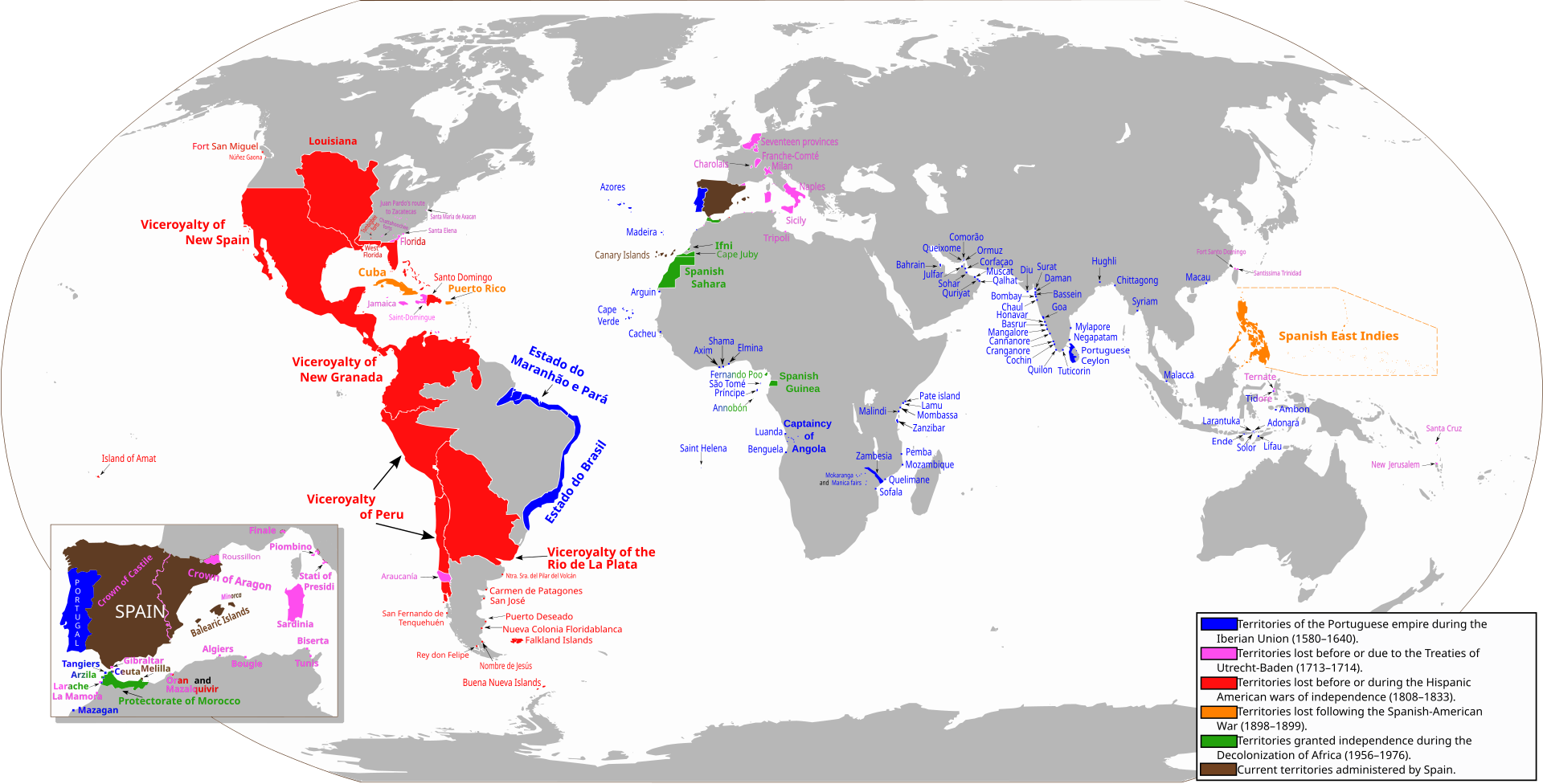 The areas of the world that at one time were territories of the Spanish Empire Main article: Spanish Empire Spanish imperialism in the colonial era corresponds with the rise and decline of the Spanish Empire, conventionally recognized as emerging in 1402 with the conquest of the Canary Islands. Following the successes of exploratory maritime voyages conducted during the Age of Discovery, Spain committed considerable financial and military resources towards developing a robust navy capable of conducting large-scale, transatlantic expeditionary operations in order to establish and solidify a firm imperial presence across large portions of North America, South America, and the geographic regions comprising the Caribbean basin. Concomitant with Spanish endorsement and sponsorship of transatlantic expeditionary voyages was the deployment of Conquistadors, which further expanded Spanish imperial boundaries through the acquisition and development of territories and colonies.[143] Imperialism in the Caribbean basin 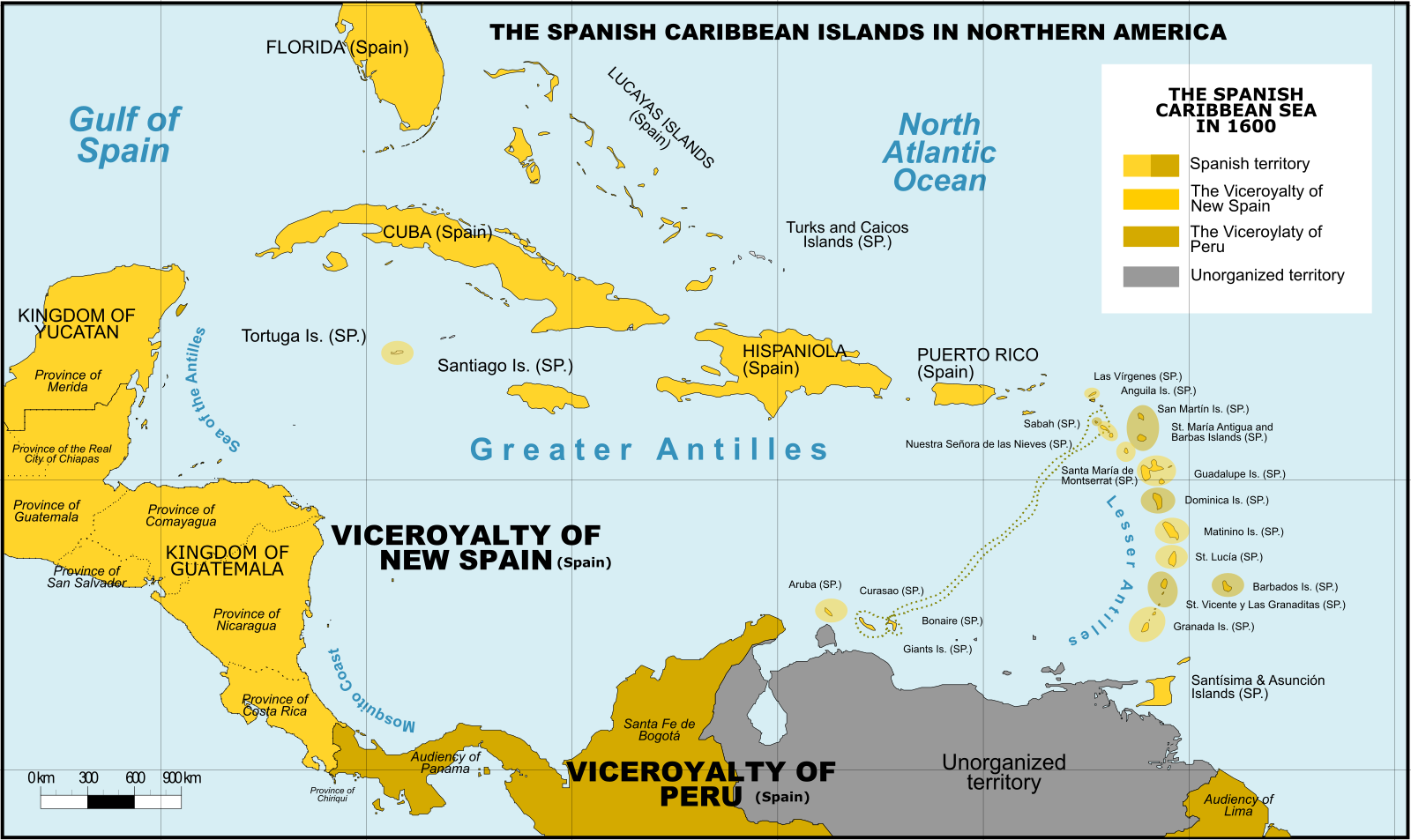 Spanish colonies and territories in the Caribbean basin (c. 1490 – c. 1660) In congruence with the colonialist activities of competing European imperial powers throughout the 15th – 19th centuries, the Spanish were equally engrossed in extending geopolitical power. The Caribbean basin functioned as a key geographic focal point for advancing Spanish imperialism. Similar to the strategic prioritization Spain placed towards achieving victory in the conquests of the Aztec Empire and Inca Empire, Spain placed equal strategic emphasis on expanding the nation's imperial footprint within the Caribbean basin. Echoing the prevailing ideological perspectives regarding colonialism and imperialism embraced by Spain's European rivals during the colonial era, including the English, French, and the Dutch, the Spanish used colonialism as a means of expanding imperial geopolitical borders and securing the defense of maritime trade routes in the Caribbean basin. While leveraging colonialism in the same geographic operating theater as its imperial rivals, Spain maintained distinct imperial objectives and instituted a unique form of colonialism in support of its imperial agenda. Spain placed significant strategic emphasis on the acquisition, extraction, and exportation of precious metals (primarily gold and silver). A second objective was the evangelization of subjugated indigenous populations residing in mineral-rich and strategically favorable locations. Notable examples of these indigenous groups include the Taίno populations inhabiting Puerto Rico and segments of Cuba. Compulsory labor and slavery were widely institutionalized across Spanish-occupied territories and colonies, with an initial emphasis on directing labor towards mining activity and related methods of procuring semi-precious metals. The emergence of the Encomienda system during the 16th–17th centuries in occupied colonies within the Caribbean basin reflects a gradual shift in imperial prioritization, increasingly focusing on large-scale production and exportation of agricultural commodities. Scholarly debate and controversy The scope and scale of Spanish participation in imperialism within the Caribbean basin remains a subject of scholarly debate among historians. A fundamental source of contention stems from the inadvertent conflation of theoretical conceptions of imperialism and colonialism. Furthermore, significant variation exists in the definition and interpretation of these terms as expounded by historians, anthropologists, philosophers, and political scientists. Among historians, there is substantial support in favor of approaching imperialism as a conceptual theory emerging during the 18th–19th centuries, particularly within Britain, propagated by key exponents such as Joseph Chamberlain and Benjamin Disraeli. In accordance with this theoretical perspective, the activities of the Spanish in the Caribbean are not components of a preeminent, ideologically driven form of imperialism. Rather, these activities are more accurately classified as representing a form of colonialism. Further divergence among historians can be attributed to varying theoretical perspectives regarding imperialism that are proposed by emerging academic schools of thought. Noteworthy examples include cultural imperialism, whereby proponents such as John Downing and Annabelle Sreberny-Modammadi define imperialism as "...the conquest and control of one country by a more powerful one."[144] Cultural imperialism signifies the dimensions of the process that go beyond economic exploitation or military force." Moreover, colonialism is understood as "...the form of imperialism in which the government of the colony is run directly by foreigners."[145] In spite of diverging perspectives and the absence of a unilateral scholarly consensus regarding imperialism among historians, within the context of Spanish expansion in the Caribbean basin during the colonial era, imperialism can be interpreted as an overarching ideological agenda that is perpetuated through the institution of colonialism. In this context, colonialism functions as an instrument designed to achieve specific imperialist objectives. Sweden Main article: Swedish overseas colonies |
反帝国主義 詳細は「反帝国主義」を参照 [icon] この節は拡大が必要である。 あなたはそれを追加することで手助けができる。 (2020年6月) 反帝国主義は、第二次世界大戦後および冷戦の初期に、ヨーロッパ列強の植民地における政治運動が国家主権を推進したことにより、広く普及した。アメリカ合 衆国に反対する反帝国主義グループの中には、ゲバリズムのようにソビエト連邦の権力を支持するものもあったが、毛沢東主義ではこれを社会帝国主義として批 判した。 汎アフリカ主義運動 汎アフリカ主義は、アフリカ諸国を分裂させ、互いに敵対させる帝国主義の考え方に対抗して生まれた、アフリカおよび世界的な運動である。汎アフリカ主義運 動は、アフリカ人を団結させ、アフリカ全土の人々の間に同胞意識を生み出すことで、こうした考え方を覆そうとした。汎アフリカ主義運動は、アフリカにおけ る植民地主義の終焉に貢献した。 1900年のパン・アフリカ会議の代表者たちは、植民地化されたアフリカ諸国に対して穏健な改革を要求した。[61] 会議ではカリブ海地域やアメリカ合衆国におけるアフリカ系住民とその権利についても議論された。合計6回のパン・アフリカ会議が開催され、植民地支配の終 結に向けてアフリカの人々が発言する機会が与えられた。 国ごとの帝国主義 ローマ 詳細は「ローマ帝国」を参照 [icon] この節は拡大が必要である。 あなたはそれを追加することで手助けできる。 (2021年4月)  西暦117年頃のローマ帝国の属州 ローマ帝国は古代ローマの共和政後期に当たる。 政治体制としては、地中海を囲むヨーロッパ、北アフリカ、西アジアの広大な領土を皇帝が支配していた。 アラビア 詳細は:初期イスラム教徒の征服、インド亜大陸におけるイスラム教徒の征服 [icon] この節は拡張が必要である。追加してくださる協力者を求めている。(2020年4月) ベルギー 詳細は「ベルギー帝国」を参照 [icon] この節は拡張が必要である。 あなたはそれを追加することで手助けできる。 (2020年4月) イギリス 詳細は「大英帝国の歴史記述」および「大英帝国」を参照  ティプー・スルタンはナポレオン・ボナパルトの同盟者であり、スリランガパトナ包囲戦でイギリス東インド会社の軍と対峙し、そこで殺された。  ボーア戦争の結果、1902年にボーア共和国は大英帝国に併合された。 イングランド イングランドの帝国主義的野望は、16世紀にはすでに存在しており、1530年代にはチューダー朝によるアイルランド征服が始まっている。1599年には 英国東インド会社が設立され、翌年にはエリザベス女王から特許状が交付された。[17]:174 インドに貿易拠点を設けたことで、英国はすでにインドに貿易拠点を設けていたポルトガルなどの帝国と比較して優位に立つことができた。[17]:174 スコットランド 1621年から1699年の間、スコットランド王国はアメリカ大陸にいくつかの植民地を認可した。これらの植民地のほとんどは、さまざまな理由により、すぐに閉鎖されたり、崩壊したりした。 イギリス 1707年の合同法により、イングランド王国とスコットランド王国が統合され、両国の植民地はまとめてグレートブリテン(別名、イギリス)の植民地となっ た。大英帝国が築き上げた帝国は、領土面積と人口の両面において、世界史上最大の帝国であった。軍事力と経済力の両面において、その強大さは数十年にわ たって比類のないものであった。 1767年、マイソール戦争やその他の政治活動により、東インド会社が搾取され、現地経済が荒廃し、同社は倒産寸前にまで追い込まれた。[62] 1670年までに、 帝国主義的野望は十分に満たされていた。バージニア、マサチューセッツ、バミューダ、ホンジュラス、アンティグア、バルバドス、ジャマイカ、ノバスコシア に植民地を持っていたからだ。[62] ヨーロッパ諸国の広大な帝国主義的野望により、イギリスはフランスと幾度となく衝突した。この競争は、現在カナダとして知られている地域の植民地化に顕著 に現れた。フランスがセントローレンス川沿いに植民地を建設し、「ヌーベルフランス」と主張する一方で、ジョン・カボットはニューファンドランドをイギリ スの領土と主張した。[63] イギリスは、ニュージーランドやオーストラリアなどの国々を植民地化することで、その領土を拡大し続けた。。 それらの国々には独自の住民と文化があったため、土地は空っぽではなかった。[17]:175 英国の民族主義運動は、国民としてのアイデンティティを共有する英連邦諸国の創設に顕著に表れていた。[17]:147 初期の産業化に続いて、「第一次」大英帝国は重商主義を基盤とし、主に北米、カリブ海地域、インドに植民地と領土を保有していた。その成長は、1776年 のアメリカ植民地の喪失によって逆転した。英国は、インドやオーストラリアで相殺するほどの利益を上げ、1820年頃にスペインやポルトガルの植民地が独 立した後には、ラテンアメリカにおける貿易や金融を支配することで非公式な経済帝国を築いた。 イギリスは自由貿易政策を採択し、世界貿易の大部分で優位に立つことに成功した。[65] アメリカに最初の帝国を奪われた後、イギリスはアジア、アフリカ、太平洋地域に目を向けた。1815年のナポレオン・フランスの敗北後、イギリスはほぼ無 敵の優位を誇る1世紀を享受し、帝国領を世界中に拡大した。海での覇権を握った英国の支配は、後に「パックス・ブリタニカ(大英帝国の平和)」と呼ばれる ようになった。これは、ヨーロッパと世界が相対的に平和だった時代(1815年~1914年)であり、この時代に大英帝国は世界の覇権を握り、世界の警察 官としての役割を担うようになった。しかし、この平和は主にヨーロッパから見たものであり、この時代にもほぼ途切れることなく植民地戦争や紛争が続いた。 インド征服、メフメト・アリに対する介入、英緬戦争、クリミア戦争、アヘン戦争、アフリカの争奪戦など、最も注目すべき紛争を挙げると、この世紀を通じて ヨーロッパが主導した世界征服において、英国が主導権を握るために十分な軍事力を動員した。  1956年11月5日、エジプトに対するイギリスとフランスの最初の攻撃を受けたスエズ運河の石油タンクから煙が上がる。 19世紀初頭、産業革命がイギリスを変え始めた。1851年の大博覧会までに、その国は「世界の工場」と評されるようになった。[70] 大英帝国はインド、アフリカの大部分、そして世界中の多くの地域を含むまでに拡大した。自国の植民地に対する正式な支配に加えて、世界貿易の多くを支配し ていたイギリスは、アジアやラテンアメリカなど多くの地域の経済を事実上支配していた。[71][72] 国内では、政治的な態度は自由貿易と自由放任主義、そして選挙権の段階的な拡大を支持していた。この世紀の間、人口は劇的な速度で増加し、急速な都市化を 伴い、社会と経済に大きな圧力がかかった。[73] 新たな市場と原材料の供給源を求めて、ディズレーリ率いる保守党はエジプト、南アフリカ、その他の地域で帝国主義的拡大政策を開始した。カナダ、オースト ラリア、ニュージーランドは自治領となった。[74][75]  1921年の領土的ピーク時の大英帝国の地図 19世紀後半には、アフリカの争奪戦とアジアおよび中東での大幅な領土拡大により、復活を遂げた。イギリスの帝国主義の精神は、ジョゼフ・チェンバレンや ローズベリー卿によって表明され、アフリカではセシル・ローズによって実行された。この時期、社会ダーウィニズムや人種理論といった疑似科学がイデオロ ギーの基盤となり、正当化の根拠となった。その他の有力なスポークスマンとしては、クロマー卿、カーゾン卿、キッネガー将軍、ミルナー卿、作家のラドヤー ド・キップリングなどがいた。[76] 第1次ボーア戦争の後、南アフリカ共和国とオレンジ自由国はイギリスによって承認されたが、第2次ボーア戦争の後、最終的には再併合された。しかし、プロ イセン王国によって建国されたドイツ統一国家がイギリスの優位に対する脅威となりつつあったため、イギリスの勢力は衰退しつつあった。1913年当時、イ ギリスの経済規模はアメリカ、ロシア、ドイツに次いで世界第4位であった。 1919年から1921年にかけての「アイルランド独立戦争」は、アイルランド自由国の建国につながった。しかし、国際連盟の委任統治領として、イギリス は旧ドイツ領やオスマン帝国領の植民地を支配下に置いた。これにより、エジプトからビルマにかけて、またカイロからケープタウンにかけて、イギリスは事実 上、途切れることなく領土を支配することとなった。しかし、この時代は、植民地の人々が戦争で得た新たな経験や、ナショナリズムに基づく独立運動が台頭し た時代でもあった。 第二次世界大戦は、特に財政面において、英国の世界における地位を決定的に弱体化させた。帝国のほぼ全域で脱植民地化運動が起こり、その結果、1947年 にインドが独立し、分割統治され、1949年には自治領が帝国から離脱し、1950年代には独立国家が樹立された。1956年のスエズ動乱では、英国の帝 国主義はエジプトにおいてその脆弱性を露呈した。しかし、第二次世界大戦後にアメリカ合衆国とソビエト連邦が唯一の超大国として台頭したことにより、英国 の世界的な大国としての役割は著しく急速に衰退した。 カナダ  ウェストミンスター寺院の窓に描かれたドナルド・スミス、ストラスクナおよびマウント・ロイヤル第1代男爵、偉大なカナダの帝国主義者および慈善家 ドナルド・スミス、ストラスクナおよびマウント・ロイヤル第1代男爵、「偉大なカナダの帝国主義者および慈善家」 カナダでは、「帝国主義」(および関連用語「植民地主義」)は19世紀以来、さまざまな矛盾した意味を持つようになった。19世紀後半から20世紀初頭に かけて、「帝国主義者」であるということは、カナダを独立した国家ではなく、英国の一部として考えることを意味していた。[78] 同じ概念を表す古い言葉としては、「ロイヤリズム」や「ユニオニズム」があり、それらは引き続き使用されていた。20世紀半ばのカナダでは、「帝国主義」 や「植民地主義」という言葉は、英語圏のカナダ人の議論では、代わりにカナダをアメリカ合衆国による経済的・文化的浸透の犠牲者として描くために使われ た。[79] 20世紀のフランス系カナダ人の議論では、「帝国主義者」とはフランス語話者やケベック州を弾圧するカナダを含むアングロサクソン諸国すべてを指してい た。21世紀初頭までに、「植民地主義」という言葉は、イギリス統治時代から受け継がれたカナダの先住民に対する態度や行動を強調するために使われるよう になった。 中国  1820年頃の清帝国は、清がこれらの地域を支配し始めた時期を指す。 詳細は「中国帝国主義」を参照 関連項目:内アジアの唐、内アジアの元、内アジアの清  秦王朝下の中国の拡大の地図 中国は世界最古の帝国の一つである。帝国主義的拡張の長い歴史により、中国は近隣諸国から、その膨大な人口、巨大な経済、強大な軍事力、そして歴史を通じ ての領土拡大により脅威とみなされてきた。秦王朝による中国の統一に始まり、その後の中国の王朝は、その拡張形態を踏襲し続けた。 領土拡大の観点で最も成功した中国帝国は、漢、唐、元、清の各王朝である。 デンマーク 詳細は「デンマーク領海外領土」を参照 デンマーク・ノルウェー(1814年以降はデンマーク)は、1536年から1953年まで海外領土を保有していた。最盛期には、ヨーロッパ、北アメリカ、 アフリカ、アジアの4大陸に植民地を有していた。17世紀、スカンディナヴィア半島での領土喪失後、デンマーク・ノルウェーは西アフリカ、カリブ海、イン ド亜大陸に植民地、砦、貿易拠点を建設し始めた。クリスチャン4世は、ヨーロッパを席巻していた重商主義の波に乗って、デンマーク・ノルウェーの海外貿易 を拡大する政策を最初に始めた。デンマーク・ノルウェーの最初の植民地は、1620年にインドの南岸に建設されたトランケーバルである。提督オーヴェ・ イェッデが率いる遠征隊が植民地を建設した。1814年にノルウェーがスウェーデンに割譲された後、デンマークはノルウェーの中世の植民地保有の残存部分 を維持した。小さな植民地は次々と失われたり売却されたりした。トランケーバルは1845年にイギリスに売却された。アメリカ合衆国は1917年にデン マーク領西インド諸島を購入した。アイスランドは1944年に独立した。現在、唯一残っている痕跡は、もともとノルウェー領であった2つの植民地、デン マーク領内のフェロー諸島とグリーンランドのみである。フェロー諸島は1948年までデンマークの県であり、グリーンランドの植民地としての地位は 1953年に消滅した。現在、両地域は自治領となっている。[81] フランス 詳細は「フランスの植民地帝国」を参照  フランス領土の地図(水色が第1帝国、紺色が第2帝国 16世紀、フランスによるアメリカ大陸の植民地化はヌーベルフランス(新フランス)の建設から始まった。17世紀には、フランス東インド会社の貿易拠点が アフリカとアジアに建設された。フランスは1534年から1814年まで「第一次植民地帝国」を築き、その領土にはヌーベルフランス(カナダ、アカディ ア、ニューファンドランド、ルイジアナ)、フランス領西インド諸島(サン・ドマング、グアドループ島、マルティニーク)、フランス領ギアナ、セネガル(ゴ レ島)、マスカリン諸島(モーリシャス島、レユニオン)、フランス領インドが含まれていた。 1830年のアルジェ占領に始まる「第二の植民地帝国」は、1962年のアルジェリア独立付与をもってほぼ終焉を迎えた。[82] フランス帝国の歴史は、大小さまざまな戦争の歴史であり、また、世界大戦における植民地出身者のフランス本国への多大な貢献の歴史でもあった。[83] フランスは1830年にアルジェリアを支配下に置いたが、1850年以降、本格的に世界規模の帝国再建に乗り出し、主に北アフリカと西アフリカ(フランス 領北アフリカ、フランス領西アフリカ、フランス領赤道アフリカ)および東南アジア(フランス領インドシナ)に集中し、さらに南太平洋(ニューカレドニア、 フランス領ポリネシア)でも征服を行った。フランスは1838年から1839年、および1861年から1867年の2度にわたってメキシコを植民地化しよ うとした(「ペストリー戦争」および「フランスによるメキシコ再介入」を参照)。  「マダガスカル戦争」に関するフランスのポスター 当初は帝国に敵対的だったフランス共和国も、ドイツが独自の植民地帝国を築き始めたときに初めて支持に転じた。発展するにつれ、この新しい帝国はフランス との貿易の役割を担い、原材料の供給や製造品の購入を行うとともに、本国に威信をもたらし、フランス文明やフランス語、カトリックを広めた。また、両世界 大戦において重要な人的資源を提供した。[84] キリスト教とフランス文化を広めることで、世界をフランスの基準に引き上げるという道徳的な正当性が生まれた。1884年、植民地主義の主唱者ジュール・ フェリーは、フランスには文明化の使命があると宣言した。「高等な人種には劣等人種に対する権利があり、彼らには劣等人種を文明化する義務がある」と述べ た。[85] 完全な市民権、すなわち同化が提供されたが、現実には同化は常に遠い地平線上にあった。[86] フランスは、植民地に少数の入植者を送ったが、アルジェリアという唯一の顕著な例外を除いて、フランス人入植者は常に少数派にとどまった。 フランス植民地帝国は、1920年代に最盛期を迎え、その領土は11,500,000 km2(4,400,000平方マイル)に及び、第二次世界大戦前夜には1億1000万人の人口を抱えていた。[87][88] 第二次世界大戦中、シャルル・ド・ゴールと自由フランスは海外植民地をフランス解放の拠点として戦った。しかし、1945年以降、反植民地主義運動が帝国 に挑戦し始めた。フランスは1950年代にベトナムで苦い戦争を戦い、敗北した。アルジェリア戦争では勝利を収めたものの、ド・ゴールは1962年にアル ジェリアの独立を認めることを決めた。フランス人入植者と多くの地元の支援者はフランスに移住した。1960年までに、フランスの植民地のほぼすべてが独 立を達成したが、フランスは依然として大きな財政的・外交的影響力を保持していた。フランスは、アフリカの旧植民地における反乱やクーデターの鎮圧を支援 するために、軍隊を繰り返し派遣した。[89] 教育政策 フランスの植民地当局者は、革命的な平等主義の理想に影響を受け、学校、カリキュラム、教授法を可能な限り標準化させた。彼らは現地の人々の野心を助長す る目的で植民地学校制度を設立したわけではなく、単に本国で流行している制度や方法を輸出しただけだった。[90] 適度な訓練を受けた下級官僚は、植民地官僚にとって非常に有益であった。[91] フランスで教育を受けた現地のエリート層は、農村の人々を教育することにほとんど価値を見出さなかった。[92] 1946年以降、優秀な学生をパリに呼び寄せ、高度な訓練を行うという方針がとられた。その結果、次世代の指導者たちは、パリを中心に広がりつつあった反 植民地主義のディアスポラにどっぷりと浸かることになった。印象主義的な植民地主義者たちは、学究的な学者や急進的な革命家、あるいはその中間的な人々と 交わることもあった。ホー・チ・ミンやその他のパリ在住の若い急進派は、1920年にフランス共産党を結成した。 チュニジアは例外であった。植民地はポール・カンボンによって統治され、彼は植民者と先住民の両方に対して、フランス本土をモデルとした教育制度を構築し た。彼は特に女子教育と職業教育に重点を置いた。独立までに、チュニジアの教育の質はほぼフランスに匹敵するものとなった。 アフリカの民族主義者たちは、このような公教育制度を拒絶した。彼らは、それはアフリカの発展を妨げ、植民地の優位性を維持しようとする試みであると認識 していた。第二次世界大戦後に台頭した民族主義運動の最初の要求のひとつは、ヨーロッパ人との平等を約束する、フランス領西アフリカにおける完全な大陸式 教育の導入であった。 アルジェリアでは、議論は二極化していた。フランス人は科学的手法とフランス文化に基づく学校を設立した。ピエ・ノワール(ヨーロッパからのカトリック系 移民)はこれを歓迎した。一方、機敏な思考力と独特な宗教的伝統を重んじるイスラム教徒のアラブ人たちは、この目標を拒絶した。アラブ人は愛国心と教養を 備えたフランス人になることを拒否し、ピエ・ノワールと彼らに味方するアラブ人が1962年以降に亡命するまで、統一された教育制度は不可能であった。 1955年から1975年の南ベトナムでは、フランスがその仕事を継続し、アメリカが介入したため、教育分野では2つの勢力が競い合っていた。両者は教育 目標について大きく対立していた。フランス人教育者はベトナムのエリート層にフランス文化を維持することを目指し、植民地時代の教育省の後継である文化使 節団と、その名門高校に頼っていた。アメリカ人は大多数の人々を重視し、南ベトナムを共産主義を阻止できるほど強力な国家にしようとしていた。アメリカ は、USAIDが専門家チーム、特に学術使節団の活動を調整し資金援助していたため、はるかに多くの資金を持っていた。フランス人は、アメリカが自分たち の歴史的な文化帝国主義の領域に侵入したことを強く憤慨した。[98] ドイツ 詳細は「ドイツの植民地帝国」を参照  ドイツの植民地帝国は、19世紀におけるイギリスとフランスの植民地帝国に次ぐ第3位の規模であった[99]。 ドイツによるスラブ諸国への進出は12世紀から13世紀に始まった(「東方への突撃」を参照)。「東方への突撃」の概念はドイツ民族主義の中核であり、ナ チス・ドイツのイデオロギーの主要な要素であった。しかし、ドイツによる海外領土の獲得への関与は、19世紀末までほとんどなかった。プロイセンは 1871年に他の諸国を第二ドイツ帝国に統合した。首相オットー・フォン・ビスマルク(在任1862年 - 1890年)は、植民地獲得に長年反対し、その所有地を得て維持し防衛する負担が、潜在的利益を上回るだろうと主張した。彼は、植民地は自国を支えるだけ の利益をもたらさないと考え、また、ドイツの官僚制度は熱帯地域ではうまく機能しないだろうし、植民地をめぐる外交紛争はドイツの主要な関心事であるヨー ロッパそのものから目をそらすことになると考えていた。[100] しかし、ドイツ国内の世論とエリート層は、国際的な威信を保つために植民地を要求していたため、ビスマルクはそれに従わざるを得なかった。1883年から 1884年にかけて、ドイツはアフリカと南太平洋に植民地帝国を建設し始めた。[101][102] ドイツの植民地帝国の確立は、1884年のドイツ領ニューギニアから始まった。[103] 25年以内に、ドイツ領南西アフリカは、現在のナミビアでヘレロ族とナマクア族に対するジェノサイド(大量虐殺)を犯した。これは20世紀初のジェノサイ ドであった。 ドイツの植民地には、アフリカの現在の領土であるタンザニア、ルワンダ、ブルンジ、ナミビア、カメルーン、ガーナ、トーゴ、オセアニアの現在の領土である ニューギニア、ソロモン諸島、ナウル、マーシャル諸島、マリアナ諸島、カロリン諸島、サモア、そしてアジアの現在の領土である青島、煙台、膠州湾が含まれ ていた。ベルサイユ条約により、それらの地域は連合国側の勝利国によって一時的に委任統治された。[104] また、ドイツは1919年のベルサイユ条約の結果、東部の領土の一部を失い、それらは独立したポーランドの一部となった。最後に、中世に獲得した東部の領 土は、1945年のポツダム会談で列強国が定めた領土再編の結果、ドイツから引き離され、ポーランドとソビエト連邦の一部となった。 イタリア 詳細は「イタリア帝国」を参照  1940年のイタリア帝国 イタリア帝国(伊:Impero italiano)は、イタリア王国の海外領土で、主に北東アフリカに存在した。 1869年にイタリアの航海会社が紅海のアッサブ湾を購入したことから始まった。当時、スエズ運河の開通に伴い、イタリアの航海会社は同地に石炭供給基地 を建設するつもりであった。[105] 1882年にイタリア政府がこれを引き継ぎ、これが近代イタリアの最初の海外領土となった。[106 1914年の第一次世界大戦開戦までに、イタリアはアフリカで紅海沿岸のエリトリア植民地、広大な保護領、後に植民地となったソマリア、そしてかつてのオ スマン帝国領トリポリとキレナイカ(イタリア・トルコ戦争後に獲得)の権益を獲得し、これらは後にリビア植民地に統合された。 アフリカ以外の地域では、イタリアは(伊土戦争の結果)トルコ沿岸のドデカネス諸島を、また1900年の義和団の乱の結果、中国の天津に小さな租借地を保 有していた。第一次世界大戦中、イタリアはアルバニア南部を占領し、オーストリア=ハンガリー帝国の支配から守った。1917年にはアルバニアに保護領を 設置し、1920年まで存続させた。[107] 1922年にベニート・ムッソリーニ率いるファシスト党が政権を握ると、イタリア帝国の拡大とイタリアの領土回復主義者の主張を満たすことを目指した。 1935年から1936年にかけての第二次エチオピア侵攻ではイタリアが成功し、イタリアは新たな征服地をそれ以前から保有していた東アフリカの植民地と 併合し、イタリア領東アフリカを創設した。1939年、イタリアはアルバニアに侵攻し、ファシスト国家に併合した。第二次世界大戦(1939年 - 1945年)中、イタリアはイギリス領ソマリランド、フランス南東部の一部、エジプト西部、ギリシャの大部分を占領したが、1943年までに連合国軍の侵 攻によりそれらの領土とエチオピアを含むアフリカ植民地を失った。1947年の講和条約で、イタリアはすべての植民地に対する主権を放棄することを余儀な くされた。1950年には、国際連合の監視下で旧イタリア領ソマリランドを統治する信託統治を認められた。1960年にソマリアが独立すると、イタリアに よる80年にわたる植民地主義の試みは終わった。[108][109][要出典] 日本 詳細は「日本の植民地帝国」および「大日本帝国による占領地一覧」を参照 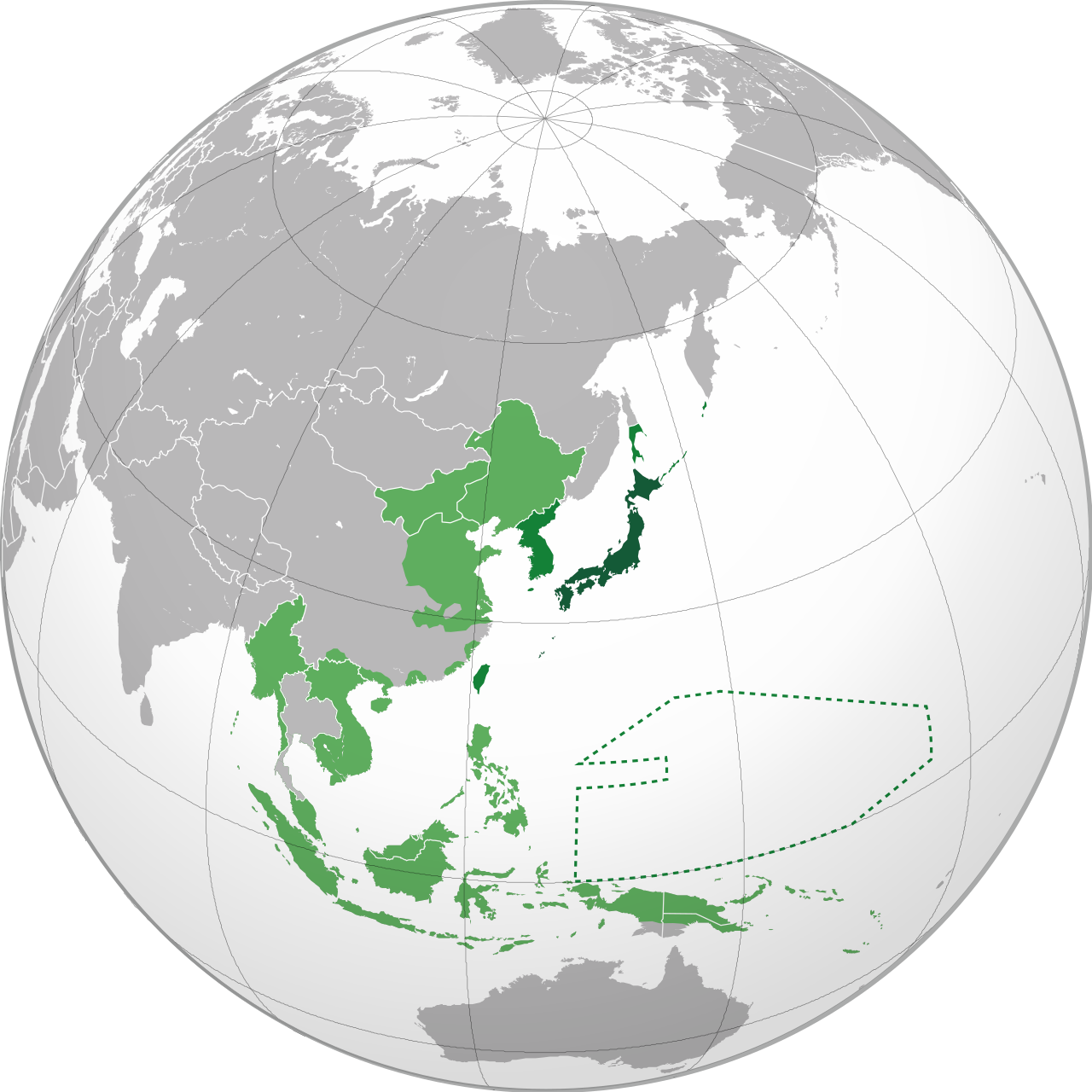 1942年の大東亜共栄圏  1938年6月、中国・安慶に上陸する準備をする日本海軍 200年以上にわたり、日本は相対的に世界から孤立した時代に封建社会を維持していた。しかし、1850年代にアメリカ合衆国や他の列強諸国からの軍事的 圧力により、日本は世界市場に開放せざるを得なくなり、結果的に日本の孤立は終わった。社会経済的不安定による紛争と政治革命の時代が続き、1868年の 明治維新で日本の天皇のもとに政治権力が再び統合されて終結した。これにより、日本人の自給自足への欲求も後押しとなって、急速な工業化の時代が始まっ た。1900年代初頭には、日本はロシアを打ち負かして、ヨーロッパの既成大国と肩を並べる海軍大国となっていた。 人口増加と工業化が進む一方で、日本は重要な天然資源をほとんど持っていなかった。そのため、これらの欠点を補う手段として、帝国主義と拡張主義に傾倒し、国是「富国強兵」(国家を富ませ、軍隊を強くする)を採用した。 そして日本はあらゆる機会を逃すまいとしていた。1869年には蝦夷共和国の反乱軍の敗北に乗じて、北海道を日本に完全に組み入れた。何世紀もの間、日本 は琉球諸島を自国の領土のひとつとみなしていた。1871年には牡丹社事件が起こった。台湾原住民が遭難した琉球人船員54名を殺害した。当時、琉球諸島 は清国と日本の両国が領有権を主張しており、日本人はこの事件を自国民に対する攻撃と解釈した。そして、1872年には日本琉球藩が宣言され、1874年 には報復的な台湾侵攻が実施され、成功を収めた。この遠征の成功は日本人を大胆にし、1867年の台湾出兵ではアメリカ人さえ台湾人を打ち負かすことはで きなかった。当時、このことを深く考える者はほとんどいなかったが、これが日本による膨張主義の第一歩となった。日本は1874年の残りの期間、台湾を占 領し、中国の圧力により撤退したが、1879年にはついに琉球諸島を併合した。1875年、清国は台湾人を制圧するために300人の部隊を派遣したが、日 本軍とは異なり、清国軍は待ち伏せ攻撃を受け、250人が死亡した。この遠征の失敗により、清国が台湾に効果的な支配力を及ぼせていないことが再び明らか になり、日本が台湾を併合するもう一つの動機となった。最終的に、1894年の日清戦争の戦利品には台湾も含まれていた。[112] 1875年、日本は朝鮮に対して初めて軍事行動を起こした。朝鮮は、日本が何世紀にもわたって欲していた領土のひとつであった。江華島事件により、朝鮮は 国際貿易に門戸を開くこととなった。朝鮮は1910年に併合された。1905年の日露戦争の勝利の結果、日本はロシアから樺太の一部を獲得した。 まさに、ロシア帝国に対する勝利は世界を震撼させた。アジアの国家がヨーロッパの列強を打ち負かしたのは初めてのことであり[要出典]、日本では偉業とし て受け止められた。日本のロシアに対する勝利は、西欧列強との戦いにおけるアジア諸国の脱植民地化の先例となった。第一次世界大戦中、日本は中国の山東省 にあるドイツの租借地、およびマリアナ諸島、カロリン諸島、マーシャル諸島を占領し、国際連盟の委任統治領とした。当初、日本は第一次世界大戦の戦勝国で ある連合国と良好な関係にあったが、条約の報酬に対する相違や不満により、関係は冷え込んだ。例えば、アメリカの圧力により山東省を返還せざるを得なく なった。1930年代には、経済恐慌、資源の逼迫、連合国に対する不信感の高まりにより、日本は軍国主義的な強硬路線に傾倒するようになった。この10年 間で、日本はドイツおよびイタリアと接近し、枢軸同盟を結成した。1931年、日本は満州を中国から奪取した。この動きに対して国際社会は非難したが、連 合国に対する日本の強い懐疑論により、日本はこれを続行した。  1937年7月に北京の承徳門に進軍する日本軍。 1937年の日中戦争中、日本の軍隊は中国中央部を侵略した。また、1938年から1939年にかけて、日本はソビエト連邦とモンゴルの領土を占領しよう としたが、深刻な敗北を喫した(ハサン湖の戦い、ノモンハン事件を参照)。この頃には連合国との関係は最悪の状態にあり、日本から天然資源を奪うための国 際的な不買運動が実施されていた。 それらへのアクセスを確保するための軍事行動が必要と判断され、日本は真珠湾を攻撃し、米国を第二次世界大戦に引きずり込んだ。 航空母艦や水陸両用作戦、海戦における近代的な理論を駆使し、日本は歴史上最も急速な海洋進出を達成した。1942年までに日本は東アジアと太平洋の大部 分を征服し、中国の東部、香港、タイ、ベトナム、カンボジア、ビルマ(ミャンマー)、マレーシア、フィリピン、インドネシア、ニューギニアの一部、太平洋 の多くの島々を占領した。日本の後発工業化の成功とロシア帝国に対する勝利が、アジア太平洋地域の低開発国にとって模範と見なされていたように、日本人は これを利用し、征服した人々に対して、ヨーロッパに対抗する「大東亜共栄圏」を共に創り上げるという目標を推進した。この計画は、日本が征服中に現地住民 から支持を得るのに役立った[要出典]。特にインドネシアで。[要出典]しかし、アメリカは軍事力と産業基盤がはるかに強力であり、日本を打ち負かしてそ の征服を剥奪し、入植者を日本に送り返した。 オランダ 詳細は「オランダ領インドネシア」を参照 オランダ帝国主義の最も顕著な例はインドネシアに関するものである。 オスマン帝国  アレッポを行進するオスマン軍 詳細は「オスマン帝国」および「オスマン帝国の領土変遷」を参照 オスマン帝国は1299年から1922年まで続いた帝国国家である。1453年、メフメト2世はコンスタンティノープルを占領し、首都とした。16世紀か ら17世紀にかけて、特にスレイマン大帝の治世下で絶頂期を迎えたオスマン帝国は、多民族・多言語国家として強大な力を持ち、東南ヨーロッパ、西アジア、 コーカサス、北アフリカ、アフリカの角の大部分を侵略し植民地化した。 繰り返される侵略とスラブ人に対する残虐な扱いは、迫害を逃れるためにセルビア人が起こした大移動を引き起こした。17世紀初頭には、オスマン帝国は32 の州と多数の属国から構成されていた。これらのうちのいくつかは後に帝国に吸収されたが、他の国々には数世紀の間にさまざまな種類の自治が認められた。 ヨーロッパ諸国との長期にわたる軍事的敗北の後、オスマン帝国は徐々に衰退し、ヨーロッパとアフリカの領土の大部分を失った。  1683年のオスマン帝国。濃い緑色は主要領土、薄い緑色は属領または自治領。 1810年にはエジプトは事実上独立した。1821年から1829年にかけてのギリシャ独立戦争では、ギリシャ人はロシア、イギリス、フランスの支援を受 けた。1815年から1914年にかけて、オスマン帝国は列強の激しい対立の状況下でのみ存続することができ、特に1853年から1856年のクリミア戦 争では、イギリスが主な支援者となり、ロシアと戦った。露土戦争(1877年~1878年)でのオスマン帝国の敗北後、ブルガリア、セルビア、モンテネグ ロが独立し、イギリスがキプロスを植民地支配下に置いた。一方、ボスニア・ヘルツェゴビナは1908年にオーストリア=ハンガリー帝国に占領され併合され た。 帝国は第一次世界大戦でドイツと同盟を組み、失地回復の野望を抱いていたが、決定的な敗北の余波で崩壊した。トルコ独立戦争では、ソビエト連邦の支援を受 けたケマル主義の民族運動が勝利を収め、1923年と1924年にローザンヌ条約に調印し批准した。トルコ共和国が樹立された。 ポルトガル 詳細は「第二次ポルトガル帝国」を参照  世界の各地域で、歴史のある時点でポルトガル帝国の一部であった地域 ロシア 詳細は「ロシア帝国主義」を参照 詳細は「ロシアの領土変遷」、「ソビエト帝国」、および「ルースカヤ・ミール」を参照 18世紀までに、ロシア帝国は太平洋まで支配を拡大し、清帝国および大日本帝国と平和的に国境を接するようになった。これは、その東、西、南の地域に対す る多数の軍事侵攻によって実現した。1792年のポーランド・ロシア戦争は、ポーランド・リトアニア共和国のポーランド貴族が1791年5月3日の憲法を 制定した後に起こった。この戦争の結果、1918年まで東ポーランドは帝政ロシアの植民地として征服された。南部の戦役は一連の露土戦争を伴い、1796 年のペルシャ遠征で始まり、結果としてグルジアを保護領として獲得した。1800年から1864年の間、帝政軍はコーカサス征服、ムリド戦争、露土戦争で 南部に侵攻した。この最後の紛争により、カフカス地方の民族であるチェルケス人は、彼らの土地から民族浄化されることとなった。シベリア・ハン国の征服は 16世紀から17世紀にかけて行われ、ダウール人、コリャーク人、イテルメン人、マンシ人、チュクチ人など、ロシア人による先住民族の虐殺が引き起こされ た。ロシアによる中央および東ヨーロッパとシベリアへの植民地化と先住民族への対応は、ヨーロッパによるアメリカ大陸への植民地化と比較され、アメリカ大 陸の先住民族と同様にシベリアの先住民族にも同様の悪影響を与えた。シベリアの先住民族の絶滅は完全なもので、現在ではわずか18万人の比較的小規模な人 口しか存在しないと言われている。ロシア帝国は、この時代にカザーク軍団を搾取し弾圧し、18世紀後半には彼らを特別な軍事的地位であるソスロヴィエに変 えた。その後、カザークはロシア帝国による他の部族に対するキャンペーンで利用された。[117]  1533年から1894年にかけてのユーラシアにおけるロシアの拡大 ロシアによるウクライナの獲得は、1654年のペレイアスラフ協定から始まった。1783年のグルジアのロシアへの併合は、ゲオルギーエフスク条約によって決定された。  ワルシャワ条約機構の諸国、すなわちソビエト帝国主義の主要なブロック ボルシェビキ指導者たちは、1921年までに、国際主義的なイデオロギーを掲げつつも、事実上、その帝国とほぼ同じ範囲の政治体制を再確立した。特にレー ニンは、その新たな領土内の少数民族に対して、限定的な自己決定権を主張した。[118] 1923年から始まった「現地化」政策[korenizatsiya]は、非ロシア人が社会主義の枠組みの中で自国の文化を発展させることを支援すること を目的としていた。公式に撤回されることはなかったが、1932年以降は実施されなくなった[要出典]。第二次世界大戦後、ソビエト連邦は、東ヨーロッパ で自国の軍が占領した地域において、1919年から1920年にかけて旧ロシア帝国で導入した社会主義体制を模した社会主義政権を樹立した[119]。ソ ビエト連邦、および後に中華人民共和国は、 自国の利益を促進するために外国や植民地における革命運動や共産主義運動を支援したが、常に成功したわけではなかった。[120] ソビエト連邦は1926年から1928年にかけて、統一中国政府の樹立において国民党に多大な支援を行った(北伐を参照)。その後、ソ連との関係は悪化し たが、1937年から1941年にかけての日本の侵略に対して、中国に軍事支援を提供したのは世界で唯一ソ連だけだった(中ソ不可侵条約を参照)。 1946年から1949年にかけての内戦における中国共産党の勝利は、ソ連の多大な支援によるものであった(中国内戦を参照)。  ロシア大統領ウラジーミル・プーチンは、かつてのロシア領土を取り戻すために、自らをピョートル大帝になぞらえた。[121] トロツキーやその他の人々は、革命は世界革命の一部としてロシアでしか成功しないと考えていた。レーニンはこの問題について広範に論じ、帝国主義は資本主 義の最高段階であると宣言した。しかし、レーニンの死後、ヨシフ・スターリンはソビエト連邦のために「一国社会主義」を確立し、その後のスターリニスト国 家のモデルを作り、初期のインターナショナリスト的要素を一掃した。初期の革命のインターナショナリスト的傾向は、冷戦時代にアメリカと競合する従属国家 の枠組みの中で復活するまで、放棄されることとなった。スターリンの死後の1950年代後半、新たな政治的指導者となったニキータ・フルシチョフは、反帝 国主義のプロパガンダを新たな波として開始し、米ソ関係に圧力をかけた。1960年の国連会議での演説で、彼は帝国主義との戦いを継続すると宣言し、間も なく各国の人民が団結し、帝国主義の指導者を打倒すると述べた。ソビエト連邦は自らを反帝国主義国家と宣言したが、歴史的な帝国に共通する特徴を示してい たと批判する意見もある。[122][123][124] 一部の学者は、ソビエト連邦は多国籍帝国と国民国家の両方に共通する要素を含むハイブリッドな存在であったと主張している。また、ソ連は他の帝国主義国と 同様に植民地主義を実践し、ロシアの古い伝統である拡張と支配を続けていたという主張もある。[124] かつて毛沢東は、ソ連は社会主義の建前を維持しながら帝国主義国となったと主張した。さらに、帝国主義の思想は政府の上層部で広く浸透していた。ヨシッ プ・ブロズ・チトーとミロバン・ジラスは、スターリン主義のソビエト連邦の外交政策、例えば東ヨーロッパの占領と経済的搾取、およびユーゴスラビアに対す る攻撃的で敵対的な政策をソビエト帝国主義と呼んだ。 ソ連政権をロシア帝国主義と植民地主義の新たなバージョンであるとみなした。[127] 1956年のハンガリー動乱とソ連・アフガン戦争がその例として挙げられている。[128][129][130] 現代のロシア帝国主義は、ロシアが占領している領土の一部で見られる。[131] アメリカ合衆国 詳細は「アメリカ帝国主義」を参照  1898年のハワイ共和国併合時の式典  スペインに宣戦布告する好戦的なアンクル・サムの風刺画、1898年頃 かつての植民地から成る初期のアメリカ合衆国は、モンロー主義などの政策を通じて、少なくとも自国の明白な使命とは異なる形で帝国主義に反対の意を示し た。しかし、アメリカ合衆国は1812年の戦争でカナダを占領しようと試みたが失敗した。アメリカ合衆国は、米墨戦争においてメキシコから非常に重要な領 土の譲歩を得た。19世紀後半から20世紀初頭にかけて、セオドア・ルーズベルトの中米への介入主義やウッドロウ・ウィルソンの「民主主義のために世界を 安全にする」という使命などの政策により、すべてが変わった。それらはしばしば軍事力によって裏付けられたが、より頻繁に裏から影響を与えた。これは歴史 的な帝国の覇権と帝国の一般的な概念と一致している。[133][134] 1898年、帝国主義に反対するアメリカ人たちは、アメリカによるフィリピンとキューバの併合に反対するために反帝国主義同盟を結成した。その1年後、 フィリピンで戦争が勃発し、米国の企業、労働、政府の指導者たちは、フィリピンにおけるアメリカの占領を非難し、多くのフィリピン人の死を引き起こしたと して非難した。[135] アメリカの外交政策は、極左の代弁者となった元アメリカ軍将軍スミードリー・バトラーによって「騒動」として非難された。[136] 第二次世界大戦の開始時、フランクリン・D・ルーズベルト大統領は、特にインドにおけるヨーロッパの植民地主義に反対していた。英国のウィンストン・ チャーチルが戦争の勝利を最優先事項とするよう要求したため、ルーズベルトは方針を転換した。ルーズベルトは、国連が脱植民地化の問題を取り上げることを 期待していた。 さまざまな人種間の内部紛争を帝国主義や植民地主義の一形態とみなす見方もある。この内部形態は、政治的・財政的覇権という形での非公式な米国帝国主義と は明確に区別される。[138] また、米国による海外での「植民地」形成とも異なる。[138] 西部開拓の過程で先住民を扱うことで、米国は対外帝国主義を試みる以前に帝国主義国家の形を取っていた。この帝国の内部形態は「内部植民地主義」と呼ばれ ている。[139] アフリカ奴隷貿易への参加と、それに続く1200万人から1500万人のアフリカ人に対する扱いは、アメリカ合衆国の「内部植民地主義」のより近代的な延 長であると見る者もいる。[140] しかし、この内部植民地主義は、外部植民地主義と同様に抵抗に直面したが、 アメリカ合衆国が先住民とアフリカ系アメリカ人の両方に対してほぼ完全な支配力を誇示できたため、反植民地主義の存在ははるかに目立たなかった。 [141] 2003年4月16日の講演で、エドワード・サイードは、アメリカ合衆国の近代帝国主義を、現代の東洋に対する攻撃的な手段として次のように表現した。 「彼らの後進的な生活様式、民主主義の欠如、女性の権利の侵害により、 西洋世界は、他者を改宗させるこの過程において、啓蒙主義や民主主義が万人が同意する概念ではないことを忘れている」と述べた。[142] スペイン  かつてスペイン帝国の領土であった世界の地域 詳細は「スペイン帝国」を参照 植民地時代のスペイン帝国主義は、スペイン帝国の興亡と一致しており、一般的に1402年のカナリア諸島征服をもって始まったと認識されている。大航海時 代における探検航海の成功を受けて、スペインは大西洋を越えた大規模な遠征作戦を遂行できる強力な海軍を整備するために、相当な財政的・軍事的資源を投入 した。これにより、北米、南米、およびカリブ海地域の大半に帝国の確固たる存在を確立し、強化することを目指した。スペインによる大西洋横断探検航海の支 援と後援に伴い、コンキスタドールが派遣され、領土や植民地の獲得と開発を通じてスペインの帝国の境界がさらに拡大した。[143] カリブ海地域における帝国主義  カリブ海地域におけるスペインの植民地と領土(1490年頃~1660年頃) 15世紀から19世紀にかけてのヨーロッパの競合する帝国主義勢力の植民地主義的活動と歩調を合わせるように、スペインもまた地政学上の権力を拡大するこ とに熱中した。カリブ海地域はスペインの帝国主義を拡大する上で重要な地理的中心地として機能した。スペインがアステカ帝国とインカ帝国の征服で勝利を収 めるために戦略的に優先したのと同様に、スペインはカリブ海地域における帝国の足跡を拡大することに同等の戦略的優先度を置いた。 スペインのヨーロッパのライバル国(イギリス、フランス、オランダなど)が植民地時代に抱いていた植民地主義と帝国主義に関する一般的なイデオロギー的見 解と同様に、スペインは帝国の地政学的境界を拡大し、カリブ海地域の海上貿易ルートの防衛を確保する手段として植民地主義を利用した。 帝国主義のライバル国と同じ地理的活動領域で植民地主義を活用しながらも、スペインは独自の帝国主義的目標を維持し、帝国主義的計画を支援する独自の植民 地主義の形態を導入した。スペインは貴金属(主に金と銀)の獲得、採掘、輸出に戦略的な重点を置いていた。2つ目の目的は、鉱物資源が豊富で戦略的に有利 な場所に住む征服した先住民の改宗であった。これらの先住民の代表的な例としては、プエルトリコやキューバの一部に住むタイノ族が挙げられる。スペイン領 および植民地では、強制労働や奴隷制度が広く制度化され、当初は採掘活動や半貴金属の調達に関連する労働に重点が置かれていた。カリブ海地域内の植民地で 16世紀から17世紀にかけてエンコミエンダ制度が確立されたことは、帝国の優先事項が徐々に変化し、農産物の大規模生産と輸出に重点が置かれるように なったことを反映している。 学術的な議論と論争 カリブ海地域におけるスペインの帝国主義への関与の範囲と規模については、歴史家たちの間で学術的な議論が続いている。 論争の根本的な原因は、帝国主義と植民地主義の理論的概念を不用意に混同していることにある。 さらに、歴史家、人類学者、哲学者、政治学者が提示するこれらの用語の定義と解釈には、大きな違いがある。 歴史家の間では、帝国主義を18世紀から19世紀にかけて、特にイギリスで生まれた概念理論として捉える見方が有力である。この理論的観点によれば、スペ インによるカリブ海での活動は、卓越した、イデオロギー主導型の帝国主義の一形態ではない。むしろ、これらの活動は、より正確には植民地主義の一形態と分 類される。 歴史家たちの意見がさらに分かれるのは、台頭しつつある学派が提唱する帝国主義に関する理論的視点が様々であるためである。注目すべき例としては、ジョ ン・ダウニングやアナベル・スレーベルニー=モダマディといった支持者たちが「...より強力な国による他国の征服と支配」と定義する文化的帝国主義があ る。[144] 文化的帝国主義は、経済的搾取や軍事力行使を越えたプロセスの次元を意味する。さらに、植民地主義は「植民地の政府が外国人によって直接運営される帝国主 義の形態」と理解されている。 歴史家たちの帝国主義に対する見解は分かれており、学術的な見解の一致は見られないものの、植民地時代におけるスペインのカリブ海地域への拡大という文脈 においては、帝国主義は植民地主義という制度を通じて永続する包括的なイデオロギー的課題として解釈することができる。この文脈において、植民地主義は特 定の帝国主義的目標を達成するための手段として機能する。 スウェーデン 詳細は「スウェーデンの海外植民地」を参照 |
| Historiography of the British Empire International relations, 1648–1814 International relations (1814–1919) International relations (1919–1939) List of empires List of largest empires Mercantilism Might Makes Right Political history of the world Postcolonialism Right of conquest Scramble for Africa, in the late 19th century Analysis of Western European colonialism and colonization Fourteen Points esp. V and XII in 1918 Imperialism, the Highest Stage of Capitalism 1917 book by Lenin Super-imperialism Ultra-imperialism |
大英帝国の歴史学 国際関係、1648年~1814年 国際関係(1814年~1919年 国際関係(1919年~1939年 帝国の一覧 最大の帝国の一覧 重商主義 力は正義 世界の政治史 ポストコロニアリズム 征服の権利 19世紀後半のアフリカの争奪戦 西ヨーロッパの植民地主義と植民地化の分析 1918年の「14か条の要求」の第5項と第12項 帝国主義、資本主義の最終段階 1917年のレーニンの著書 スーパー帝国主義 ウルトラ帝国主義 |
| https://en.wikipedia.org/wiki/Imperialism |
|
| Ultra-imperialism (occasionally
hyperimperialism and formerly super-imperialism) is a potential,
comparatively peaceful phase of capitalism, meaning after or beyond
imperialism. It was described mainly by Karl Kautsky. Post-imperialism
is sometimes used as a synonym of ultra-imperialism, although it can
have distinct meanings. Origin of the term The suggestion of a possible ultra-imperialism is normally attributed to Karl Kautsky, the leading theoretician of the Social Democratic Party of Germany (SPD) in the era of Imperial Germany. Kautsky coined the term in 1914, but he had speculated on the issue several times in 1912 already. He postulated that in the field of international relations a "stage [approaches], in which the competition among states will be disabled by their cartel relationship".[1] Thus, Kautsky's ultra-imperialism concept was shaped by the idea of cartels made up by states for the purpose of international policy. However, the basic idea of a possible pacification of imperialism did not really originate from Kautsky. The British left-liberal John Atkinson Hobson had written in 1902 in a similar context about a potential inter-imperialism which could be established by a combination of great powers (combination or combine then being used to designate cartels).[2] In 1907, Karl Liebknecht stated in his brochure Militarismus und Antimilitarismus that "a trustification of all actual and potential colonies among the colonial powers, so to speak, […] a disabling of the colonial rivalry among the states [could take place in the future], as it occurred to some extent for the private competition among capitalist entrepreneurs in the cartels and trusts".[3] On the eve of World War I, these peace-loving social-democrats and liberals in Europe hoped that the great powers—beginning with the British Empire and the German Reich—would unite into a states' cartel or a combination of states giving the rivals organization and reconciliation.[4] Karl Kautsky's statements in 1914 In 1914, Kautsky published an article on imperialism which subsequently was translated into English and published in the United States. In these, he argued there could be a way out of direful wars among the imperialist powers, a solution now named ultra-imperialism or super-imperialism.[5] Kautsky elucidated this thought in the September 1914 issue of Die Neue Zeit. He described the current phase of capitalism as imperialism. In Marxist theory, imperialism consists of capitalist states superexploiting labour in agrarian regions in order to increase both the imperialist nation's productivity and their market. However, imperialism also required capitalist states to introduce protectionist measures and to defend their empires militarily. He believed that this was the ultimate cause of World War I.[6] Kautsky noted that before the war while industrial accumulation had continued, exports had dropped as a result of a tendency of industry to expand out of proportion to agriculture. He pointed out that growing nationalism in the more industrially advanced colonies would necessitate a continuation of the arms race after the war and that should this occur, economic stagnation would worsen.[6] In Kautsky's view, the only one way in which capitalists would be able to maintain the basic system while avoiding this stagnation would be for the wealthiest nations to form a cartel in the same manner as which banks had co-operated, agreeing to limit their competition and renounce their arms race in order to maintain their export markets and their systems of superexploitation.[6] In doing so, he postulated that war and militarism were not essential features of capitalism and that a peaceful capitalism was possible.[6] Vladimir Lenin's criticism Vladimir Lenin disagreed with Kautsky's approach. In an introduction to Nikolai Bukharin's Imperialism and World Economy written in 1916, he conceded that "in the abstract one can think of such a phase. In practice, however, he who denies the sharp tasks of to-day in the name of dreams about soft tasks of the future becomes an opportunist".[7] Lenin developed Bukharin's theories of imperialism and his own arguments formed the core of his work Imperialism: The Highest Stage of Capitalism. He wrote that Kautsky's theory supposed "the rule of finance capital lessens the unevenness and contradictions inherent in the world economy, whereas in reality it increases them". He gives examples of disparities in the international economy and discusses how they would develop even under a system of ultra-imperialism. He asks under the prevailing system "what means other than war could there be under capitalism to overcome the disparity between the development of productive forces and the accumulation of capital on the one side, and the division of colonies and spheres of influence for finance capital on the other?"[8] Recent positions on the idea of ultraimperialism Some Marxists have pointed out similarities between the co-operation between the capitalist states during the Cold War and ultra-imperialism.[9][10] Martin Thomas of Trotskyist Workers Liberty points out that "since the collapse of the Stalinist bloc in 1989-91, that 'ultra-imperialism' has extended to cover almost the whole globe". Thomas goes on to say that it is not simply “a sharply polarised world of industrial states on one side, agrarian states on the other, with the industrial states joining together to keep the agrarian states un-industrial by force”. Rather, “it is a very unequal but multifarious system, with political independence for the ex-colonies, rapidly-permuting new international divisions of labour, and many poorer states exporting mostly manufactured goods".[11] Opponents of the theory of ultra-imperialism argue that whatever similar forms may have existed during the Cold War, since its end inter-capitalist competition has tended to increase[12][13] and that the nature of capitalism makes it impossible for capitalists to make conscious decisions to avoid behaviour if in the short term it proves beneficial.[9] Related theories State cartel theory, a new concept in the field of international relations theory, uses the basic conception of Kautsky's ultra-imperialism, but it is not a Marxist theory. See also Military–industrial complex New Imperialism Permanent war economy Super-imperialism World-systems theory |
ウルトラ帝国主義(時に超*帝国主義、かつてはスーパー帝国主義)は、
資本主義の潜在的な、比較的平和的な段階であり、帝国主義の後に、あるいはそれを超えた段階を意味する。主にカール・カウツキーによって説明された。ポス
ト帝国主義は、ウルトラ帝国主義と同義語として用いられることもあるが、明確に異なる意味を持つこともある。 用語の起源 ウルトラ帝国主義の可能性を示唆したのは、通常、ドイツ帝国時代のドイツ社会民主党(SPD)の主要な理論家であったカール・カウツキーであるとされてい る。カウツキーは1914年にこの用語を造語したが、すでに1912年にはこの問題について何度か推測していた。彼は、国際関係の分野において、「国家間 の競争がカルテル関係によって無効化される段階」が訪れると仮定した。[1] このように、カウツキーのウルトラ帝国主義の概念は、国際政策を目的とした国家間のカルテルという考えによって形作られた。 しかし、帝国主義の平和化という基本的な考えは、実際にはカウツキーによるものではなかった。イギリスの左派自由主義者ジョン・アトキンソン・ホブソン は、1902年に同様の文脈で、列強の結合によって成立する可能性のある帝国主義間の潜在的な関係について記している(結合または結合企業という言葉は、 当時、カルテルを指すために使用されていた)。[2] 1907年には、カール・リープクネヒトがパンフレット『軍国主義と反軍国主義』の中で、「植民地帝国間の、すべての現実の植民地および潜在的な植民地 を、いわば、 …資本家たちのカルテルやトラストにおける私的な競争において、ある程度起こったように、国家間の植民地競争を無効化する[ことが将来起こり得る]」と述 べた。[3] 第1次世界大戦前夜、ヨーロッパの平和を愛する社会民主主義者や自由主義者たちは、大英帝国やドイツ帝国をはじめとする列強諸国が国家カルテルや国家連合 を結成し、ライバル関係にある諸国に組織と和解を与えることを期待していた。[4] 1914年のカール・カウツキーの声明 1914年、カウツキーは帝国主義に関する論文を発表し、その後、その論文は英語に翻訳され、米国で出版された。その論文の中で、彼は帝国主義諸国間の悲 惨な戦争から抜け出す方法があるはずだと主張し、その解決策は現在ではウルトラ帝国主義またはウルトラ帝国主義と呼ばれている。 カウツキーは、1914年9月の『Die Neue Zeit』誌でこの考えを明らかにした。彼は、資本主義の現在の局面を帝国主義と表現した。マルクス主義理論では、帝国主義とは、帝国主義国家が自国の生 産性と市場を拡大するために、農村地域の労働力を過剰に搾取することである。しかし、帝国主義はまた、資本主義国家が保護貿易政策を導入し、軍事的に自国 の帝国を防衛することをも要求した。彼はこれが第一次世界大戦の究極的な原因であると信じていた。[6] カウツキーは、戦争前、産業の蓄積が継続する一方で、農業に比べて産業が不均衡に拡大する傾向により輸出が減少したことを指摘した。彼は、工業先進国の植 民地におけるナショナリズムの高まりが、戦争後の軍拡競争の継続を必要とし、そうなれば経済停滞が悪化すると指摘した。[6] カウツキーの見解では、資本家たちがこの停滞を回避しながら基本システムを維持できる唯一の方法は、最も裕福な国々が銀行が協力したのと同じ方法でカルテ ルを結成し、 輸出市場と超搾取体制を維持するために、競争を制限し軍拡競争を放棄することに合意する。そうすることで、戦争と軍国主義は資本主義の本質的な特徴ではな く、平和的な資本主義は可能であると彼は仮定した。 ウラジーミル・レーニンの批判 ウラジーミル・レーニンはカウツキーのアプローチに反対であった。1916年に書かれたニコライ・ブハーリンの『帝国主義と世界経済』の序文で、レーニン は「抽象的にはそのような局面を考えることはできる。しかし実際には、将来のやさしい課題についての夢の名のもとに、今日の厳しい課題を否定する者は日和 見主義者となる」と認めた。 レーニンはブハーリンの帝国主義理論を発展させ、自身の主張を著書『帝国主義:資本主義の最高段階』の中心に据えた。彼はカウツキーの理論は「金融資本主 義の支配が世界経済に内在する不均衡や矛盾を軽減する」と想定しているが、実際には「それらを増大させる」と書いた。彼は国際経済における格差の例を挙 げ、ウルトラ帝国主義体制下でもそれらがどのように発展するかを論じている。彼は現行の体制下で、「資本主義下において、生産力の進歩と資本の蓄積の一方 と、金融資本による植民地分割と勢力圏の獲得の他方との間の格差を克服する手段として、戦争以外の手段があるだろうか」と問いかけている。[8] ウルトラ帝国主義の概念に関する最近の立場 一部のマルクス主義者は、冷戦中の資本主義国家間の協力とウルトラ帝国主義との類似性を指摘している。[9][10] トロツキストのマーティン・トーマスは、「1989年から1991年のスターリン主義ブロックの崩壊以来、その『ウルトラ帝国主義』はほぼ全世界に拡大し た」と指摘している。トーマスはさらに、それは「工業国と農業国の両極化が顕著な世界であり、工業国が力を合わせて農業国を工業化させないようにしてい る」という単純なものではないと述べている。むしろ、「非常に不平等ではあるが、多種多様なシステムであり、旧植民地には政治的な独立が認められ、国際的 な労働の分業は急速に変化し、多くの貧しい国々は主に製造品を輸出している」と述べている。[11] ウルトラ帝国主義理論の反対派は、冷戦時代には類似した形態が存在していたとしても、冷戦終結後は資本主義間の競争が激化する傾向にある[12][13] こと、また資本主義の性質上、短期的に利益をもたらす行動を資本家が意識的に避けることは不可能である[9]ことを主張している。 関連理論 国家カルテル理論は、国際関係論の分野における新しい概念であり、カウツキーのウルトラ帝国主義の基本概念を用いているが、マルクス主義理論ではない。 関連項目 軍産複合体 新帝国主義 恒久戦争経済 ウルトラ帝国主義 世界システム理論 |

Illustration
representing Cecil Rhodes' plan of building railways across Africa,
connecting Cape Town and Cairo, aimed at extending the British Empire.
リ ンク
文 献
そ の他の情報
Copyleft,
CC, Mitzub'ixi Quq Chi'j, 1996-2099